#I only give those based on context
Explore tagged Tumblr posts
Note
What do you rank eye bats? (The species)
...Like. In general?
They're aggressively invasive in this dimension, so I don't like them.
#If you're asking for a cuteness ranking#I only give those based on context#Like. I don't like invasive species but I don't want them to be abused.#anon#ask#So I'll still give a picture of a healthy eyebat in safe captivity where it won't affect the environment a “Cute” ranking.#queueud
24 notes
·
View notes
Text
so i googled my current favourite play that i'm absolutely obsessed with and ended up on the english wikipedia site bc my browser is set to english and. it's so bad. the fucking plot overview leaves out basically everything that happens ever except for the end result. several key figures aren't even mentioned. "this guy dies for freedom" well, yes, but actually no, plus you're implying his sacrifice is actually worth it. that's not true. in some other section a dude is mentioned who claims this play is basically star wars. that someone familiar with the play but not star wars could look at a star wars poster and tell you which characters are narratively similar/equal to characters of the play. i am baffled. i have never, not once in my life, ever seen someone be so wrong. dude must have read an entirely different play. i'm tempted to dig up the english version and read it just to see how fucking wrong he is. he is *so* incredibly wrong. jesus fuck. how could you possibly say that
#like??? lets assume the protagonists are sorta equivalent#okay?? daddy issues ig? one of them is filled with hope and the other with despair and obsessive love based in stubbornness#one of them refuses to give up to save many and the other has given up many to pursue his hopeless love interest#(until the end at least. hes so fucked up and stupid <3)#and okay that unreachable love interest is shared BUT????#i cant even begin to describe how fucking different those situations are#also bc without an in depth explanation the play situation sounds so much worse than it is#then the protags bestie#in star wars we have han whos cool but he didnt mean to be there for the longest time. a smuggler etc#in the play we have this super righteous guy whom Nobody speaks ill of whos literally our protags only moral compass#well not the only. well. actually. currently yes he is thats accurate#i mean obviously theres differences already bc one is basically a space fairy tale and the others a tragedy but#the character constellations are NOT even remotely similar!!!#the motives are VERY different!! the way the characters think and feel and act are VERY different!!!#just bc theres a protag who has a bad father a best friend and a love interest he shouldn't be into does NOT mean ones based on the other#and even if dude refers to a different star wars movie THE SAME STILL APPLIES#ITS SO INCREDIBLY WRONG LITERALLY I CANNOT GET OVER THIS#not that the wikipedia plot overview is much better#yes youre TECHNICALLY right but YOU ARE IGNORING THE PLOT#YES THAT HAPPENS BUT ONLY AT THE VERY END BC OF THE PLOT THAT YOU DIDNT MENTION#YOURE IGNORING CHARACTERS INTEGRAL TO THE PLOT#(the women ofc. THEYRE IMPORTANT. yes they still play their restrictive af roles given the age of the play#BUT THEY STILL MATTER AND INFLUENCE THINGS???? let my girl fuck up so bad. let my other girl try so hard to do her best even as shes#powerless within the narrative and her fellow characters whims and moods and ploys)#and again! saying my guy dies for freedom is such a gross oversimplification#that scene is so intense and based in such complicated actions and intentions and feelings youre doing it a disservice#you can simplify it like that but ONLY IF YOU PROVIDE CONTEXT PLEASE#YOU CANT SAY 'THIS IS THE PLOT' AND THEN IGNORE THE ENTIRE PLOT#PLEASE THERE WASN'T A SINGLE MENTION OF LETTERS EVEN WTF ARE YOU DOING#WHOEVER WROTE THAT WIKIPEDIA ARTICLE DROP UR URL I JUST WANNA TALK
4 notes
·
View notes
Text
tips for getting people to like your ocs
*disclaimer: this is based on what’s worked for me, aka an artist that likes to make comics/storyboards. so this advice is directed at people who do that
you can do things like this:

Which is fun! Character sheets like this are great, especially for personal reference! But frankly, I don’t think most people engage with this (at least I personally don’t). You could have the coolest character in the world, but it will be harder for most people to feel invested when they’re presented so neutrally like this.
My main piece of advice is: get better at writing.
That might sound harsh when said like that, but let me explain what I mean! (Not trying to imply you’re bad at writing either!)
What I tend to do is just throw characters into situations with as little handholding as I can. Give enough context that readers can follow along, but don’t feel like they’re being explained to.
what can you learn about the characters through their designs alone? (age, personality, economic status, occupation, etc)
what can you learn about the characters’ relationship though their interactions alone? (are they close? familial? romantic? is there hostility? are they tense/relaxed?)
what are the characters currently doing? what were they doing previously (how long have they been talking)? what are they going to do next? can you convey this without dialogue?
how do they feel about what they are doing? are they content? focused? over/understimulated? would they rather be doing something else?
where are they? does it matter? would establishing a setting in at least one panel clarify the scene? is there anything in the enviroment that could tell some of the story?
what time of day is it? what time of year is it? what is the weather like?
Now, with all this in mind, I'm going to give you another example. I'm going to use completely brand new characters for the sake of the experiment, so you won't have any bias (aka I can’t use Protagonist from above, since you already know all about him).


Did this get more of an emotional response from you than the first example? Why do you think so? Who are these characters? How do they know each other? What else can you infer about them? What happened? Who is "she"?
Now, you don't have to actually answer all those questions. But think about them! You can tell people a whole lot about your characters without ever showing them a list of their likes and dislikes.
Obviously, comics aren't the only way to get people invested in your original characters! But regardless, easily digestible formats will grab people's attention faster than huge blocks of text, and comics are a lot less work than doing wholeass storyboards.
Now go and share your ocs with the world!!!
#edit: I rephrased some things in this post for better clarity!#my art#art tips#original character#writing#comic
11K notes
·
View notes
Note
Hey this isn't like me yelling-callout-post-NOW or anything but I was scrolling through replies on the trolley-problem-palestine post and I do want to say that I have to unfortunately be invested in US Politics as a non-US citizen because of the way these elections affect the rest of the world, culturally and politically. The US is one of the richest and most influential countries in the world and the way it decides to interact with the rest of us, where it sends money and military to, and the conversations people in the US are having even about domestic issues end up shaping the conversations that happen outside of it (trans and immigration issues for example). It's horribly unfair and I'm fuming about it always why can y'all veto shit ❤️ but uh yeah, just a minor nitpick with the influence of the elections on everyone else. I could be entirely wrong in my perception of the way things are but that's how it seems to me rn.
That post was a long time ago, so I can't remember specifically what I said about it, but I don't disagree with your ask.
My big beef (and what I typically rant about) with most of the chatter about the US elections and Palestine isn't that the elections influence other countries. They definitely do.
My beef is that all the US tumblrites are making Palestine into the one single issue ever, in the world and in the US, and they're putting on blinders to everything else.
Palestine isn't even CLOSE to being the single issue or even the most major issue. It simply is not.
And in a US election, Americans NEED to take a look at OUR issues. The issues that affect everyday life. Affordable and accessible education, housing, healthcare, LGBTQ+ issues, rights to bodily autonomy, etc., etc.
In a US election, those are the things that are the most important. In a lot of ways, those are the only issues that functionally exist, within the context of the election bubble. Yes, you can and should consider foreign policy as a factor, but it should NEVER be the only factor ... not when there are so many raw and bleeding gaps at home, and clear, obvious, and impending threats to the very lives of the people these sjw tumblrites claim to care about.
I'm saying that election time is the time for Americans to focus on America for just a minute. And when all I hear is Palestine to the exclusion of all else - all rational thought, all sense - with the conclusion being "punish Biden because he happened to be president when Israel was being a little shit," then that's when I say none of that matters.
Because the US election is not about Palestine or any other country. It's about the US.
People desperately need to remember that.
No, I don't want to put America first, and I care a lot about how we interact in the world. But by God, you don't put your own country LAST in the election that is specifically for your country and will determine how you survive ... and IF you survive. You don't throw your country and everyone in it under the bus.
We have the right to be a little selfish for our election. Not Trump-selfish, but selfish enough to have some sense for the things happening here. It's time to set Palestine on the shelf for a while - at least long enough to realize that "punishing Biden" is idiocy.
Also that Biden is not only America's best strategic option, but he ALSO happens to be Palestine's and the rest of the world's.
Honestly, I've seen more of that perspective from non-Americans, and I hugely appreciate it. I just need the actual Americans in the room to realize that 1) they need to take off their fucking blinders, and 2) their stupid little short-sighted Biden-punishment stunt will not only harm themselves but also all the other countries they seem to care about more than their own.
And I want them to start giving a fuck about the country they currently live in.
#asks#answers#sorry if i took your ask as an excuse to rant a bit#i hope everyone can recognize what I'm trying to say: the election is a multi-dimensional issue#many things can be important and true at the same time#if all you think about is Palestine you're wrong#it's terrible and we should help AND we need to make good strategic choices for the future of the US that are based on issues in the US#AND those good strategic choices ALSO happen to align with the most helpful choice for Palestine and everyone else#for people worried about their 'conscience' and 'morality'#FUCK your conscience and FUCK your morality#i don't give a DAMN#about your little whiny baby feelings#i DO give a damn about logical and strategic choices in this election chess game#that is the only thing that matters#go make a strong strategic vote and then go cry into your pillow about it. if you must.#i don't care so long as you vote very deliberately FOR someone and not merely weakly and ineffectually AGAINST someone#because you have the character of a wet noodle#buck up#go vote!#i know somebody is going to read this and think I'm saying 'Palestine doesn't matter'#if you do I'm sorry for you#this whole thing is about the context of the US election and ONLY about that#Americans are sometimes the worst honestly#like they're SO PERFORMATIVE and APOLOGETIC about being American but at the same time they have zero concept about identifying as a citizen#OF THE WORLD#their whole identity is to reject America wholesale but they don't ascend to any other identity and they fail to use their very real ties#to America to actually act in a beneficial strategic fashion#you can be a citizen of the world but you also have a responsibility to steer your country#Americans don't even realize what America HAS#do you even realize what a gd GEM this country is. it's imperfect but there's so so so much potential.
0 notes
Text
Let's Talk About Security Culture: Why Keeping Secrets is Cool and Sexy
It's a natural impulse -- if you love crime -- to want to talk about how great it is. And if you hate America, it's only natural to want to share your dreams for its future with the rest of tumblr dot com. It can feel brave and transgressive. And there is a drive to share your soul with the world at the heart of social media. Surely I should be posting the most concrete implications of my politics, right? This is the poster's curse.
Security Culture refers to a set of "best practices" developed over the past several decades, largely (in a US context) coming out of radical environmental groups as they faced intense state repression, infiltration and entrapment. If you're not familiar, there's some fascinating crimethinc write ups to give you a window into that world:
Much of it boils down to: don't talk about crimes, past or forthcoming with people who don't need to know about them, and be mindful of the possibility of surveillance and infiltration. And, we can support each other as a community in minimizing risks, with an eye towards enabling bold action rather than getting bogged down in fears and anxieties. The guidelines that make sense for AG-based trouble-makers are different from the guidelines that make sense for posters, but plenty of common principles apply. To speak briefly to our position here as posters:
First, it bears saying that long term anonymity is nearly impossible to maintain. Unless you've never accessed Tumblr without a vpn, and avoided connections with other ppl who can be associated with you/your location, and never shared pictures without scrubbing metadata, and a bunch of other 100% consistent steps, it's trivial for the state to know who you are.
Second, just because something isn't actively being prosecuted now doesn't mean it can't be prosecuted later. The priorities of the state change and a shift in power towards the right or a growth in radical action from the left can suddenly make it a priority to destroy anarchist networks or just find a few ppl to prosecute as examples (who probably weren't that plugged into larger networks before getting arrested). Advocating for specific anti-government crimes or declarations of intent to commit such crimes are likely prosecutable, and even if charges don't stick, they're an easy vector for legal harassment.
Third, it's worth thinking about heat as separate from prosecutability. There are modes of engagement that may not be directly criminalized but signal that you are someone worth watching. Some people choose to be public in ways that make heat unavoidable. But it's worth noting that heat isn't strictly individualized, that it persists over time but also is going to shrink over time.
It's easy on here, ime, to see yourself as a proud member of the crime fandom but not much of a content creator. And it's easy to feel like you've generated an amount of heat where you're locked into that role. But heat you generated 10 years ago is probably pretty well gone. Heat you generated 5 years ago has faded substantially. It's worth thinking about how the world might shift in the coming years and what doors you want to keep open.
The non-individualized nature of heat also means that leaning into the spiciest of anti-state positions will make it a bad idea for people who are acting out those positions end up tied to you. Loudly talking about how "more people should be doing [X/Y/Z]" unfortunately sets you up to remain distant from people who might be doing or thinking about doing such things.
Which brings me back to: keeping secrets is sexy. Not spelling everything out builds intrigue. You can lay out a theoretical position and leave working out the practical implications of that as an exercise for the reader. There's value in opacity. The poster's curse and the drive to confess are extremely convenient for the state, but we can resist them. We can hold dreams in our hearts that we refuse to offer up to the posting spectacle.
1K notes
·
View notes
Text
Good grief if you're younger than Minecraft you shouldn't even have any social media yet. Y'all should be out there and develop social skills and learn how to interact with people irl and stuff. Internet manners ≠ irl manners
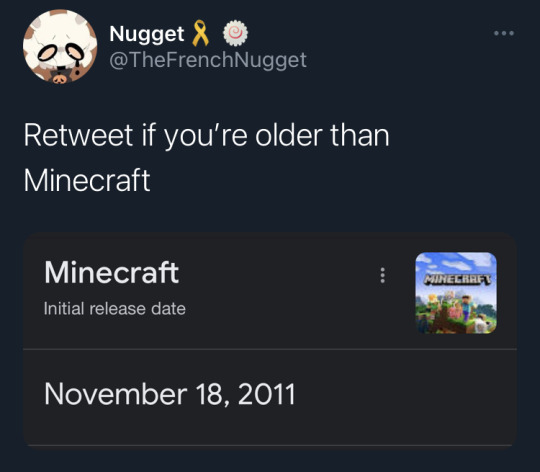
imagining a ten year old seeing this tweet and going “damn… i can’t retweet it” before walking away sadly and kicking a can
#i've been having a work-based-training on a school for the last four weeks and followed a bunch of ten year olds#and they're good kids even if some of them have some issues but that's beside the point#my point is that there's almost a disconnect between the kids and reality#they don't get that the internet and irl don't function the same way#and that just saying 'it was a misunderstanding' won't change tone or body language or context#like it was only 20 years ago i was 10 and many of their parents are my age#internet wasn't the same thing back then#few had cell phones and the fanciest ones had colour screen#no camera or tiktok or youtube or any games with a possible exception of snake#there are a lot of things that are better today than then#but how so many parents give kids free reign over tech isn't healthy#i don't think you should read their personal email etc (unless you have a *genuin* cause to believe there's grooming or something going on)#but imo you should restrict them from tiktok and other algorithm based media until they're mature enough to understand how those sites work#and teach them how to safely navigate them and so on#i was never good at social skills and still don't think i am but as i said there's almost a disconnect sometimes#pls don't use the internet as a baby sitter if you have kids#also the use of computers all the time is actually fucking up their ability to write and spell and work on eye-hand-cordination#my writing wasn't the best when i was ten nor were my classmates#but at least we turned our letters the correct way and knew to draw the letters from the top#so that ''h'' wouldn't end up looking like an ''n'' for example#and i'm not including the dyslectic kids in this#this is true for most of the students there's only a handful who don't flip their letters and so on
9K notes
·
View notes
Text





🍰[WAITLIST] 3D PIXEL COMMISSIONS!🍰
currently closed since i'll be on vacation until february 2025! send me a message if you would like to be put on the waitlist and i'll notify you when these are open again :)
i have comms open for little low poly 3d models!! i can do humanoids and anthros, whether its fanart or your own characters/OCs! feel free to message me with any questions 💗
if you would like a model of something that doesn't fall under the basic humanoid/anthro shape, message me and we'll see if it's something I'm able to do! :D
the base price for a character model is £45 !
to order, you can message me on tumblr or order through vgen ~
my prices are in GBP, but your payment method will be able to convert it from the currency you use :)
more info/full order form below "keep reading/read more" !!
[ keep reading / read more . . . ]
💗 please make sure that you have read and agree to my terms of service before ordering! i know it's a bit lengthy, but these are always to protect me as the artist and you as the client. even if you choose not to read it, these terms will still apply to you.💗
IMPORTANT: since these are low-res models, i may have to simplify designs/omit minor details, but i'll let you know if that may be the case!~
----------------------------------------------------
ORDER FORM
when you're ready to order, please copy/paste the headings with the heart bullets, fill out your answers, then message the finished form to me!
under each heading i've included some information to provide more context to help you answer the form! you don't need to copy/paste those chunks of text.
if you have any questions about anything at all, feel free to message me first!~
❥ CHARACTER(S) (£45 each):
please include images/art of your character(s) for me to reference, and a description of their personality if you'd like!
❥ PROP(S) (+£10 each): yes / no | how many
anything you would like your character to hold, or have in the image! for example, food, weapons, books, small simple pets/creatures, etc.
❥ SIMPLE ANIMATION(S) (+£10 each): yes / no | how many
i can do various simple looping animations such as idle, walk/run, sit, spin, dance, float, etc.
if you have any other ideas or more complex animation requests, feel free to send me a message before ordering!
if you order multiple characters, please specify whether you would like them to be animated together or separately! having them together/interacting in the same animation is +£15 on top of the base fee to animate each character. (for example, 2 characters interacting would be £20 (£10 per character) +£15, for a total of £35).
(!!!) if no animation is desired, you will receive a tpose turnaround .gif of your character.
❥ PERMISSIONS: yes / no (+25% privacy/NDA fee)
i like to share my finished models to promote my artwork & commissions, and may also stream commissions as i work on them! for these, i'll give credit to you as the character owner.
if you would prefer to keep your commission and artwork private, you may do so with an additional fee of +25% of the commission subtotal added onto to the final price.
❥ OTHER ADD-ONS: (optional)
commercial use (+£30): for streaming, YouTube, anything where you may gain profit from it. if you select this option, please state what it will be for. if you have intentions to use my art for merchandise, please contact me first as this will have different pricing!
rush fee (+£15): i will complete your model within 2 - 3 days of purchase!
model files (+£15): i will send you the blockbench file & texture for your completed model to do as you wish for personal use only, unless you have also paid for commercial use.
3D print compatibility (+£30): i will create a version of the model without planes, making it compatible for 3D printing. the full charge includes both the fees for sending you the model files, and 3D printing compatibility.
❥ PAYMENT PREFERENCE: paypal / kofi
paypal: i'll create an invoice for you that outlines your order details!
kofi: i'll ask you to send the payment as a one-time donation after we've discussed the commission info!
[please avoid ordering through the commission page with kofi if you can! it takes payment instantly after you fill out the form without letting us discuss the commission details first. i prefer to review the finished order form & answer/ask any questions before payment since sometimes that affects the estimated pricing, and just ordering straight through kofi might make you pay less or more than what the actual total is. thank you for your understanding! <3]
----------------------------------------------------
i take payment upfront via paypal or kofi before i will begin working!
estimated turnaround time will be 1 month, though it tends to be shorter than that! however, i'll update you with delays or if it's expected to take any longer than that <3
thanks so much for reading this and for all your support!! 💗
----------------------------------------------------
> you can find more examples of my pixel models/animations here! <
1K notes
·
View notes
Text
Revolutionary Girl Utena: Gender in Context
beneath the cut, I discuss the RGU's portrayal of gender in the context of 1990s Japan.
in Ikuhara's interview with Mari Kotani, he stated that in traditional Japanese society, "prince" meant "patriarch." the same is true in Western societies--there was a time when a prince would be an heir to a royal line. by 1997, this meaning had died out of large parts of the world. even the association between princes and traditional masculinity was fading. Saionji, the weakest, most pathetic man in the show, is a parody of historical Japanese masculinity, with his kendo and his blatantly regressive beliefs about women.
in RGU, prince may still mean patriarch, but in a far more subtle fashion. Ikuhara and Kotani discussed the changing expectations for men in the latter half of the 20th century--it became gauche to fight over a woman with one's brawn, so instead, power struggles were played out in the arena of looks and sex appeal. one can see this reflected in the character Akio, whose power as a prince arises from his ability to turn "easy sensual pleasure based on dependency" "into a selling point with which to control people."
Akio has his moments of showboating masculinity, but when preying on Utena, he operates by making himself seem non-threatening and soft.
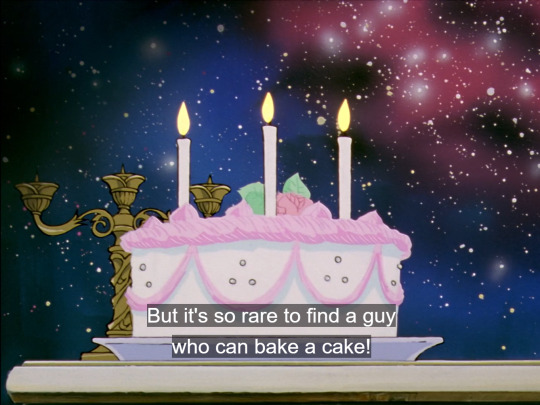
not only that, but he purports to want to allow students to express their individuality and thus approves of Utena's masculine form of dress. this is a front--by the end of the show, he's telling Utena that girls shouldn't wield swords. thus, through Akio's character, the show argues that traditionalist patriarchy in Japan isn't gone, but instead has only been papered over with false progressivism.
with all that said, there seems to be more to the character. he's taken the family name of his fiance, Kanae, and whatever material power he has in the school is dependent upon her family. in Japanese society, this is considered a humiliating position to be in, something that only a shameless man would do. the show never gives the audience any insight into how Akio feels about this--is he unbothered entirely, or are his actions against the Ohtori family an expression of his repressed anger? does he harm the children under his care to compensate for his humiliation?
this aspect of Akio's character may seem irrelevant in light of the larger, immaterial social forces at work in the show. however, I would argue that it was included for a reason. Akio, despite his status as ultimate patriarch of Ohtori, is in fact a highly emasculated character, to the point where lead writer Enokido even said that he is driven by an infantile mother complex.
to explain why Akio was portrayed this way, we have to discuss Japanese history. the nation suffered a major defeat in WWII and was forced to accept whatever terms the United States laid out for it. for an examination of how the Japanese have never truly processed those events and have plunged into modernity with reckless abandon, I recommend Satoshi Kon's Paranoia Agent. to sum it up briefly, in a very short period, the nation regained its economic footing, and by the 1980s had the largest gross national product in the world. this economic boom may have allowed Japan to maintain a sense of sovereignty, dignity, and power, but it was inherently fragile.
the infamous "bubble economy" lasted from 1986 to 1991. during this time, anything seemed possible; financial struggles appeared to be a thing of the past, and capitalist excess reached new heights. the ghosts of this period can be felt across Japanese media; for instance, think of the final shot of Grave of the Fireflies (1998), where the two dead children look down on Kobe, glowing an eerie green to imply its impermanence. the abandoned theme park from Spirited Away (2001) is explicitly referred to as a leftover from the previous century, when many attractions were built and then tossed aside in a few short years.
the bubble popped in 1992, leaving an entire generation feeling cheated. the bright futures they'd been promised, which had actually materialized for their parents and older siblings, had been lost to them overnight. economic crises are often accompanied by gender panics. to quote from Masculinities in Japan, "The recession brought with itself worsening employment conditions, undermining the system of lifelong employment and men’s status of breadwinners in general. The unemployment rate was rising, and although it never reached crisis levels, men could no longer feel safe in their salaryman status. Their situation was further complicated by the rising number of (married) women entering the workforce."
with this in mind, Akio's character can be taken as a representation of masculinity in crisis in 90s Japan. he's forced to rely on women for his position in life and has failed to save his only relative, Anthy. he tries to escape his misery through hedonism, perhaps an allegorical representation of how men tried to maintain their old standard of living after the economic bubble burst.
but of course, Akio is not the main character of RGU--the story is about girls. mangaka Yamada Reiji discussed the series in the context of the 90s, stating the following:
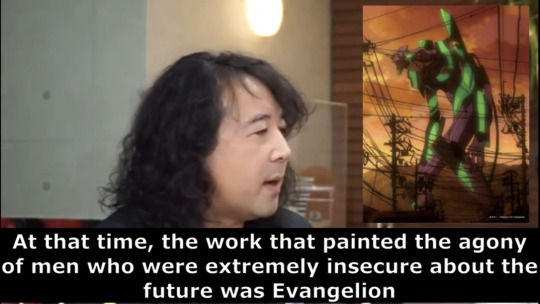
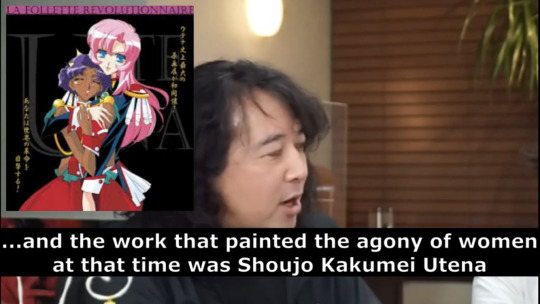
while I opened this essay by discussing the prince, the same points could be made about the princess. despite the increasing irrelevance of royalty, princess is still an important concept. how does it relate to the socioeconomic landscape of the 90s?
in Yamada's view, RGU is full of relics of the 80s; for instance, the figure of the ojou-sama, an entitled young woman who never lifts a finger for herself. during the economic bubble, it was increasingly common for women to be entirely taken care of by the men in their lives. Yamada names Nanami as a clear ojou-sama type character: she weaponizes her femininity, demanding to be rescued, doted on, and served.
however, by 1997, the ojou-sama could no longer expect to get what she wanted. from the 80s to the 90s, the percentage of women in the workforce increased around 15%; it was no longer viable for most women to be "kept" by their families. as the men experienced the humiliation of not being able to provide for their wives and children, women were undergoing a disillusionment of their own.
Yamada blames Disney for creating the ideological structure which led women astray. obviously, the company is known for its films about princes rescuing princesses. in Yamada's recounting, during the 80s, the company was infiltrating Japan through its theme parks as well; across the country, Disneylands were opening up, and people were buying into the escapism the corporation offered. Japan, as America, became a country of eternal children. its people were waiting for a prince to appear and save them.
but fairy tales can't stave off reality forever. Yamada claims that RGU embodies the rage of young women who woke up one day and realized that they had been raised on a lie. this anger pervades the work from beginning to end.
though RGU was created in a particular social context, its lessons can be extrapolated to any time and place. as the first ending tells us:
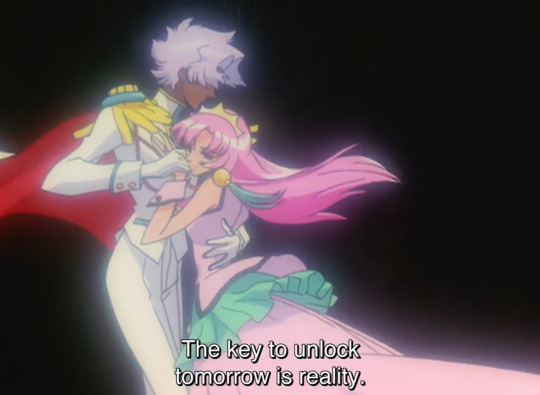
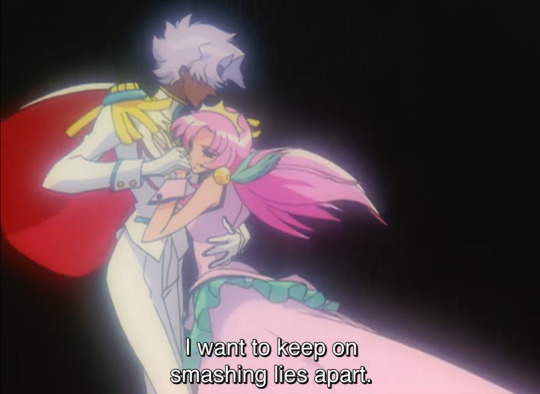
I hope this essay helped provide more context for the series. thanks for reading!
#rgu#commentary#revolutionary girl utena#this was originally a part of another essay but i revamped it and added a lot more detail
818 notes
·
View notes
Note
So many TTRPG people, like yourself, seem to exist in a world where players don't actually enjoy the campaigns they're in, and don't actually like playing with the people they play with, and your whole approach to game mechanics seems like it's about trying to bribe these people to continue playing at a given table.
i have no idea where you get this idea from, I play a bunch of different games - including freeform text rp, fest larps, parlour larps, regular tabletop campaigns, longform play-by-post games and narrative wargames - and I have a lot of fun doing it. I wouldn't be a game designer if I didn't actually enjoy games. The thing is, if you study game design and ttrpg theory seriously, you think about the intent behind design decisions. Game design doesn't just happen by accident, the designer put a given rule in for a reason. So, you ask yourself why the designer made the game the way it did, and what they were trying to achieve.
A significant tool for game design is considering the feedback the game provides; what behaviours that ruleset rewards and what it discourages. (You can apply this analysis to other games, too, like video games). When I'm talking about a bribe, it's in that context; how does the game reward you for doing things, and what things does it reward. (For example, 'scrabble' rewards you for playing words with weird letters in them by making those letters worth more points.)
The thing is, ultimately, every game relies on a simple proposition; that if you volunterily use its rules, you will have fun. You don't need to follow the rules, and you can have fun without them, but the idea is that using the rules will let you have more fun, or a different type of fun, than if you didn't. (For example, throwing a ball around is a bit fun, but if everybody agrees to follow the rules of basketball, you get a different experience that a lot of people prefer). So, the only bribe you're making on the interpersonal, out-out-of-game level (unless something weird is going on) is "if we play this game it will be fun". When I talk about bribes and incentives, it's *inside* the game, after we've all agreed to the game's proposition of "if you use the rules, you will have fun".
Now, what counts as an incentive varies by game. Some, like Warhammer 40k, are challenge-based, and have ways to keep score of success and victory; here, things that signify overcoming the challenge are your incentives; how you get a high score, how you win, etc. Others, like most ttrpgs, are creative-based. What constitutes an incentive within the game's structure is less precisely defined. By and large, though, these incentives tend to be things like increased agency within the game fiction, space for creative expression, and experiencing and learning about more of the game fiction. (In this structure, 'being more mechanically powerful' can be thought of as a way of granting a player more agency, because their actions are more likely to succeed and result in the outcomes that they want. If the mechanical growth is lateral as well as vertical, then how to get more powerful is - itself - a venue for creative expression in what to prioritise, which is also a reward).
In the same way that you have the adage that 'restrictions breed creativity', the same goes for Fun. Limiting your scope from anything-goes freeform by voluntarily agreeing to use a set of game rules can produce similar results. Voluntarily limiting your agency in the fiction according to a set of game rules produces a friction that players of roleplaying games find enjoyable to push against. In this context, a reward structure within a game serves the useful purpose of signposting which direction you should push to get the fun kind of friction. A game which limits your options, and then gives you more options when you engage with certain behaviours, is telling you that those are the intended behaviours. Likewise, a game that limits your options even further when you do something is encouraging you not to do that. This is because game designs are not neutral and universal, they exist to create specific experiences. A game that rewards you by giving you more space for creative expression when you get in a fight - and gives you less space for creative expression when you avoid violence - is one that wants you to engage in violence, because it's designed to be a game where you have fun by fighting. This isn't bribing the players to sit down at the table and play the game; that has already happened outside the context of the game. They have already agreed to the game's offer of 'if you use these rules, you will have fun'. Rather, this bribing is within the game-space, the games mechanics encouraging the players to engage with it as intended, in the way that will be most fun. IE: these incentive structures are a tool the game uses to achieve the promise it makes; they guide the players towards the fun that they volunteered to have. Hope that makes sense. * * * Now, your initial ask is a weird take that's entirely unrelated to anything I've posted, and - particularly from an anon account- oddly antagonistic. I don't know if you're genuinely confused about game design, or arguing in bad faith. Either way, this probably doesn't merit the small essay I've produced, but have one anyway, it's always fun to clarify my ideas in written form.
908 notes
·
View notes
Text
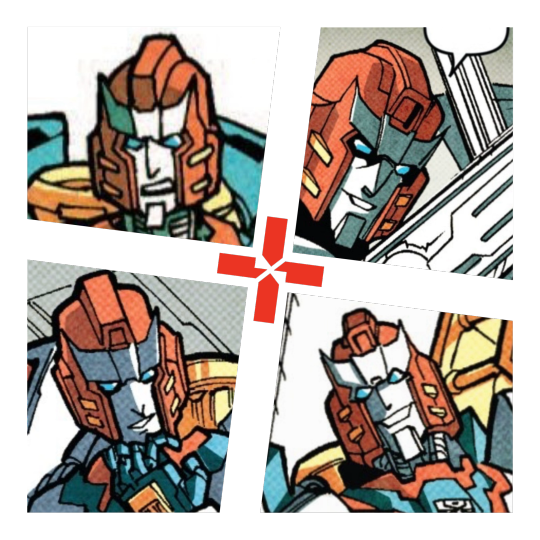
Medic, Maverick, Maniac, Murderer: Understanding Pharma
First thing’s first: I love Pharma, dearly.
In all the time I’ve spent evaluating his character, I’ve mainly focused on what can be worked out about who he is as an individual: his core sense of self, psychological drives, subjective worldview, etc.
When all else is stripped away, who is Pharma?
This treatise is the product of obsessing over Pharma, analyzing canon (and extras), and reading as many different perspectives on his character from fans across the fandom as I could find. The post is long, so for those of you who balk at the thought of reading a shortfic’s worth of Pharma thoughts, feel free to read the TL;DR (Conclusion) at the end and then decide if the full read is worth your time. Also, a premium reading experience is available in the form of the original Google Doc version.
As you read, keep in mind that this is primarily a mix of psychoanalysis, evidence-based examination, and speculation—not moral, ethical, or sociological commentary. The goal is to examine Pharma’s psychological drives and core values, and each of his appearances in the context of those. All other types of evaluation are up to readers.
Now, take your victim blaming-allergy meds (just in case); remove your black-and-white thinking caps; and leave your personal morality lenses at the door.
Psychological Drives & Core Values
Why does Pharma act the way he does? What gives him a reason to keep living? What are his personal priorities?
At the beginning of the Delphi arc, First Aid establishes Pharma as a “control freak” and someone who “thinks he’s an expert on everything.”

Now, First Aid has a habit of complaining about his bosses, but on both points, there’s canon evidence to back them both.
Expertise and Intellect
Throughout the Delphi and Luna 1 arcs, it’s established that Pharma is a skilled and brilliant doctor.
He once performed a 4-way fuel pump transplant, donating his own fuel pump in the process. (see above panel)
Later, he invented a soundbomb that left an echo laced with a virus and invented an antidote to that virus:
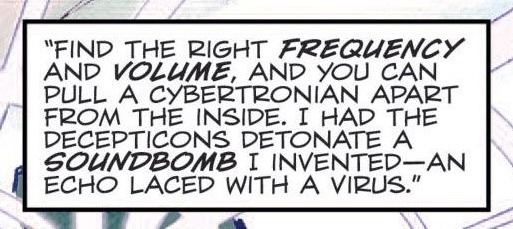
And on Luna 1, he was on the edge of finding a cure for Cybercrosis, based on the fact that Swerve was able to formulate a cure from his notes.
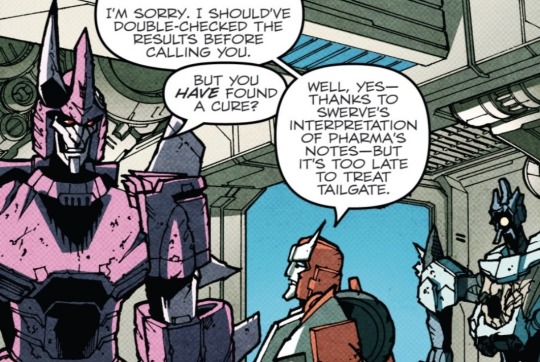
More than being a doctor, Pharma lives for intellectual and scientific achievement as a physician scientist. He feels most alive when he’s able to solve complex medical problems, and when his achievements are recognized by those whose opinion he considers important.
This is Pharma’s 'why.'
And even though he’s arrogant and enjoys praise, it’s not his primary motivation. He doesn’t need it in order to set his mind to whatever he’s interested in, although he’ll seek it from those he values most (i.e. Ratchet).
Pharma sees himself as less of a doctor, and more as a scientific innovator or medical maverick. The practice of medicine is primarily a catalyst for his creativity and intellect; it’s not an end in and of itself like it is for someone like Ratchet or First Aid.
First Aid’s observation of Pharma can be better phrased as, “[Pharma] thinks he’s an expert on everything medical”—because he’s not so driven by achievement and admiration that he’ll grovel at the feet of strangers and get good at something he doesn’t personally find interesting. The only time we see him express a desire for praise is when he’s around Ratchet—someone he holds in high regard for both personal and professional reasons. This makes sense since Ratchet is one of the only people who can give Pharma any kind of competition within what he considers to be his area of expertise.
“Each day we go to our work in the hope of discovering—in the hope that some one, no matter who, may find a solution of one of the pending great problems—and each succeeding day we return to our task with renewed ardor; and even if we are unsuccessful, our work has not been in vain, for in these strivings, in these efforts, we have found hours of untold pleasure, and we have directed our energies to the benefit of mankind.” —Nikola Tesla
Ego
Without question, Pharma has an inflated ego, but having an inflated sense of self doesn’t automatically mean a person is a full-blown narcissist or that they are totally uncaring.
Every personality trait exists on a spectrum. Yes, Pharma is arrogant, but the presence of arrogance doesn’t automatically and completely cancel out all “positive” traits. (For fun, check out studies on Dark Tetrad and Light Triad personality traits.)
People are complex. Arrogance can coexist with genuine kindness, ruthlessness can coexist with deep compassion, etc.
Whether Pharma exhibits genuine kindness is up to each reader’s interpretation of what little canon material exists, but the point is: Pharma’s arrogance doesn’t automatically rule out the possibility of authentic “positive” traits.
Controlling Tendencies
Pharma is comfortable pulling the power card and using it to dump what he sees as uninteresting parts of medical practice on those below him:
“So Fisitron’s writing about the Wreckers’ elbows now, is he?” said Delphi’s Chief Medical Officer. “Come on, First Aid - get to it. You’ve got a Fader in Row 2 downstairs.” He squeezed the air with his finger and thumb. “He’s about this far from shutdown.” —from Bullets by James Roberts
However, there’s nothing in canon indicating he’s power-hungry in a megalomaniacal sense. He’s not Starscream or Megatron; he doesn’t seek political or social power. In fact, he seems perfectly happy hiding away in a lab or medibay by himself so he can direct all his energy toward solving issues and achieving the so-called ‘impossible’ within the field of medicine:
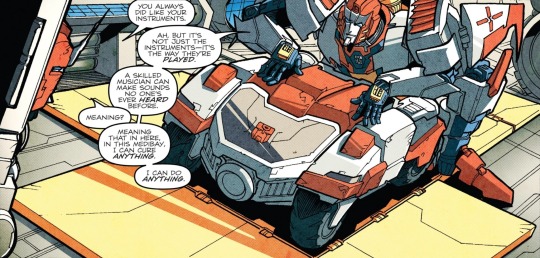
The ways in which Pharma exercises power and control are through his expertise, and his administrative/management skills. That’s it.
Self-confidence
Pharma’s arrogance and controlling tendencies don’t seem to be a mask—like he’s trying to compensate for some sense of lack (in those areas). Yes, he fears failure, and yes, he displays some insecurity when Ratchet questions his competence. But at every other point and in every other way, Pharma is unapologetically self-confident. He’s fully self-assured of his intellectual prowess and problem-solving capabilities; he knows what he knows, and he also knows what he doesn’t know.
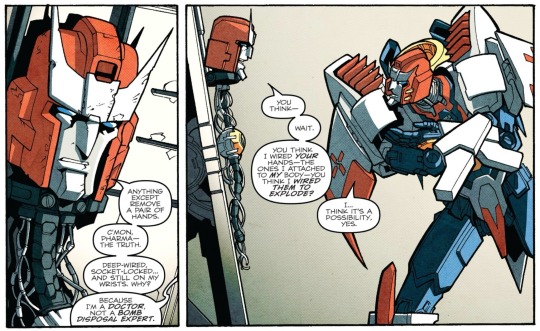
Pharma’s arrogance and desire for control don’t stem from a hidden lack of confidence or a hunger for power on its own. They stem from the fact that he genuinely sees himself as the best person for the work he does. He trusts himself above anyone else to solve problems that come his way—medical or otherwise (within limits).
Elitism vs. Superiority
I’ve always read Pharma as having an elitist attitude, but not in the social stratification sense:
elitist (adj.) relating to or supporting the view that a society or system should be led by an elite.
There’s no evidence that Pharma believes an elite class of people should hold the most power. Instead, Pharma’s “elitism” is actually an individualistic sense of superiority. It’s centered on him alone, and is tied to his capabilities as a physician scientist and surgeon.
Pharma sees himself as the best of the best and makes sure everyone knows it—sometimes through his words, but mostly by his conduct in the field of medicine. This, paired with Pharma’s natural temperament, doesn’t exactly make him socially popular—inside or outside of medicine:
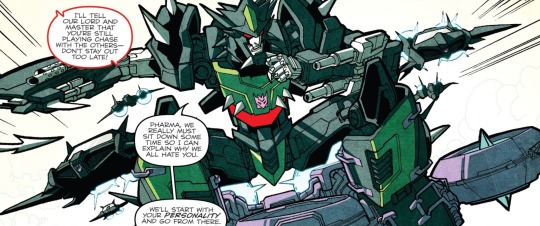
One could argue that the “personality” Lockdown is referring to was a result of all Pharma had suffered at Delphi and Luna 1, but just as easily, one could argue he was always a bit difficult to get along with, and that his traumatic experiences merely magnified his already-present psychological patterns. Personally, I like the latter interpretation because it’s a flaw that makes Pharma a more interesting character no matter his mental state.
Everyone reacts differently to real and perceived social rejection. Some are so concerned about it that they’ll try anything to belong; others genuinely don’t care, and they continue as usual; and still others cope by shifting their mindset and developing a sense of pride in being an outsider.
There’s no evidence for this in canon, but I believe it’s within reasonable characterization boundaries to headcanon Pharma as being in the second or third category.
With either of those two mindsets, a sense of superiority can develop, or even be an inciting factor. Either someone sees themselves as genuinely superior to the majority and doesn’t mind when this alienates them from people, or they convince themselves they’re superior because the pain of accepting they were rejected for who they are is too much to handle.
Whatever the case, the point is, having an “elitist” attitude isn’t necessarily rooted in a sociological or ideological belief. Sometimes, individuals just see something in themselves that—to them—justifies a sense of personal superiority. A quick glance at Pharma’s canon appearances makes it clear he holds such a view of himself, at least to some degree.
Morality and Compassion
When Pharma first shows up in canon, he’s working at the New Institute. A lot of questionable things took place there on a regular basis—things Pharma would have been aware of, to some degree. However, his presence at the Institute doesn’t automatically mean he agreed with everything happening. Depending on how strongly someone feels about something, some people are content to disagree in silence. Not everyone who seeks employment considers it a priority that the establishment they work for aligns perfectly with their moral values. After all, there are other reasons to take a job: financial benefits, exclusive educational and career opportunities, pure convenience, etc.
I’m not here to say either way whether Pharma’s willingness to turn a blind eye to the events at the New Institute was wrong or right; that’s up to each reader to decide for themselves. However, Pharma’s choice to remain employed at the Institute for some time can say something about him as a character: his priority as a doctor and person is not to take care of everyone he encounters, or to act as some kind of moral or ethical authority.
This isn’t to say Pharma won’t ever stand up for something he regards as right or push back against something he sees as wrong, “off screen.” It’s just that everything in canon points more to a tendency to choose his battles instead of acting immediately on any moral sense the way someone like Optimus or Ratchet might.
This also isn’t to say Pharma doesn’t care about saving lives, but from what little is shown of him before Delphi, it’s hard to say how much he cared. Ratchet confirms later that Pharma was an excellent doctor for most of his life, but all that tells us is he was an excellent doctor; it says nothing about his internal attitude toward his work or patients.
However, inferences can be made based on doctors in our own world:
Being a doctor—especially one in trauma care—is far from easy. It takes a lot out of a person, and there are very few people who last in the profession for a long time. Most medical professionals fall into one of the following categories:
People possessing a strong will that’s coupled with an unwavering passion for taking care of others (the public’s favorite)
People who naturally have, or develop, an ability to switch their empathy off and on at will, or build walls around it—also possessing a strong will (the ideal)
People who naturally have a limited capacity for empathy (the one the public hates to acknowledge)
People with a strong social and professional support system (the necessary, but underutilized and underappreciated factor)
Of course, even if a person has one or more of the above, burnout can and does still happen, but individuals who have at least one have the best chances of surviving and thriving amidst the demands of the majority of medical professions.
As far as is shown in canon, Pharma never had a strong support system—either circumstantially or by choice—so something else was keeping him in medicine.
Pharma shows concern for both Tumbler (Chromedome) and Hubcap:
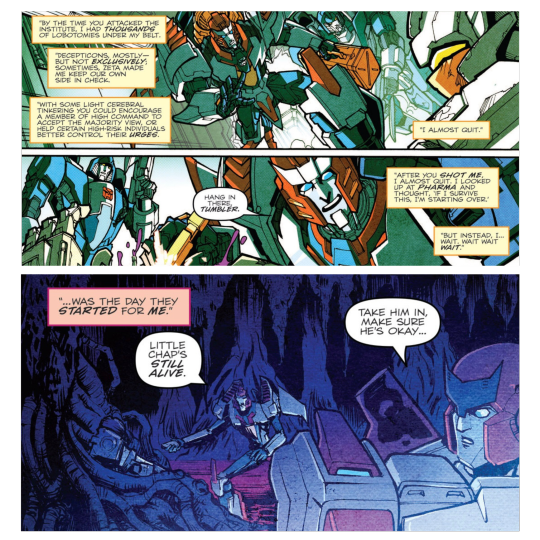
But even though he obviously cared enough to step in, neither instance makes a strong case for a capacity for empathy beyond the “average” or “norm.” Performing a job well is a lot different from being personally invested in the work.
Based on everything up to this point, and this later comment from Pharma, about Ratchet…
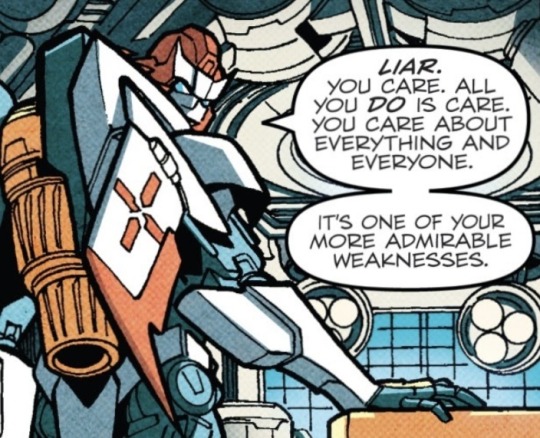
…Pharma has probably never shared the same I-care-about-everything-and-everyone view of the world. Instead, it’s more likely that Pharma holds a more rational view of his work and patients.
One of the first things learned in medicine, especially in trauma medicine, is that you can’t help or save everyone, and to hold yourself to that standard can destroy you quickly if you have a certain temperament or lack healthy boundaries for your empathy.
“There are times when it may seem as though I view sick or injured people not as living, breathing humans with feelings and emotions and people who love them, but simply as cases, as problems to be solved. And that is absolutely true. It's not that I don't have empathy, but the hard fact is that as a doctor, and especially as a trauma surgeon, too much empathy can get in the way of your job and cause you to make decisions based not on sound medical judgment but on your own emotions. Sure, I've seen things that even years later can still make me choke up when I think of them: a little girl shot and killed, a shattered young Marine who shouldn't have died but did. But you can't choke up in the ER or the operating room. To be effective as a trauma surgeon, you have to put a layer of Kevlar around your heart.” —Dr. Peter Rhee, Trauma Red: The Making of a Surgeon in War and in America’s Cities*
Pharma may have learned this difficult truth earlier than Ratchet and developed a practical way of managing his empathy that comes across as “cold.” He may have always had an ability to put up walls around his spark. Or, he may have always had little to no capacity for empathy.
The fact that the morality lock on Tyrest’s portal prevented Pharma from passing through proves he felt guilty for what he’d done, and JRO confirmed this. Therefore, it’s safe to assume Pharma had some level of empathy for his former patients, suffering moral injury when he felt he had no other option but to start killing them.
Still, looking at Pharma’s psychological drives and his behavior throughout canon, it’s clear compassionate care and morality are subordinate to his other values and interests.
*I highly recommend this book, and learning about Dr. Rhee in general. He’s a huge inspiration of mine, and one of my main sources of inspiration when writing Pharma. Level-headed and capable, strong-willed, selectively empathetic, an excellent scientist, etc. He lives for the thrill of practicing medicine both on the floor and as an expert in his field who pushes trauma medicine to new heights through his research. He also takes great pride in his hands. Seriously—the man spent an entire paragraph and a half talking about his “good hands” and how they were one of two reasons he decided to go into trauma surgery. The other reason was that he “liked action and excitement, liked the feeling of being able to walk into a tough situation and take control.” (Sounds familiar…)
Delphi
First thing’s first: we don’t know how much Pharma did or didn’t know about the DJD before agreeing to take the Delphi assignment.
That far into the war, he would have known something about the DJD and their ways of terrorizing traitors and Autobots, but for whatever reason, he took the assignment anyway. Perhaps Prowl assured him the situation on Messatine would be monitored and that the security team would be enough. Perhaps he underestimated the DJD’s capabilities, or scale of territory, and thought he would be able to handle things on his own. Perhaps Prowl gave him no choice. Maybe it was all of these and more.
Whatever the case, according to JRO, Pharma didn’t hate Delphi before the incident with the DJD.
Word of god remains a touchy subject in fandom, but in this case, it’s important because it says two things:
The DJD left the Delphi medical team alone for some time.
Being on the edges of DJD territory didn’t automatically mean isolation and harassment by their hand.
On the second point, First Aid was free to come and go from Messatine as he pleased, seeing as he attended a medical conference at Kimia five years into his assignment at Delphi:
Five years ago [mid-Delphi assignment], the leader of the Wreckers had cornered him at a medical conference at Kimia, the space station that doubled as a weapons research facility. —from Bullets
And five years after that, he was able to not only contact Springer without delay about one of Agent 113’s bullets he’d discovered in an Autobot badge…
He raced upstairs to his computer terminal and typed in a certain frequency code for the second time in his life. A face appeared on the screen and grinned. “It’s me,” said First Aid. “And you're never gonna guess what I’ve got for you..!”
…but he was also able to meet up with Springer to hand off the bullet:
“Your friend has a funny way of making contact,” First Aid had said when he’d got in touch three days earlier, and he was right.
It’s not known if this handoff happened on or off world, but either way, the DJD didn’t interfere.
At some point, Tarn set his sights on Pharma and the Delphi team. Knowing the DJD, one can only imagine what Tarn used to show off his team’s capabilities and convince Pharma the best option was to cooperate.
In striking a deal with Tarn to keep the DJD away from Delphi, Pharma established his territory and ensured his continued security and the safety of his staff. As long as Tarn got his T-cogs, Pharma could continue on in relative peace. He could work his magic on bots that ended up at Delphi, carry out his management duties, and work on whatever projects or research he may have been conducting in his free time.
For whatever reason, after he first came into contact with Tarn, Pharma didn’t call for help. Communications were still operational, as Pharma wouldn’t have suggested contacting High Command about the Duobots if the team was aware of any comm malfunctions:
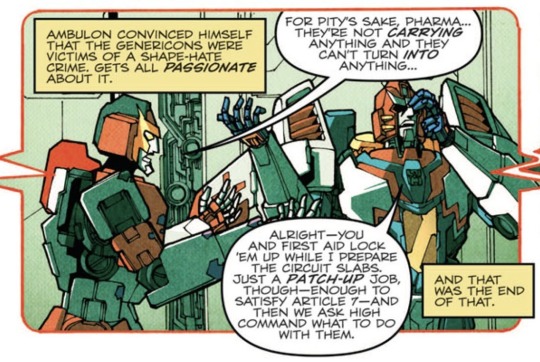
Also, First Aid later confirms that communications were fine until the Big Bang (soundbomb detonation):
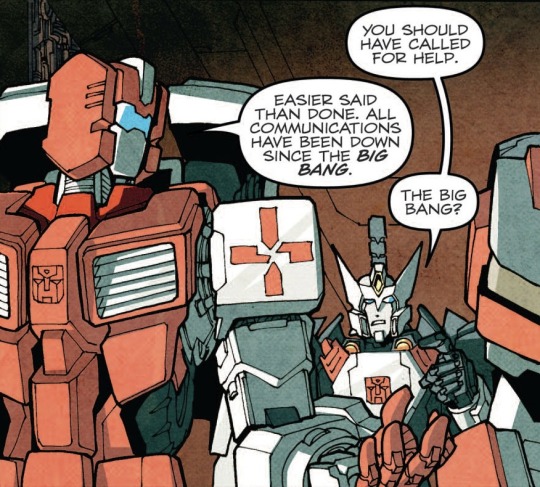
It’s always possible the DJD was monitoring the radio waves, but secure subspace frequencies exist, such as the Datalog Network First Aid used to send the datalog containing the death statistics:

Speaking of which, assuming First Aid sent the datalog with the statistics right when things started to get ‘weird,’ and before the Big Bang shut down comms, it only took—at most—a few days for them to reach Ratchet and Swerve on the Lost Light:

But back to Pharma not calling for help: for all of Prowl’s intel, contingency planning, and fretting over the security of Autobot territories, I find it hard to believe he would have stuck an Autobot medical team on the fringes of DJD territory without giving them some means of securely contacting the outside in case of issues.
But even if Prowl didn’t give Pharma a secure way to contact him or anyone else, and even if Pharma was convinced the DJD was monitoring regular communications, there were other ways he could have reached out for help. After all, the team wasn’t alone on Messatine. Like Pharma said, Prowl continued to send bots to defend the nucleon mines:
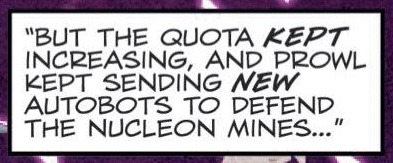
The Autobots had been mining nucleon for millions of years at this point, so I doubt the mined nucleon was just sitting in storage on Messatine; shipments of the stuff would have been sent off-world to wherever the Autobots needed it. Why not send a message for Prowl with someone leaving with one of those shipments? A message meant only to be sent over a call when absolutely certain they were out of range of the DJD’s potential monitoring.
Or, why not order in off-world medical supplies and send a message back with the delivery bot(s)?
There are two possible answers to this. One takes into account JRO’s word on the subject; the other is more intricate and speculative on my part, but it leads to the same place. So whatever your stance is on the validity of word of god, there’s an answer for you.
Answer one (word of god)
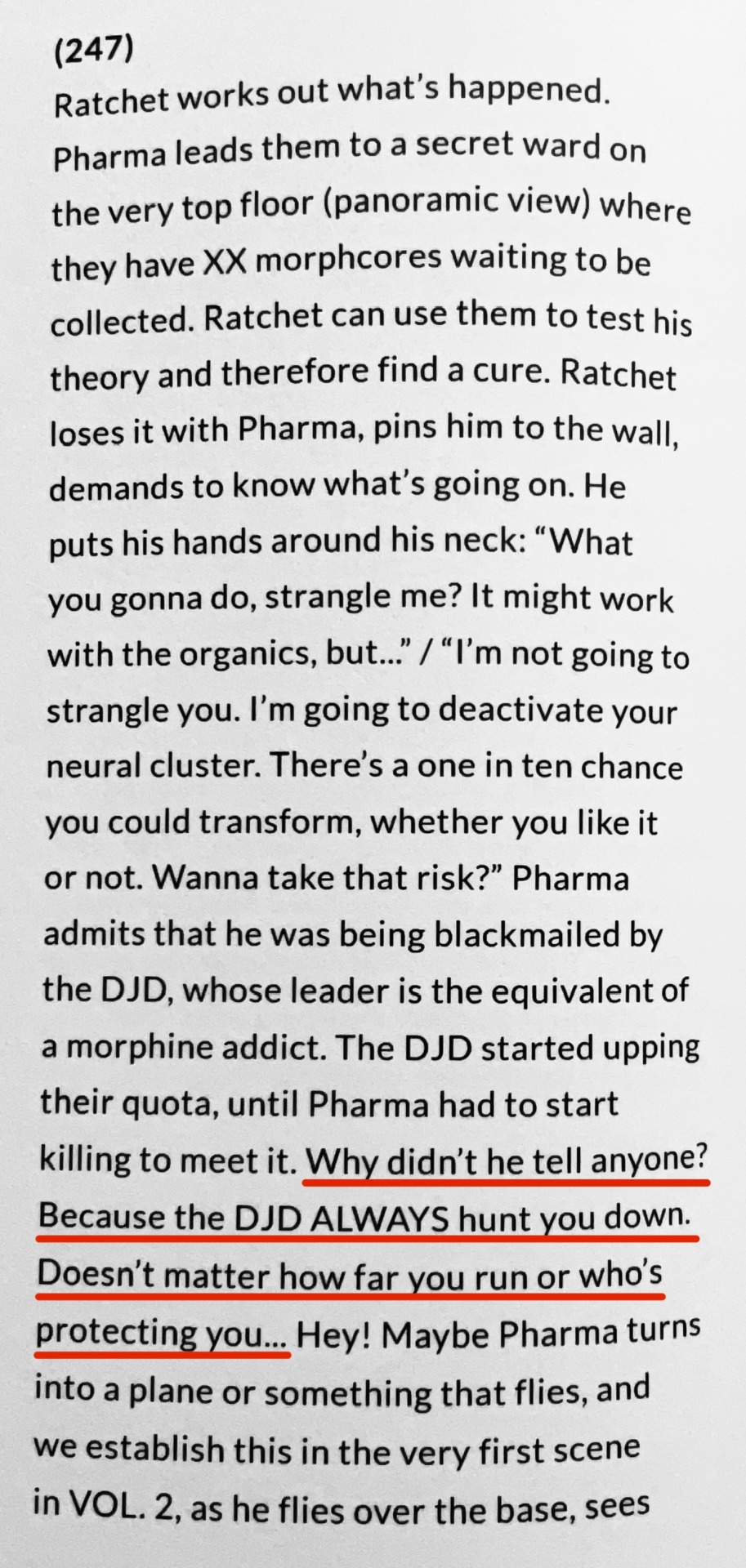
Simple as that. Pharma was aware of the scope of the DJD’s capabilities and relentlessness, and determined he was trapped prey.
Answer two (no word of god)
There are a few possible reasons Pharma didn’t call for help right away:
He was convinced all his other options would take too long and/or would still lead to him being put under suspicion. After all, being found to have harvested even a single T-cog from an already-dead patient for the DJD could have raised concerns that would lead to Pharma being investigated and/or having a mark put on his record.
He underestimated the severity of Tarn’s addiction, and was certain he could keep up with the T-cog demand without resorting to other means of harvesting, not realizing Tarn’s quota would increase later on.
He was already paranoid as a result of whatever mind games Tarn had set in motion at their first meeting, making Pharma think escape was futile.
Word of god or no word of god, there are clear reasons as to why Pharma ended up trapped. Most likely, it was a mix of all of the above.
Whatever was going on in Pharma’s mind before, he ended up in deeper trouble. Tarn increased his demand for T-cogs, and Pharma couldn’t keep up. By the time this happened, even if he had wanted to call for help, it was too late to do so without implicating himself. He reasoned his only option was to start killing patients to harvest their T-cogs.
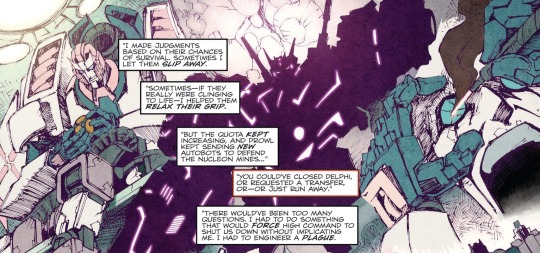
Soon, Pharma was so consumed with fretting over whether he’d be able to meet Tarn’s next demand that he didn’t have time or freedom to do anything else except worry and feel guilty. His whole life revolved around Tarn’s addiction; he was no longer in control, and could no longer enjoy whatever it was about Delphi he’d previously enjoyed. Perhaps the facility itself enabled Pharma to research cures and perform scientific miracles of medicine.
Being at the mercy of Tarn—convinced the DJD would find him no matter what—would have been pure psychological torture on its own, but also knowing that any small chance he did have of getting help would end in him losing everything would have added to his suffering. Pharma became desperate to reclaim control over his life and began planning an escape.
Now, JRO has said that Pharma didn’t originally plan to use the rust plague on the DJD…but canon says otherwise:

Of course, Pharma could have been lying to make himself look better in Ratchet’s view, but based on everything he’d been through up to this point with Tarn, it’s more likely he was telling the truth and had tried to eliminate the source of his suffering first. After all, wiping out the DJD would have been the simpler, cleaner option.
When the Duobots refused to detonate the soundbomb near the DJD, Pharma’s objectives shifted. He had to get Delphi shut down in a way that would:
Convince the DJD the shutdown was legitimate.
Pharma knew chances of escaping the DJD at all were slim to none, but he was desperate. Getting Delphi shut down would cut off Tarn’s supply of T-cogs and allow Pharma to escape Tarn’s immediate control, but the shutdown had to be “legitimate” to prevent Tarn from retaliating and hunting him down later. Leaving Tarn even the slightest chance of regaining control was too risky, so Pharma had to make sure his plan was as airtight as possible.
Cover up the patient murders.
If the truth got out about Pharma killing patients, he’d lose his medical license and most likely be put away for life. Being cut off from the practice of medicine and his intellectually stimulating work as a doctor would mean losing more than a job and a reputation. It would mean losing everything in which he’d anchored his sense of identity and life’s meaning. His refusal to consider any other options wasn’t just about ego and preserving his image as an excellent doctor; it was about preserving any kind of meaningful future he saw for himself.
Pharma needed a plan that would fulfill all of the above. Turning the engineered virus on the medical facility was the most effective and efficient solution. Anything else would have made him suspicious in the view of either Autobot High Command or the DJD, and neither of those would have ended well for him.
Because of his goal to preserve his reputation and future in medicine, he couldn’t even risk revealing anything to First Aid or Ambulon, who would have seen to his ruin. They became nothing more than loose ends that had to be tied up, and based on the fact that Pharma only prepared one vial of the vaccine, his original plan involved him being the only survivor:
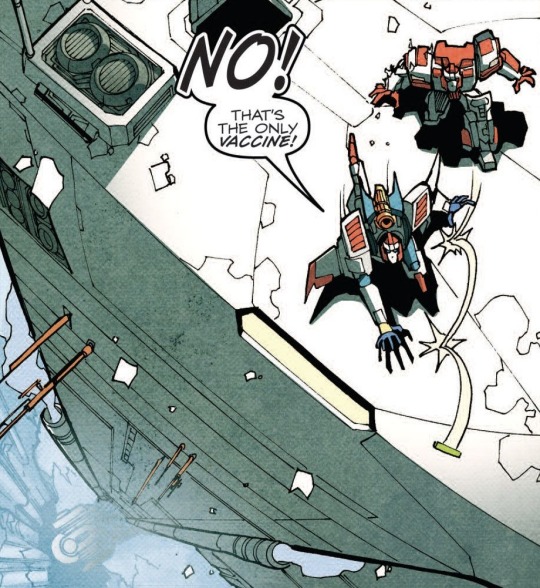
He probably would have had no problem making more of the vaccine for anyone else who survived, but he wasn’t counting on it. He wanted a totally clean slate; in letting his staff die with most of his patients, he would be getting rid of any and all evidence and reminders of his failures. He may have cared about First Aid and Ambulon before things got bad, but somewhere along the way, he decided either it wasn’t worth it to go through the trouble of finding a way to save them without raising suspicion, or he didn’t want to risk them putting together the pieces later on.
Of course, when Ratchet showed up, plans changed.
Ratchet
Ratchet is not the kind of person who seeks first to understand or be understanding. He’s inclined to trust what’s in front of him over anything abstract, and tends to look at the results of someone’s actions over trying to find any kind of ‘why’ behind them. Also, unlike Pharma, he operates from a strong moral sense, and reacts quickly and strongly when something or someone goes against that internal moral sense.
Ratchet’s reaction to finding out what Pharma did may seem hasty and harsh, but it makes perfect sense on a human level. There is no such thing as unconditional love; everyone has personal and moral lines (boundaries), and they’re different for each individual. When the most rigid of lines is crossed, that’s it; walls go up and the offender is cut off, no matter how strong the relationship may have been.
Ratchet obviously knew Pharma well enough to think he could try talking some sense into him, but then Pharma revealed that he’d crossed one of Ratchet’s lines: murdering patients. Any willingness Ratchet may have had to try to understand vanished. By the time Pharma started trying to provide a ‘why’ for his actions, Ratchet’s moral judgment had already shut down any chance of understanding what could have possibly led Pharma to kill patients. It didn’t help that Pharma seemed totally unapologetic and outright proud of his plan. For Ratchet, the ‘why’ didn’t matter anymore. What he saw was what he trusted, and what he saw was a friend who’d become his idea of a monster.
Now, Ratchet and Pharma’s relationship is one of the most confusing IDW relationships I’ve had the pleasure and pain of dissecting.
It is notoriously difficult to determine the depth and strength of a relationship from the outside. However, I’ve decided to go ahead and address it anyway because it has the potential to provide insight into Pharma as an individual.
If I were to sum up Pharma and Ratchet’s relationship in a single word, I would use “ambivalent.” The first time I read MTMTE, the thing that stood out to me most about their relationship was the drastic differences between how they each perceived the relationship.
In one sense, there’s the idea of Pharma basically being Ratchet’s crazy stalker ex, which is tossed around in fandom a lot. While I personally dislike seeing it regardless of context (yes, even as a joke), I do see how JRO’s writing choices set things up in a way that makes it easy to superimpose that trope.
In another sense, there’s the idea that Pharma and Ratchet were always close friends, and that what happened at the end of the Delphi story was a betrayal of both sides that came out of nowhere and whose consequences were taken too far.
I disagree with both. Personally, what I see at the end of the Delphi story isn’t an obsessed ex gone mad, a sudden betrayal, or a badly executed backstabbing. What I see is a breakdown of an already-complicated and poorly-maintained relationship: true feelings being revealed, long-repressed bitterness being forced to the surface, carefully-hidden cracks being split wide open.
Most people don’t have an accurate understanding of how much or how little they truly know the people in their lives, often overestimating how well they know a person until something surfaces and blindsides them.
According to JRO, Ratchet was oblivious to Pharma’s romantic interest, and throughout canon, it’s easy to see Pharma was more invested in the relationship than Ratchet ever was.
The question is, did Ratchet ever care about Pharma at all? And if so, to what degree?
Yes, Ratchet calls Pharma “buddy” and “friend,” but the former was sarcastic, and the latter means something different to each person. Also, in light of the circumstances, Ratchet could have just been saying “friend” in response to Pharma saying it—an emotional appeal more than anything.
However, Pharma must have been aware of Ratchet’s lack of relational investment because during the confrontation at Delphi, Pharma’s first reaction wasn’t to appeal to their friendship (ex: “But you know me!”). Instead, he appealed to their shared profession:
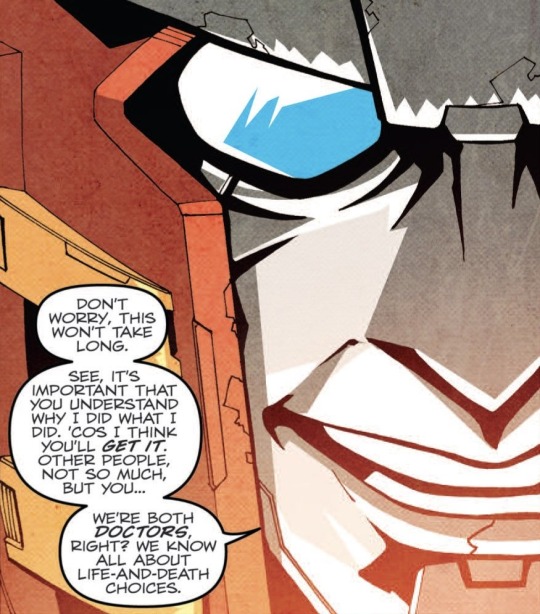
Then there’s the exchange of insults:
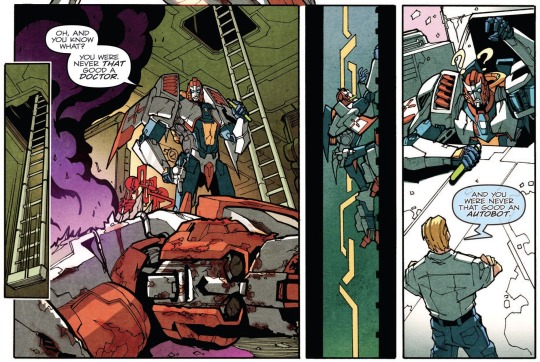
This is what I meant earlier by “true feelings being revealed.” Ratchet may have just been trying to match Pharma’s insult, but it’s unlikely it was merely reciprocal because while Ratchet is snarky at times, he’s sincere in that snark. There’s almost always some truth in his verbal jabs no matter how unserious they seem, and he’s never cruel for cruelty’s sake.
So, if Pharma saw Ratchet as an inferior doctor, and Ratchet saw Pharma as an inferior Autobot…it’s reasonable to assume there was always some deep-rooted competition and conflict preventing them from being super close.
Possible suspicion surrounding Pharma’s conduct as an Autobot paired with a tendency to misjudge the nuances of relationships could explain why Ratchet was so quick to decide Pharma was a lost cause. Maybe Pharma’s actions at Delphi confirmed something from the past that Ratchet had brushed off for whatever reason.
In any case, Ratchet seems to have been largely unaffected by the Pharma he found at Delphi. While leaving Messatine, he emphasizes that he’ll miss Pharma’s talent.

Not “who he used to be.”
Not “what we used to have.”
Just…“his talent.”
Later, on Luna 1, Pharma mentions that he and Ratchet were inseparable, but that could mean a few different things:
Best case scenario: Pharma and Ratchet sought each other out on equal terms.
Worst case scenario: Pharma followed Ratchet around.
Somewhere in the middle: the job forced Pharma and Ratchet to work in close proximity most of the time, and while Pharma intentionally ran into Ratchet more often than necessary, Ratchet also sought out Pharma every now and then.
Whatever the case, working with someone every day doesn’t tell you anything about who they are as a person, and the amount of time spent with someone doesn’t automatically correlate to how deep the relationship is or how well the people know each other. It’s not like either Pharma or Ratchet are shown to be good at expressing their personal feelings outside of extreme circumstances.
Ratchet does bring up late-night conversations of the past:

But while this indicates there was something deeper between him and Pharma, because neither of them were ever shown to be super open with their true feelings, it’s unlikely the conversations were full of touchy-feely talk. In all likelihood, the conversations were mostly medicine and war-related, with the rare spark-to-spark talk sprinkled in. Also, considering everything up to this point, one has to wonder if those talks ever meant anything to Ratchet, or if he was just digging for something that might stall Pharma’s torture.
Maybe those late-night conversations did mean something to Ratchet, but whatever the case, Pharma didn’t take the bait. He knew Ratchet was trying to stall by making an emotional appeal, and perhaps he was convinced the conversations hadn’t meant that much to Ratchet.
Looking at all of this, it’s hard to believe Ratchet ever cared about Pharma as more than an interesting work friend. But even if he had cared more than he let on, it wasn’t enough to overcome the doubts he had about Pharma’s character.
As for whether Pharma truly cared about Ratchet, I’m convinced he did, but in a mostly unhealthy way, and with a strong undercurrent of one-sided rivalry. At some point, Ratchet had been an equal and a source of challenge, and he probably listened to Pharma pretty often. It’s reasonable to assume Ratchet was one of the only people—if not the only person—able to handle Pharma’s intense temperament and challenge him in a meaningful way, providing some semblance of friendship for Pharma.
However, one last thing that stands out is that, when telling Ratchet why he’s torturing him, Pharma didn’t say anything like, “Because you hurt me” or “Because you turned against me—your friend.” Instead, he said it was for “ruining things at Delphi” and because “you declared war on my body.”
Either Pharma wasn’t being entirely honest, or Ratchet’s friendship didn’t mean as much in the first place as he’d previously implied. It’s possible the ‘Because you hurt me’ was implied in “for ruining things back at Delphi,” but why not say it outright? Perhaps it was a fear of vulnerability and admitting there was ever a relational need at all.
At the end of the day, it’s difficult to say for certain how close Pharma and Ratchet were, but it’s clear they were never on the same page and there were always barriers between them.
Luna 1
Revisiting the matter of Pharma’s morality taking a backseat to other priorities, his time on Luna 1 further underscores this. Again, Pharma chooses his battles and is unwilling to put himself at great risk for the sake of others, but a closer look at the situation with Tyrest reveals there wasn’t really anything he could have done for the Cold Construct population even if he had wanted to. It would have been him against Tyrest, an army of Legislators, and a bunch of Decepticons. Pharma knew his limits, and seeing as his goal was self-preservation, it was perfectly rational for him to go along with Tyrest’s grand scheme.
Besides, it doesn’t look like he was given much of a choice:

Although, knowing Pharma, he still would have demanded to know beforehand what he would get in return for the pain, and evidently, Tyrest held up his end of the deal since Pharma had access to the Luna 1 tech collection.
As for Tyrest’s plan to wipe out the Cold Construct population, there’s nothing indicating Pharma’s decision to turn a blind eye to it was rooted in malevolence or bigotry—just rational apathy: ‘I can’t stop Tyrest, so why concern myself with the outcome?’
Again, you can’t save everyone; Pharma had all he could do to save himself.
But it wasn’t all horrible. I would even go so far as to say Pharma found some happiness on Luna 1. Tyrest didn’t care about him, but he didn’t need Tyrest to care. Everyone else there hated him, but he didn’t need to feel like he belonged or was admired. At this point, Pharma’s only interest was Tyrest’s Luna 1 tech collection, and that meant playing nice so he could keep his reward. Back at Delphi, he probably assumed he’d never again practice medicine the way he’d loved; being brought to Luna 1 was an unexpected, yet welcome, second chance.
Even so, Pharma had his moments of cruelty. Back at Delphi, he had easily-identifiable reasons to kill patients—both the ones whose T-cogs he harvested and the 20 more he tried to kill when he shot the life support machine. But on Luna 1, he had no reason to be cruel, yet he chose to be. By this point, he’d mastered the ability to almost completely ignore or subdue his conscience.
In the case of Ratchet’s torment, one could argue Pharma only drew it out for retaliation purposes; it was personal for him.

As for cutting Ambulon in half, it was obviously meant to be as gruesome as possible, yet also quick. But personally, I don’t think it was about Ambulon; it was more about hurting Ratchet. Due to the fact that Ratchet’s identity is wrapped up in his compassion and his ability to be helpful as a doctor, one of the most effective acts of revenge would be to do something that makes him feel utterly helpless.
Also I wonder if, subconsciously or consciously, Pharma was attempting to recreate the sense of helplessness he felt back at Delphi under Tarn’s watch: “Do you see, Ratchet? Do you now understand how it feels to have control ripped out of your hands? To be totally helpless?”
Next, for some reason, Pharma was invested in the promised execution of Getaway and Skids:

He had no personal connection to either of them that would give him a reason to be interested, so maybe Tyrest told him he could perform the execution and/or have the corpses for medical experimentation. Either way, Pharma would have had a chance to use some of the tech in Tyrest’s tech collection, possibly explaining his excitement.
Of course, any chance of an execution disappeared when the final showdown went wrong.
When Pharma tried to escape to Cyberutopia and discovered he couldn’t pass through the spacebridge forcefield, he gave up. He’d been caught; he would no longer have access to Tyrest’s tech collection; Ratchet and every other self-righteous Autobot would never forgive him; and the morality lock prevented him from escaping. By all appearances, he would never again be able to engage in that which gave him a sense of meaning. He had shrunken his world down to his obsessive interest in a specialized field and one significant, yet unrequited relationship. With both of these lost, his world collapsed.
Yes, guilt played a part in Pharma’s despondency, but because he seems to have been in denial of said guilt, it’s more likely his despair was primarily due to the fact that he saw no future for himself. He had nothing left to live for.
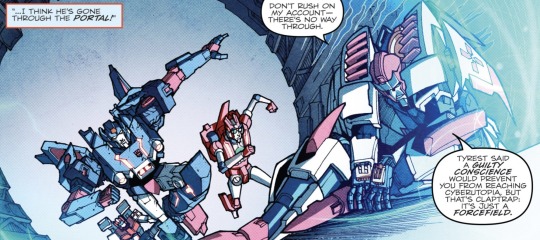
In light of this, Pharma’s flippant comments to First Aid make sense. He wasn’t being insensitive as much as he was goading First Aid. Pharma’s not stupid. First Aid had a massive rotary cannon on him, and Pharma knew exactly which emotional buttons to push to get him to pull the trigger.
Pharma wanted to die.
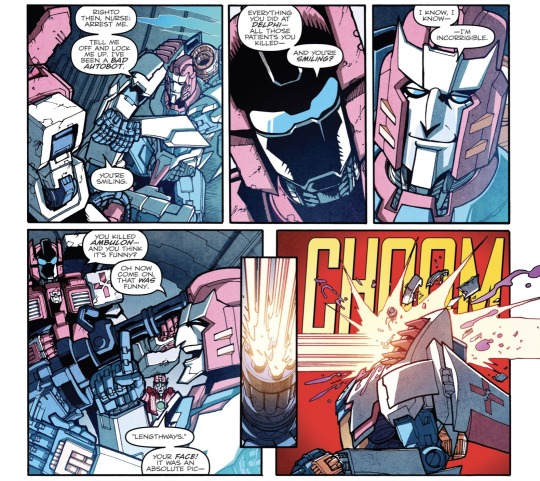
Adaptus
First, let me emphasize that Adaptus did not take possession of Pharma’s body. Instead, Pharma was the unwelcome guest:
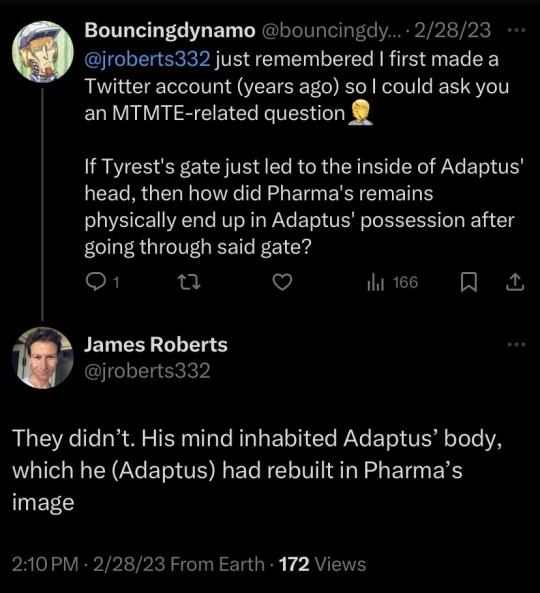
How Pharma ended up in Adaptus’ new body is a mystery, but whatever the case, Pharma didn’t pass on to the Allspark. Whether or not he had a choice can only be speculated.
First Aid had blasted Pharma’s head clean off, so whatever happened must have been related to the spark. Perhaps some residual spark energy was trapped in a body part that Adaptus repurposed, leaving Pharma tethered to the new body unwillingly.
Still, Pharma managed to assert his will and override Adaptus for a brief moment. Considering Adaptus was basically a god, this is impressive.
Based on Adaptus’ surprise at being interrupted, it seems he didn’t know Pharma was there. Why Pharma hadn’t tried to assert himself sooner is a mystery. Maybe Adaptus’ scheme was entertaining; maybe Pharma actually liked the company; or maybe he’d been waiting for an opportunity to get revenge on Tyrest for everything done to him back at Luna 1.
Sure enough, just like with Ratchet back on Luna 1, Pharma’s vengeful streak came out as soon as there was an opportunity.
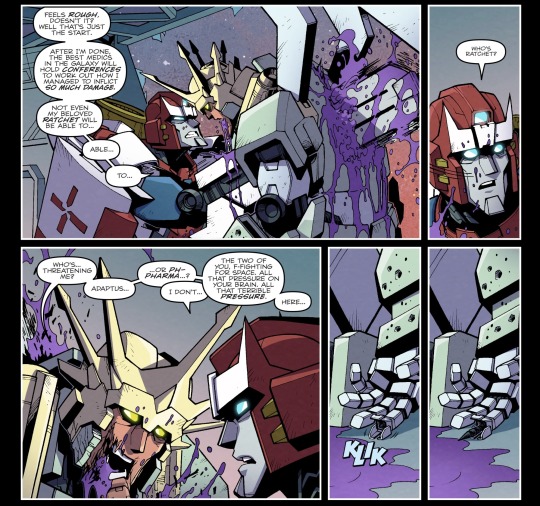
Unfortunately for him, this left him vulnerable, and Tyrest took advantage of the confusion:
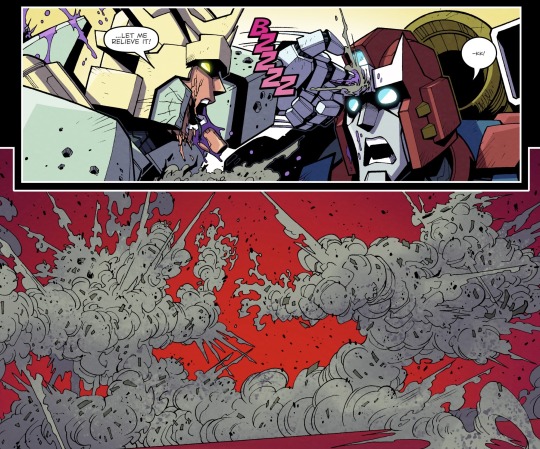
Conclusion
When someone reduces their world to narrow personal interests and one or a few very special people, their grip tightens around what little they have. They often become obsessive and possessive of the few things that make them feel alive, and their view of the world becomes increasingly more subjective and detached from the outside world. Pharma seems to have fallen into this trap.
Even so, in the context of the circumstances, several of the decisions he made were rational—even if coldly so. Oftentimes, “extreme” rationality and self-preservation are villainized in fiction, and characters like Pharma who don’t automatically put themselves at great risk for anyone and everyone are villainized, or at least looked down on. Their choices are often regarded as less human, but rationality and self-preservation are just as human as compassion and self-sacrifice.
Ultimately, Pharma was trapped and pushed over the edge into “insanity” by Tarn’s cruelty, but his own choices made from a place of pride determined how he fell, and how far he fell. It was a perfect storm of Tarn’s mind games and Pharma’s intellectual arrogance, excessive self-confidence, obsessive nature, and stubborn grip on the kind of future he wanted for himself.
Pharma is yet another Icarus who flew too close to the sun and paid dearly for it, and while JRO/the narrative could have given this Icarus better wings, that doesn’t change the fact that he chose to fly so high.
***
Many thanks to anyone who made it to the end of this monster of a post.
-tosses a Rodimus Star at you-
#look who finally finished this thing#idw transformers#idw1#maccadam#MTMTE#lost light#idw pharma#pharma#tf idw character analysis#tf idw meta#dr. fancy hands#nova’s nerding out again
502 notes
·
View notes
Text
ISAT and Ludonarrative Harmony: Combat is a Storytelling Tool
Or: How Siffrin is stuck in the endgame grind, forever
Please Note: This is primarily aimed at an audience that already played In Stars and Time, because I am bad at explaining things, and it's good to already know what the fuck I'm talking about. I tend to only bring up game elements as I want to talk about them.
Spoilers for.... all of ISAT! Especially Act 5!
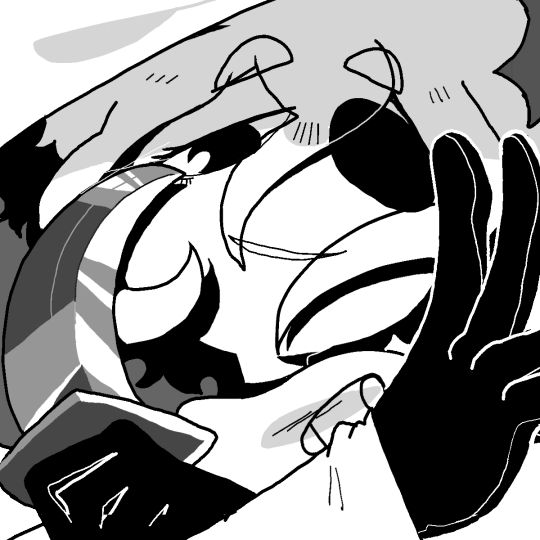
(image to show how i feel posting this and as an attention grabber over my wall of text)
To pull a definition of ludonarrative harmony out of a hat, game writer Lauryn Ash defines it as follows:
Ludonarrative harmony is when gameplay and story work together to create a meaningful and immersive experience. From a design implementation perspective, it is the synchronized interactions between in-game actions (mechanics) and in-world context (story).
It is, generally speaking, how well game mechanics work hand in hand with the story. I, personally, think ISAT is an absolute masterclass of it, so I want to take a look at how ISAT specifically uses its battle system to emphasize Siffrin's character arc and create organic story moments. I want you to keep this in mind when I talk here.
So, skills, right? If you've played any turn-based RPG, you know your Fire spells, your "BACKSLASH! AIRSLASH! BACKSLASH!" and the many ways to style those.
Well, what does casting "Fire" say about your character? Not all that much, does it? Perhaps you'll have typical divisions. The smart one is the mage, the big brawny one is your tank, the petite one's the healer. And that's the barebones of ISAT's main party, but it's much more than that.
Every character's style of combat tells you something about them. Odile, the Researcher, is the most well-travelled and knowledgable of the bunch. She's the one with the expertise to keep a cool head and analyze the enemy, yet also able to use all three of the Rock-Paper-Scissors craft types.
To reflect her analytical view of things, all her skill names are just descriptive, the closest to your most bog-standard RPG. "Slow IV" or "Paper III" serve well to describe their purpose. The high number of the skills gives the impression there were three other Slow skills beforehand - fitting, considering the party starts at level 45, about to head into the final dungeon. She's also the oldest, so she's the slowest of the bunch.
Isabea, the Fighter, has all his skills in exclamation points. "YOUR TURN!!!" "SO WEAK!!!" "SMASH!!!" they're straightforward, but excited. He's a purposefully cheerfull guy, so his skills revolve around cheering on his allies. He's absolutely pumped to be here, and you see that from his skill names alone.
Mirabelle, the Housemaiden, is an interesting case. She's by all means the true protagonist of this tale - She's the one "Chosen by the Change God," the only one who survived the King's first attack, the only one immune to his ability to freeze time, the only dual-craft type of the game - just a lot of things. And her skill names reflect that facade she puts on herself - she can do this, she can win! She has to believe it, or else she starts doubting. This is how you get "Jolly Round Rondo" and "Mega Sparkle Heal" or "Adorable Moving Cure." She's styled every bit a sailor scout shojo heroine, and her moveset replicates the naming conventions of "In the name of the moon, I'll punish you!"
Even Bonnie, the Kid, who can't be controlled in combat, has named craft skills. And they very much reflect that Bonnie is, well, a kid. "Wolf Speed Technique" or "Thousand Blows Technique" are very much the phrasings of a child who learned one complicated word and now wants to use it in everything to seem cooler than they are, which is none, because they're twelve.
Siffrin's skills are all puns.
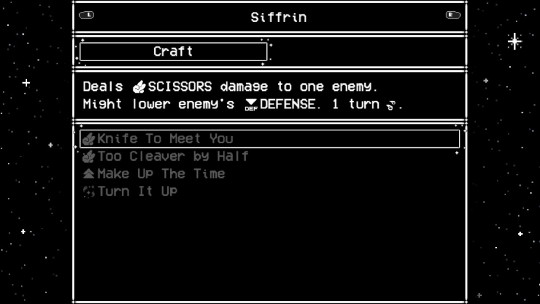
You have an IMMEDIATE feel for personality here. Between "Knife to Meet You!" and "Too Cleaver by Half," you know Siffrin's the type to always crack a joke no matter the situation, slinging witticisms around to put Sonic the Hedgehog to shame. It's just such a clever way to establish character using a game mechanic as old as the entire history of RPGs.
This is only the baseline of the way the combat system feeds into the story, though.
The timeloop, of course, feeds into it. Siffrin is the only character who retains experience upon looping, whereas all other characters are reset to their base level and skills. And it sucks (affectionate).
You're extremely likely to battle more often the earlier in the game you are - after all, you need the experience (for now.) Every party member contributes, and Siffrin isn't all that strong on their own, since they focus on raw scissor type damage with the addition of one speed buff. (Of course it's a speed buff. They're a speedy fucker. Just look at him).
At first, the difference in level between Siffrin and the rest of the group is rather negligible. Just a level or two. Just a bit more speed and attack. And then Siffrin grows further and further apart. Siffrin keeps learning new skills. He gets a healing skill that doubles as an attack boost, taking away from both Mirabelle's and Isabeau's usefullness. He gets Craft skills of every type that even give you two jackpot points instead of one - thus obliterating Odile's niche. Siffrin turns into a one-person army capable of clearing most encounters all on their own.
Siffrin's combat progression is an exact mirror of story progression - as their experience inside the loops grows, they also grow further and further away from their party. The party seems... weaker, slower, clumsier. Always back at their starting point, just as all of their character arcs are reset each loop. Never advancing, always stagnant. And you have Siffrin as the comparison post right next to them.
I also want to point out here a change from Act 2 to Act 3 - Siffrin's battle portrait. He stops smiling.
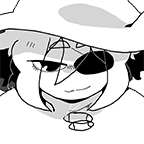
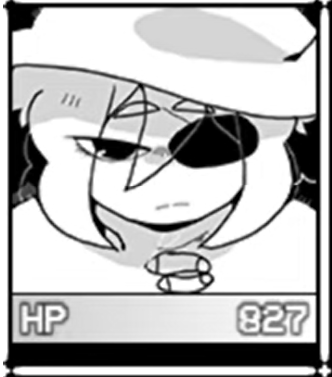
Battles keep getting easier. This is true both for the reason that Siffrin keeps growing stronger even when all enemies stay the same, but also for the reason that you, the player, learn more about the battle system and the various encounters, until you've learned perfect boss clear strategies just from repetition. Have you ever watched a speedrunner play Pokemon? They've played this game so many times, they could do it blindfolded and sleeping. Your own knowledge and Siffrin's new strength work in tandem to trivialize the game's entire combat system as the game progresses.
(Is it still fun? Playing it over, and over, and over again? Is it?)
You and Siffrin are in sync, your experience making everything trivial.
As time goes on, Siffrin grows to care less and less about performing right for their party and more and more about going fast. A huge moment in his character is marked by the end of Act 3; because of story events I won't delve too deeply into, Siffrin has grown afraid of trying something new. And his options of escape are closing in. They need an answer, and they need it fast. He doesn't have the time or patience to dumb himself down, so you unlock one new skill.
It doesn't occur with level up, or with a quest, or anything at all. At the start of Act 4, it simply appears in Siffrin's Craft skills.
(Just attack.)
No pun. No joke. Just attack. Once you notice, the effect is immediate - here you have it, a clear sign of how jaded Siffrin has become, right at every encounter. And it's a damn good attack, too! The only available attack in the game that deals "massive" damage against all enemies. Because it doesn't add any jackpot points (at least, it's not supposed to), you set up a combo with everybody else, but Siffrin simply tears away at the enemy with wild abandon. Seperated from the rest of the party by the virtue of no longer needing to contribute to team attacks (most of the time. It's still useful if they do, though).
Once again, an aspect of the battle system enhances the degree of separation between Siffrin and the static characters of his play. You're incentivized to separate him, even.
Additionally, there are two more skills to learn. They're the only skills that replace previous skills. You only get them at extremely high levels, the latter of which I didn't even reach on both of my playthroughs.
The first, somewhere in the level 70 range, Rose Printed Glasses, a paper type craft skill, is replaced by Tear You Apart. It's still a pun about paper, but remarkedly more vicious.
The second is even more on the nose. At level 80, In A While, Rockodile!, a rock type craft skill, is replaced by the more powerful Rock Bottom.
I didn't get to level 80. If you do, you pretty much have to do it on purpose. You have to keep going much longer than necessary, as Siffrin is just done. And the last skill he learns is literally called Rock Bottom.
What do I even need to say, really.
Your party doesn't stay static forever, though.
By doing their hangout quests, side quests throughout the loops that result in Siffrin and the character having a heart to heart, all of them unlock what I'd call an "ultimate" skill. You know the type - the character achieved self-fulfillment, hit rank 10 on their confidant, maxed out their skill tree, and received a reward for their trouble.
These skills are massively useful. My favorite is Odile's - it makes one enemy weak to all Craft types for several turns, which basically allows you to invalidate the first and third boss, as well as just clown on the King, especially once Siffrin starts racking up damage.
But the thing is. In Act 3, when you first get them, yeah, they're useful. But... do you need them? After all, they're such a hassle to get. You need to do the whole character quest again, you can't loop forward in the House or you'll lose them. If you want to take these skills to the King, you need to commit. Go the full nine-yards and be nice to your friends and not die and not skip forward or skip back. Which is annoying, right?
Well, I sure did think so during Act 4. After all, a base level party can still defeat the King, just with a few more tricky pieces involved. Siffrin can oneshot almost all basic enemies by the time of Act 4. It's this exact evalutation that you, the player, go through everytime you return to Dormont. Do I want this skill, still? Would it not be faster to go on without it? I'm repeating myself, but that's the thing! That's what Siffrin is thinking, too!

I also want to take a quick moment to note, here - all skills gained from hangouts have art associated with them, which no other skills do. This feature, the nifty art, hammers home these as "special" skills, besides just how they're unlocked.
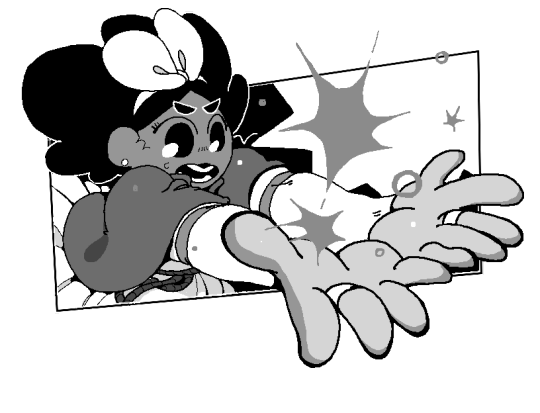
Siffrin also has one skill with associated art.
Yeah, you guessed it, it's (Just attack.)
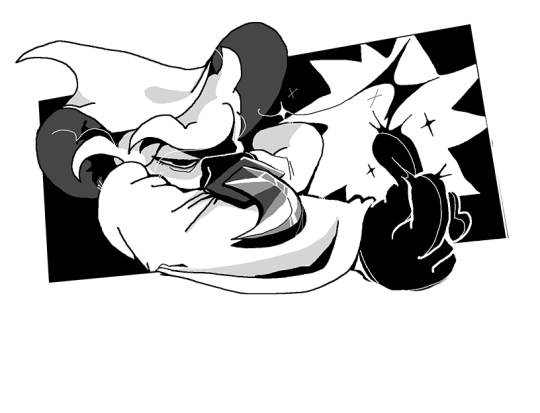
At first, helping the characters is tied to a hefty in-game reward, but that reward loses its value, and in return devalues helping Siffrin's friends every loop. It's too tedious for a skill that'll make a boss go by one turn faster. You, the player, grow jaded with the battle system. Grinding experience isn't worth it, everybody's highest levels are already recorded. Fighting bosses isn't worth it, it's much faster to loop forward.
Isn't this what all endgame in video games looks like? You already beat the final boss, and now... what challenge is left? Is there a point to keep playing? Most games will have some post-game content. A superboss to test your skills against, but ISAT doesn't have any of that. You're forever left chasing to the post-game. That's the whole point - to escape the game.
As most games get more difficult as time passes, ISAT only gets easier. The game becomes disinterested in expanding its own mechanics just as I ran out of new things to fight after 100%-ing Kingdom Hearts 3. Every encounter becomes a simple game of "press button to win."
The final boss just takes that one up a notch.
Spoilers for Act 5 ahead boys!
In Act 5, Siffrin utterly loses it. His last possible hope for escape failed him, told him there's nothing she can do, and Siffrin is trapped for eternity. So of course, they go insane and run up the entire House without their party.
This just proves what you already knew - you dont need the party to proceed. Siffrin alone is strong enough. And here, Siffrin has entirely shed the facade of the jokester they used to be. Every single skill now follows the (Just attack.) naming conventions. Your skills are: (Paper.) (Rock.) (Scissors.) (Breathe.)

To the point. Not a moment wasted, because Siffrin can't take a moment longer of any of this. Additionally, his level is set to 99 and his equipment becomes fixed. You can't even pick up items anymore! Not that you needed them at this point anyway, right? Honestly, I never used any items besides the Salty Broth since Act 2, so I stopped picking items up a long time ago. Now you just literally can't.
Something I've not talked about until now - one of the main equipment types in this game are Memories, gained for completing subquests or specific interactions and events. They all by and large have little effects - make Odile's tonics heal more, or have Mirabelle cast a shield at the start of combat. For the hangout events, you also gain an associated memory that boosts the characters' stats by 30. It lets them keep up with Siffrin again! A fresh wind! Finally, your party members feel on par with you again!
...For a time. And just like that, they're irrelevant again, just as helping them gave Siffrin a brief moment of hope that the power of friendship could fix everything.
In Act 5, your memory is set to "Memory of Emptiness." It allows you to loop back in the middle of combat. You literally can't die anymore. Not that Siffrin could've died by this point in the first place, unless you forgot about the King's instant-kill attack. This one memory takes away the false pretense that combat ever had any stakes. Siffrin's level being set to 99 means even the scant exp you get is completely wasted on them. All stakes and benefits from combat have been removed. It has become utterly pointless.
Frustrating, right? It's an artistic frustration, though. It traps you right here in Siffrin's shoes, because he hates that all these blinding Sadnesses are still walking around just as much. It all inspires just a tiny fraction of that deep rolling anger Siffrin experiences here in the player.
And listen, it was cathartic, that one time Siffrin snapped and stabbed the tutorial Sadness, wasn't it? Because who enjoys sitting through the tutorial that often? Siffrin doesn't. I don't, either.
So, since combat is an useless obstacle now meant to inspire frustration, what do you do for a boss? You can't well make it a gameplay challenge now, no. The bosses of Act 5 are an emotional challenge: a painful wait.
First, Siffrin fights the King, alone. This is already nervewracking because of one factor - in every other run, you need Mirabelle's shield skill, or else you're scripted to die. You're actually forced to fight the King multiple times in Act 3, and have to do it at least once in Act 4, though you'll likely do it more. Point is: you know how this fight works.
You know Siffrin's fight is doomed from the outset, but all you can do is keep slinging attacks. Siffrin is enough of a powerhouse to take the King's HP down, what with the healing and buff skills they have now, not to even mention you can just go all in on damage and then loop back.
(And no matter which way you play it, whether you just loop or use strategically, it reflects on Siffrin, too. Has he grown callous enough not even death will stop their mission? Or does he still avoid pain, as much as he can?)
This fight still allows you the artifice of even that much choice, not that it matters. The other shoe drops eventually - Siffrin becomes slower, and slower. Unsettling, considering this game works on an Action Gauge system. You barely get turns anymore. The screen gets darker, and darker. Until Siffrin is frozen in time, just as you knew he had to be, because you know how this encounter works, know it can't be cleared without Mirabelle.
And, then, a void.
Siffrin awakens to nothingness. The only way to tell you've hit a wall is if Siffrin has no walking animation to match your button inputs. You walk, and walk, until you're approached by.... you. The next enemy encounter of the game, and Siffrin's absolute lowest point: Mal Du Pays.

Or, "Homesickness," in english. If you know the game, you know why it's named this, but that's not the point at the moment.
Thing is, where you could damage the King and are damaged in turn, giving you at least a proper combat experience, even if its doomed to fail, Mal Du Pays has no such thing.
You can attack. You can defend. But it is immune to all attacks. And in return, it does nothing. It's common, at least, for undefeatable enemies to be a "survive" challenge, but nope. The entire fight is "press button and wait." Except, remember the previous fight against the King? The entire time, you were waiting for the big instant death attack to drop. That feeling, at least for me, carried forward. I was incredibly on edge just waiting for the other shoe to drop. And, as is a pattern, Siffrin is, too. As Siffrin's attacks fail to connect, they start talking to Mal Du Pays.
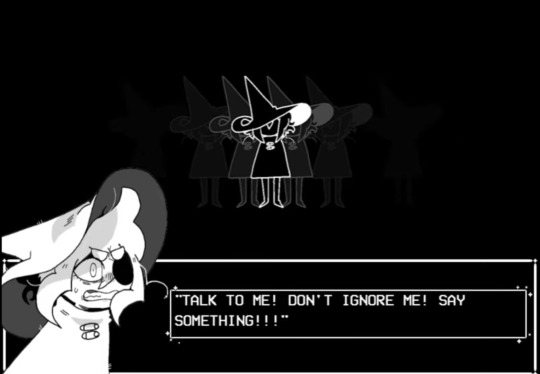
But he gets no response, as you get no attacks to strategize around. The wait for anything to happen is utterly agonizing. You and Siffrin are both waiting for something to happen. This isn't a fight. It just pretends to be. It's an utter rugpull, because Siffrin was so undefeatable for most of Act 4 and all of Act 5 so far. It's kind of terrifying!
and it does. It finally does something. Ma Du Pays speaks, in the voice of Siffrin's friends, listing out their deepest fears. I think it's honestly fantastic. You're forced to just sit here and listen to Siffrin's deepest doubts, things you know the characters could not say because it references the timeloops they're all utterly unaware of. This is all Siffrin, talking to himself. And all you, all Siffrin, can do, is keep wailing away on the enemy to no effect whatsoever.
So of course this ends with Siffrin giving up. What else can you do?
And then Siffrin's friends show up and unfreeze them and it's all very cool yay. The pure narrative scenes aren't really the main focus but I want to point out here:

A) Mirabelle is in the first party slot here, referencing how she's the de facto protagonist, and Bonnie fills in the fourth slot left empty, which shows all characters uniting to save Siffrin
B) this is the only instance of the other party members having act specific battle icons: they're all smiling brightly, further pushed by the upbeat music
C) the reflecting shield Mirabelle uses to freeze the King uses a variation of her hangout skill cut in, marking it as her true "final" skill and giving the whole fight a more climatic feeling.
It's also a short gameplay sequence with Siffrin utterly uninvolved in the battle. You can't even see them onscreen. But... it feels warm, doesn't it? Everybody coming together. Siffrin doesn't have to fight anymore.
At last, the King is defeated. Siffrin and co. make for the Head Housemaiden, to have her look at Siffrin's sudden illness. Siffrin is utterly exhausted, famished, running a fever. And this isn't unexpected - after all, their skills in Act 5 had no cooldown. For context, instead of featuring any sort of MP system, all skills work on a cooldown basis, where a character can't use it for a certain number of turns. The lowest cooldown is actually Siffrin's Knife to Meet You, which has a cooldown of 1. In universe, this is reasoned as the characters needing a break from spamming craft in order to not exhaust themselves.
Siffrin's skills in Act 5 having no cooldown/being infinitely spammable isn't a sign of their strength - it's a sign that he refuses to let himself rest in order to rush through as fast as possible.
Moving on, Siffrin panics when seeing the Head Housemaiden, because seeing her means one thing: the end. Prior to this in the game, every single time you beat the King, the loop ends when you talk to the Head Housemaiden.
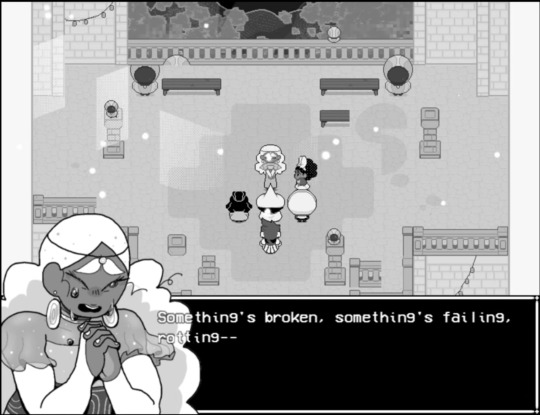
Reality breaks down, the whole shebang. It's here that Siffrin realizes - they don't want the loops to end, because the end of their journey means their family will leave, and he'll be alone again. The happiest time of his life will be over.
Siffrin goes totally ballistic, to say the least.
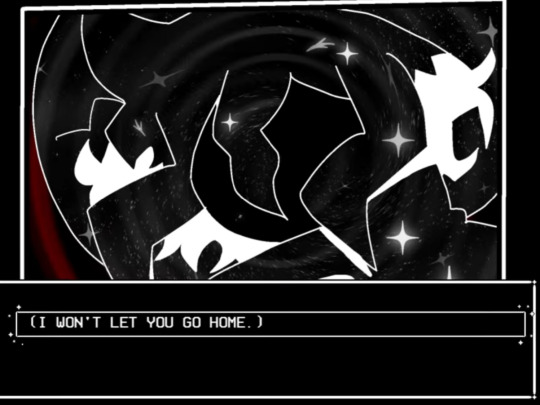
As it turns out (and was heavily foreshadowed narratively), Siffrin has been using Wish Craft to subconciously cause the timeloop because of their abandonment issues. It's rather predictable if you paid attention to literally anything, but it's extremely notable how heavily Siffrin is paralleled to the King, the antagonist they swore to kill by themself at the start of Act 5. The King wants to freeze Vaugarde in time because it is, in his mind, "perfect," for accepting him after he lost his home - a backstory he shares with Siffrin.
Siffrin has become the exact antagonist he swore to kill, and it's shown by how the next fight utterly flips everything on its head.
Siffrin is the final boss.

In a towering form made of stars, Siffrin looks down at their friends. His face is terrified, because of his internal conflict; he can't hurt his friends, but he can't let them go, either. The combat prompt is simply changed to "END IT!"
This fight is similar to the previous, in that you just need to wait a certain number of turns until its over. However, this time, it's not dreadful suspense. It's... confusion, and hesitance.
You have two options for combat: Attack your friends, or attack yourself.
And... you don't really want to do either, I think. I certainly don't. But what else can you do? It's Siffrin's desires clashing in full force. Attack your friends, and force them to stay? Or attack yourself, and let them go safely without you?
Worth noting, here - when you attack Siffrin's friends, you can't harm them. Isabeau will shield all attacks. And when you attack yourself, Mirabelle will heal you back to full. And the friends don't... do anything, either. How could they? Occasionally, Mirabelle heals you and Isabeau shouts words of motivation, but the main thing is...
(Your friends don't know what to do.)
None of them want to harm Siffrin. Both sides simply stare at each other, resolute in their conviction but unwilling to end it with violence. It's of note that this loop, the last one, is the only loop where the King isn't killed. Just frozen. And now here is Siffrin, clamoring for the same eternity the King was. Of course everything ends in a tearfilled conversation as Siffrin sees their friends won't leave him, even after the journey ends, but I still have to appreciate this moment.
Siffrin is directly put in the position with their friends as his enemies, forced to physically reckon that keeping them in this loop is an act of violence, against both their friends, and against himself.
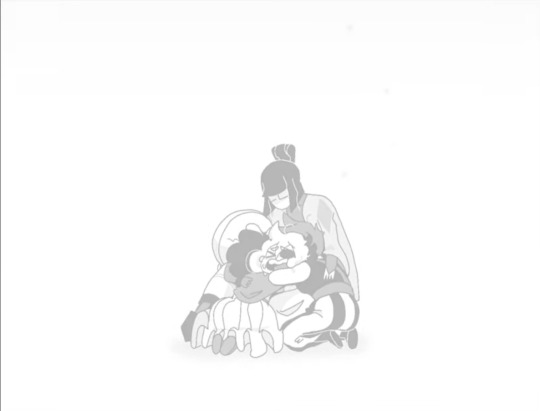
It's a happy ending. But... what does it mean?
Of course, ISAT is obviously about the fear of change. Siffrin is afraid of the journey ending, and of being alone. However, ISAT is also a game about games. Siffrin is playing the same game, over and over, because it's comforting. It's familiar. It's nice, to know exactly what happens next. These characters might just be predictable lines of dialogue, but... they feel like friends. Have you ever played a game, loved it, put countless hours into it, but you never finished it? Because you just couldn't bear to see it end? For the characters to leave your life, for there to be a void in your heart where the game used to be?
After all, maybe it became part of your routine! You play the game every day, slowly chipping away at it for weeks at a time. For me, I beat ISAT in four days. It utterly consumed me during this time. I had 36 hours of playtime by the end. Yeah, in that week, I did not do much more than play ISAT.
And once i beat it, i beat it, again. I restarted the game to see the few scenes I missed, most specifically the secret boss I won't talk about here. I... couldn't let go of the game yet. I wanted to see every scrap I could. I still do. I'm writing this, in part because I still do. It's scary to let go.
Ever heard the joke term of "Postgame Depression?" It's when you just beat a game, and you're suddenly sad. Maybe because the ending affected you emotionally and you need to process the feelings it invoked, or you search for something that can now fill your time with it gone.
The game ends, for real this time, the last time you talk to the Head Housemaiden. But Siffrin gets... scared. What if everything loops back again? And so, his family offers to hold his hand. They face the end, together.
For all loops, including the ending, you never see what happens after. After they leave the loop for good. Because the loop is the game itself. It's asking you to trust that life goes on for these characters, and it holds your hand as it asks you to let go. There's a reason for Siffrin's theater metaphors. He is the actor, and the director, asking everyone to do it over one more time. He's a character within the game, and its player.
There's a reason I talked about endgame content. This, the way it all repeats, there's nothing new, difficulty and stakes bleed away as you snap the game over your knee - it's my copy of White 2 with two hundred hours in it. It's me playing Fire Emblem Awakening in under 3 hours while skipping every cutscene. Are you playing for the sake of play, for the sake of indulging in your memories, because you're afraid of the hole it'll leave when you stop?
Of note: the narrative never condemns Siffrin for unwittingly causing their own suffering. He's a victim of circumstance. It's seen as endearing, even, that Siffrin loves their friends to the point of rather seeing the world destroyed than them gone. But Siffrin is also told: we'll stay with you for now, but we'll part ways eventually. And one day, you'll have to be okay with it.
Stop draining the things you love of every ounce of enjoyment just because you're afraid of what happens next. I'm not saying to never play your favorite games again. Playing ISAT a second time, I still had a lot of fun! I saw so many new things I didn't before, and I enjoyed myself immensely, reading the same dialogue over and over. But... it makes me look at other games I love and still play, and makes me ask... is this still fun? Do I still need to play this game to enjoy it? Even writing this is an afterimage of my enjoyment, but it's a new way to interact with the game, to analyze it through this lens. Fuck, man, I write fanfiction. Look at me.
All of this, fanart, fanfic, analysis, is a way to prolong that enjoyment without making yourself suffer for it. Without just going through the motions of enjoyment without actually experiencing any. But one day, the thing you love won't be fun to talk and write and draw about. And it's okay. You'll have new things to love. I promise.
In the end.... I'm certain I'll replay ISAT one day. Between great writing, art, puzzles and unresolved mysteries, it's my shoe-in for game of the year.
But I won't replay it for quite some time. I've had enough, for now, so I let my love take other forms.
Siffrin is never condemned, because love is no evil. Be it love for another person, or for a game. And please, if you're overempathetic - it's still a game, at the end of the day. The great thing about games is that you can always boot them up again, no matter how long its been.
A circle within a circle indeed.
To summarize:
The repetitiveness of ISAT's combat, lack of new enemies, and Siffrin's ever increasing strength eventually allows you to snap the combat over your knee, rendering it irrelevant and boring. Though this may seem counterproductive at first, it perfectly mirrors how Siffrin has also grown bored with these repeated encounters and views them only as an obstacle to get past. The reflection of Siffrin's own tiredness with the player's annoyance increases the compassion the player has for Siffrin as a character.
Additionally, the endgame state of the combat system serves as commentary on the state of a favorite game played too often, much like how Siffrin has unwittingly trapped themself in the loop. Despite the game having no more challenge or content left to over, a player might return to their favorite game anyway, solely to try and recreate the early experience of actually having fun with it. This ties into ISAT's metanarrative about the fear of change and refusal to let go of comfort even when the object (here, your favorite video game) offering that comfort has become utterly bereft of any substance to actually engage with. Playing for the sake of playing, with no actual investment to keep going besides your own memories.
Later on, stripping away even the pretense of strategy for a "press button and wait" format of final bosses highlights the lack of options at Siffrin's disposal and truly forces the player into their shoes. Truly, the only way to win is to stop playing.
#feli speaks#in stars and time#isat#isat spoilers#lays down on floor. it's done. it's done#i actually narrowed down in scope to just focus on the combat by the way. and this is like. several thousand words
2K notes
·
View notes
Text
Rating primarchs based on how good of a boyfriend they would be
full send no context
─── ⋆⋅ ♰ ⋅⋆ ───
Horus : 8/10
He’s a nice guy for the most part, very charismatic and though very goal focused he’s also kind and open to those he’s closest to. Outwardly, he’s very straightforward, stern, and absolutely ruthless to his enemies. There’s humanity within him though, and he won’t keep his friendly, loving demeanor away from those who deserve it. Find him at a celebratory event, drunk with Sanguinius, moments in which he’s full of nothing but laughter and love for his brothers and the one who stands beside him. His love language is quality time.
Leman Russ : 4/10 (negotiable)
Though he knows love, it seems to be quite strictly familial. He’s described often as ruthless and barbaric, naive and braggish. If you can put up with things like that, I’m sure he would be a fine boyfriend. Similarly enough though, he’s had many women try to court him all at once, and successfully. I can’t promise his loyalty if someone better looking comes along, as no one ever taught him the importance of that. Outside of the constant, lingering fear of replacement, he can have his caring and understanding moments, occasionally bringing you gifts from crusades and sieges on other planets. Maybe his loyalty to the emperor would apply to his lover too, if you tell him what it means to you. His love language is gift giving.
Ferrus Manus : 7/10
Rage is his fatal flaw if we’re being honest. Not towards you, but towards battle. Toward you I imagine he would be more straightforward and honest, though trustworthy and strong willed to make your relationship work. Loyalty will never ever ever be an issue with him, but it seems like he spends more time with war and battle than he does you. He spends time with you when he can, though, and he truly does care. Points off for his temper. He gave his brothers personalized gifts, and i’m sure he would go through many lengths to do the same for you. His love language is gift giving.
Fulgrim: 6/10
He’s constantly trying to be perfect, and he wants whoever he’s with to be perfect too. A lot of the time, it gets to his head. He can be incredibly ignorant quite often, and isn’t very considerate of your feelings. You’re more of an idol to him, a model. You’re human, so he sees you as perfect, something he and his people should strive to be like. Youre idealized, and under rose tinted lenses, this looks a lot like love… Lots of acts of service and gift giving.
Vulkan : 10/10
The only man you will ever need point blank period. He’s patient, he’s empathetic, he’s kind, he’s humane. He’s incredibly easy to love, and he truly is beloved. The Salamanders love you too, sometimes listening to your commands as if they were his. You’re respected as long as you’re under his arm. He wants to understand the way humans feel, especially understand the reason they wrap their arms around each other and sleep with their bodies entwined at night. His love language is physical touch.
Rogal Dorn : 6/10
He’s incredibly loyal, and also incredibly honest, but his seriousness can get in the way sometimes. You love him, very much, but there are times you get into petty arguments and he has to go consult Horus and Sanguinius for advice on what to do. He’s also very reserved at times, a lot like a single dad who’s just doing his best to keep his job and go about his day. Acts of service would be his love language.
Roboute Guilliman : 9/10
Guilliman is a great boyfriend, a great tactician, a great warrior, all of the above. The only reason i’d take a point off is because I believe he may be a little arrogant at times. He believes that his way is the right way, but he’s usually willing to listen to you and your concerns. He’s incredibly intelligent, very sympathetic and understanding of human trials and concerns, and he’s a lot like we are modern times. I think he would look for comfort in a significant other, and his love language is likely acts of service.
Magnus the Red : 3/10
Another man that I don’t recommend being with. He’s more arrogant than Fulgrim. When I said Guilliman believes his way is the right way, Magnus takes it a step up. He thinks he’s ALWAYS right. He cares, and he means well, but he’s way too much to put up with. Highly manipulative and self absorbed, don’t put yourself in that situation. He values knowledge more than he does you.
Sanguinius : 10/10
Besides the fact he’s a vampire, you’re probably the most safe with him. He genuinely cares for you and your well-being, and sleeping next to him at night with his wing draped over you is an absolute dream in a universe plagued by war. His sons may fall to their bloodthirst when they’re on the home ship, and Sanguinius is fast to wrap himself around his human partner and protect them from any and all harm. You hold him through his sorrow every time a mass of humans or his sons lose their lives, and you watch him kneel to offer you his loyalty and unconditional love rather than you offering it to him. He gives both physical touch and words of affirmation.
Lion El’Jonson : 7/10
Of course he has his moments where he can come off as aloof and paranoid, but that’s for the most part only on the battlefield. Outside, he’s incredibly charming and charismatic, but in a noble way. When his paranoia gets to him after an argument, he seeks out Sanguinius and Horus for advice, wanting nothing more to fix your relationship and solve whatever went wrong. He become more secretive as time goes on, but old habits die hard. I believe he’d offer acts of service.
Perturabo : 6/10
He’s incredibly smart, but finds relating to you and your human tendencies incredibly difficult. His moods can shift and change rapidly and violently, but I believe he means you no true harm. He would never hurt you intentionally, often opting to back away and give himself space, sometimes for days. He never returns to you without a mechanically engineered gift, though, one of his design. Alongside a very gentle hug and a conversation about how you care about him, what he loves. You love him, not for his usefulness to the emperor, but for him. His love language is definitely gift giving.
Mortarion : 8/10
He’s very confused as to why you would choose him. He’s disgusting, an abomination, he hated everything from psykers to his oppressors, what did anything matter if he would be left to the mercy of another oppressor anyways? All thoughts he had until he met you. He was cold and hateful to you at first, untrusting, and yet you showed him kindness. You showed him kindness over and over again. For once, it wasn’t just a one time thing. You’re the only thing in this universe who sees him as more than a warlord, more than the embodiment of death itself, so for you he has a soft spot. He hates the idea of having a human curl up next to him, absorbing his warmth and disease alike… and yet you do. You remind him that his touch is not deadly, and he too is capable of humanity. He will be more considerate of his decisions, because for once, something matters. His love language is physical touch, because he’s been deprived for so long, you’re the only one who allows him that piece of humanity.
Lorgar : 5/10
Does he love you? Does he not? No… He needs you… Maybe he just needs space actually.He loves you, he really does, and by god he tries his best, but when you’re as impulsive and indecisive as he is, it’s hard to know sometimes. If you’re okay with it working 50% of the time, maybe more maybe less, I’m sure you’ll be fine. His love language is… uh… well?
Jaghatai Khan : 7/10
Loyal, decently humble, and a relatively peaceful man. Outside of war, he has potential to be great to you. When war is his focus, however. Expect no attention, he’s a fierce warrior and needs to focus on his allegiance to the emperor, that’s what comes first. You follow very closely after, though! He’s quick to praise you for the things you do well and gently remind you of a better course of action when it comes to the things you don’t do too well. Acts of service enjoyer.
Konrad Curze : 2/10
DO NOT DATE THIS MAN. Konrad is a walking red flag. The self loathing, the anger, the angst, the general belief in humanity as a fallacy. He’s also incredibly violent, and may cause you serious harm if you ever managed to anger him. He’s a primarch, and you’re a human. Don’t you dare piss him off. I don’t know why anyone would realistically want that. Please continue to paint him as mean angry babygirl with a soft spot in your fics though. If you think you can fix him, you can’t. The emperor already tried.
Angron : 4/10
Before his conversion to chaos, Angron would’ve been a great boyfriend if we’re being honest. He was kind, compassionate, encouraging. He loved you when you were enslaved beside him, but once he became a primarch and lost everything, his beloved included, he became one of the most ruthless and cruel people out there until he succumbed to Khorne. He doesn’t remember you. His love language was words of affirmation.
Corvus Corax : 4/10
A very melancholic and depressed primarch. He’s very angsty and honestly a major drag to be around. He and Konrad, i feel like, would be better boyfriends to each other than either of them would be to you. Corvus isn’t as violent as Konrad, but he definitely carries on the hatred, the sorrow, and the bitterness. He’s also very sensitive, so expect to be met with either violence or a breakdown if you try to leave. 2 extra points because you may get to keep your life, his love language is words of affirmation, always followed by self deprecation.
Alpharius Omegon : 7/10
He’s they’re a great boyfriend to be honest, though very secretive, and that raises many questions. You don’t know that there are two of them. It’s a secret, not even one that you’re allowed to know the answer to. Alpharius is obviously the more dominant brother, the one who you think has a soft side. He doesn’t. That’s not him, that’s Omegon. Omegon is much more gentle, quiet, and quite honestly a little more touchy. Why? because you make him feel seen. Alpharius is used to the spotlight, so giving him every ounce of your attention feels like the usual, though he still enjoys it very much. Alpharius expresses love through acts of service and gift giving, while Omegon expresses love through words of affirmation and quality time. They make up for everything the other lacks, as long as you don’t know the massive secret they’re keeping from you…
#primarch x reader#primarch#warhammer 40000#warhammer 40k#warhammer 30k#warhammer 30000#horus lupercal x reader#horus lupercal#leman russ#leman russ x reader#ferrus manus#ferrus manus x reader#fulgrim x reader#fulgrim#vulkan x reader#rogal dorn#rogal dorn x reader#roboute guilliman x reader#roboute guilliman#magnus the red#sanguinius x reader#sanguinius#lion el'jonson#lion el’jonson x reader#perturabo#perturabo x reader#mortarion#mortarion x reader#konrad curze x reader#konrad curze
524 notes
·
View notes
Text
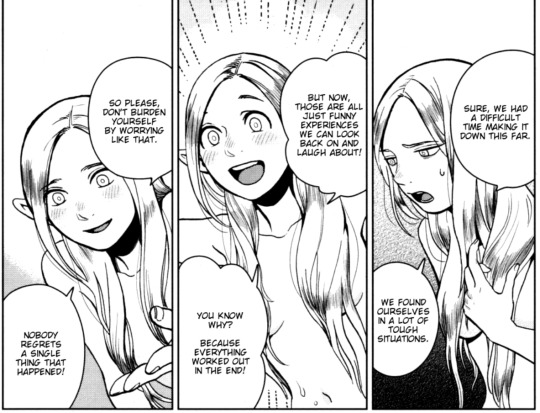
In chapter 28, Marcille lays out why the journey she's been on has been worth the pain: because they were able to bring Falin back. The injuries, the indignity, and the mess of it all - they are tolerable primarily in context of destination she believes she's reached at this point.
In truth, of course, the story is far from finished. In fact, I would argue that this is actually where hers really starts. This scene holds the seed of the very thing the Winged Lion will exploit to lead Marcille to become the Lord of the Dungeon. After all, with a desire as far reaching and deeply held as Marcille's, if the only acceptable outcome is success, what other choice does she have but to bargain with the infinite?
So let's talk about this idea - where it leads her, how Laios' path intersects with it, and how they both help each other move forward in the face of failure.
First though, I want to step back and talk about something else: the shapeshifter chapters.
With these chapters recently covered by the anime, there has, of course, come plenty of fun discussions about which version of each character belongs which other character's perceptions, and what that means.
One thing I've seen pointed out a few times is the fact that both Laios and Marcille's impressions of each other are based around Falin. Marcille's version of Laios is larger and more masculine, because those are the traits that stuck out to her in contrast to Falin. Laios' version of Marcille was directly inspired by her appearance and demeanor when resurrecting Falin.
So why is this important to a discussion about Marcille being focused on success? Well, it shows us where Laios and Marcille's relationship starts: built primarily around their shared love for Falin. It's from that shared beginning that they begin to learn about each other on their own terms.
And this is true for the whole group, to be clear. They are united by circumstance - love for a lost companion, a sense of responsibility, a desire for freedom - but they all grow and help each other beyond that circumstance. They help Senshi bury the ghosts of his past and eat some Hippogriff stew. They help Izutsumi open up to mutual love and friendship. And they learn so much about each other: about Chilchuck's family and Laios' love of monsters and Marcille's desires to live life alongside others.
In the particular case of Marcille and Laios, understanding each other is what lets them save each other. It is not through Falin that Laios talks Marcille down from the edge the Lion has brought her to, nor is it through her that Marcille comforts Laios after the demon is defeated, when it is still unclear how everything will work out.
In fact, it is very specifically the unknown fate of Falin that Marcille comforts him about.
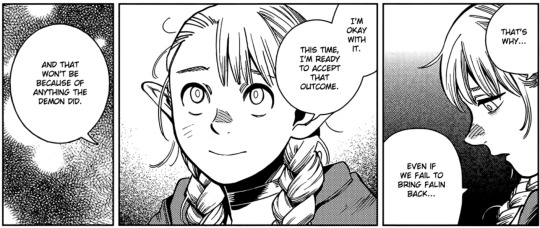
She is willing to accept the outcome - willing, now, to embrace the journey itself, rather than only accepting it as a means to an end.
This is a lesson she learns from Laios, and it's a lesson we watch Laios learn, too.
Just before making her deal with the Lion, Marcille recalls everything that led her to that moment. She lingers on the pain, recalling the worst of their journey:
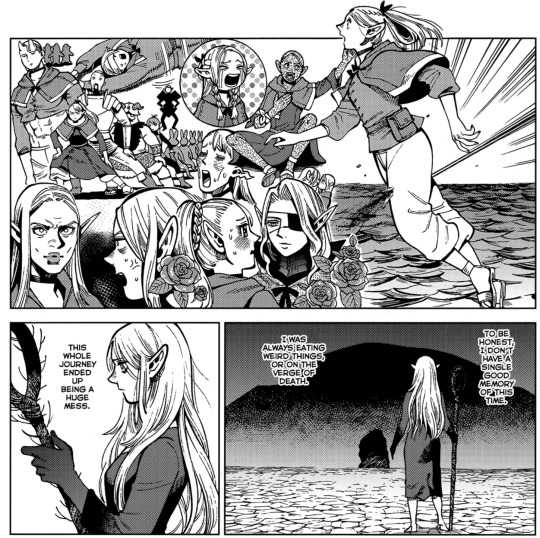
She only pushes through by remembering her goals: saving Falin, and equalizing the lifespans of her friends to match her own.
And yet, 10 chapters later, when reflecting on why she actually wants to see her goals through, it is the good parts of that very same journey that shine through.
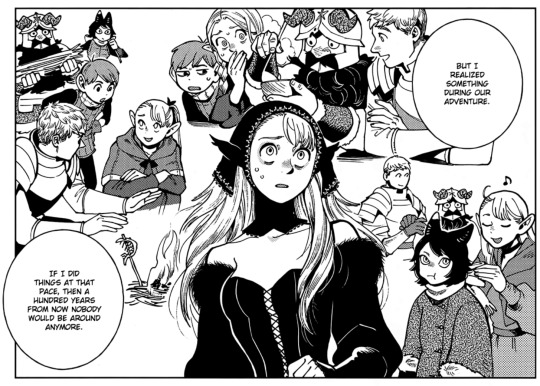
There's an inherent contradiction here, one which Marcille doesn't know how to face. How can the suffering that she tolerates also be the love that drives her forward? How can the loss that she's worked so hard to reverse also be the very circumstance that created a world she, now, cannot stand to give up?
And Laios confronts her with the truth. Because it just is.
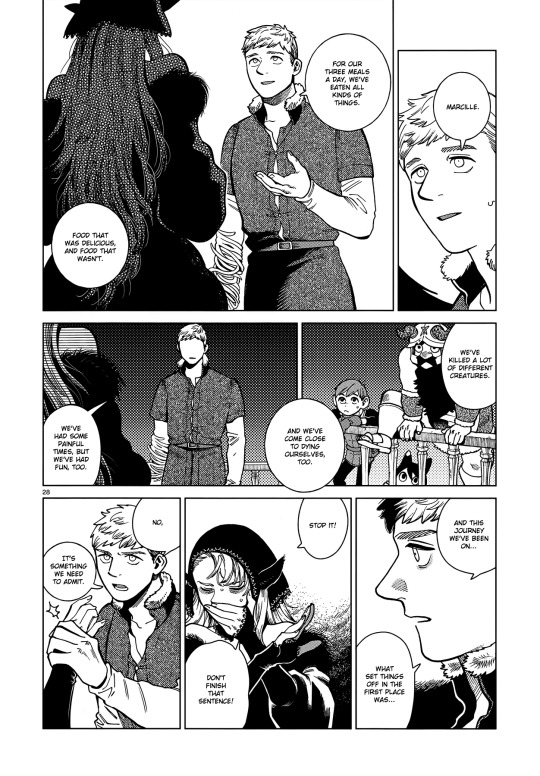
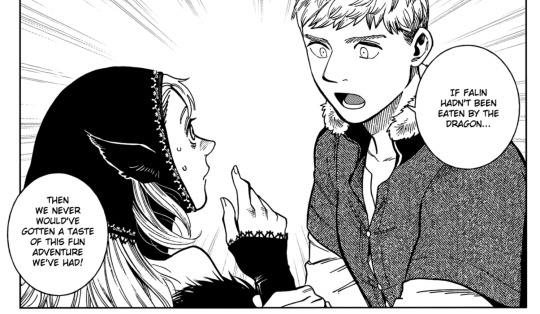
Losing Falin forced him to open up to others in a way he never had. It forced him to choose what he cares about, and in making that choice, it gave him the opportunity to be seen. To connect with others.
He has already had to come to terms with the fact that Falin's death has given him something - he would not have been able to kill her again if he hadn't.
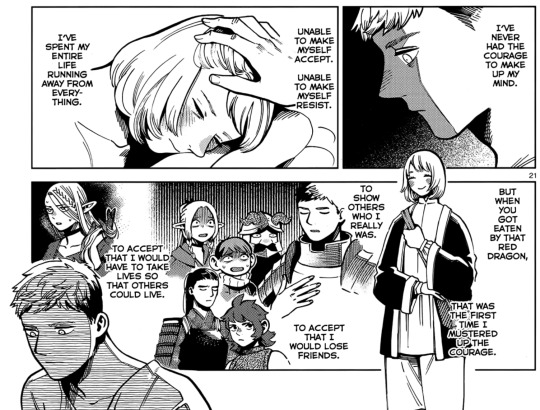
There is something here that is fundamental to Dungeon Meshi's understanding of what life even is. Like, I don't think it's a coincidence that part of Laios' speech to Marcille in chapter 85 is actually first seen in the chapter where they fight off ghosts.
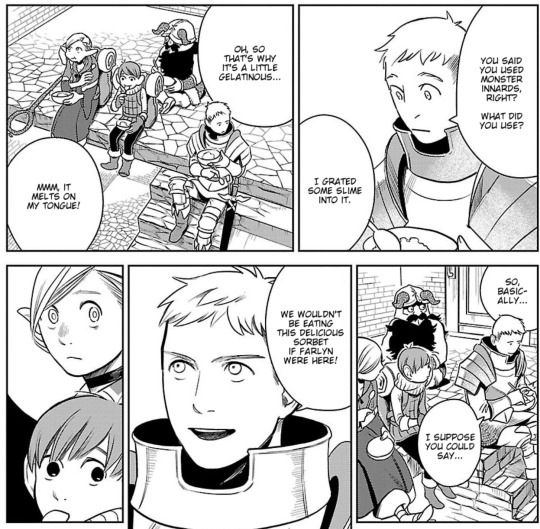
In 'Sorbet,' while possessed , Laios thinks that it would have been better if the dragon had eaten him, instead of Falin. The ghosts make people lose their will to live - they are dragged away from life.
When he's pulled back from that brink, Laios realizes that he can't move forward without accepting that she is gone. He even compares the way he was holding on to her to being possessed: it pulled him away from life, from the present moment.
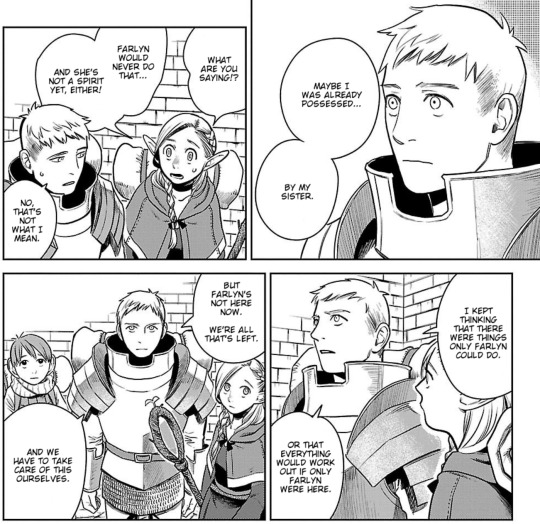
To carry on, he must accept what has been lost, and focus on protecting the life that they still have.
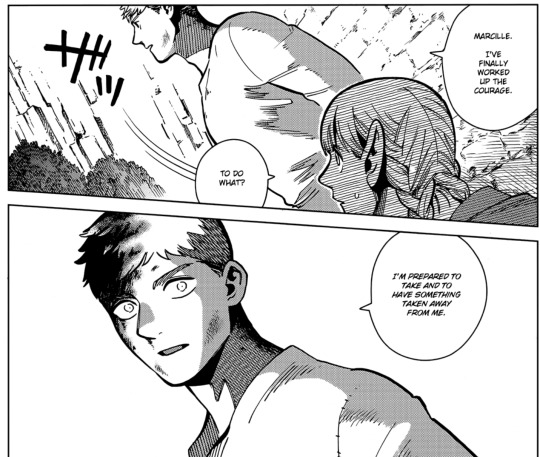
Like Marcille, he has to accept the contradictions of their journey. That life means eating, and eating requires death. That sometimes one must be selfish in order to be kind, and that selflessness can easily be twisted into to cruelty.
That loss will, inevitably, lead you to find happiness that you may not have found otherwise.
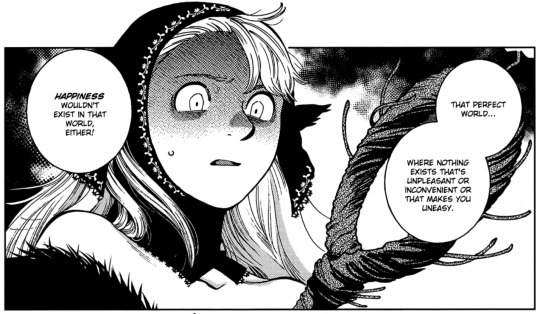
This is how he gets through to Marcille. And I think part of the reason he reaches her with these specific ideas is because those contradictions are baked so thoroughly into their relationship.
Marcille only met Falin after she had been left behind by Laios. Laios was able to reconnect with Falin because she left Marcille. They both met each other through Falin, and yet they only really got to know and care for one another after she died.
And of course, that's why Marcille uses the same ideas to comfort Laios, in the final chapter. It is because of Laios that she is able to accept the journey for itself, and not need the happy ending to justify its meaning to her.
Together, they help each other move forward, and accept that they may not be able to bring Falin back.
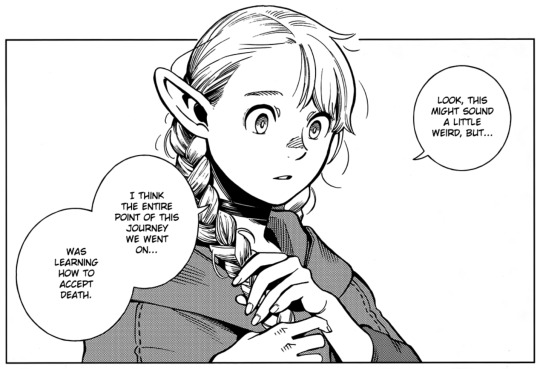
Which, if I'm being honest... I think this is the reason Falin can come back, narratively speaking, without the resurrection feeling like it takes away from the themes of the story.
After all, she doesn't do it for Marcille or Laios - she does it for her own sake. Her own hunger and her own desire to eat are the things that lead her back to life.
All three of them, together, end the story like this: not clinging to the things they are afraid to lose, but knowing they can choose to move forward together.
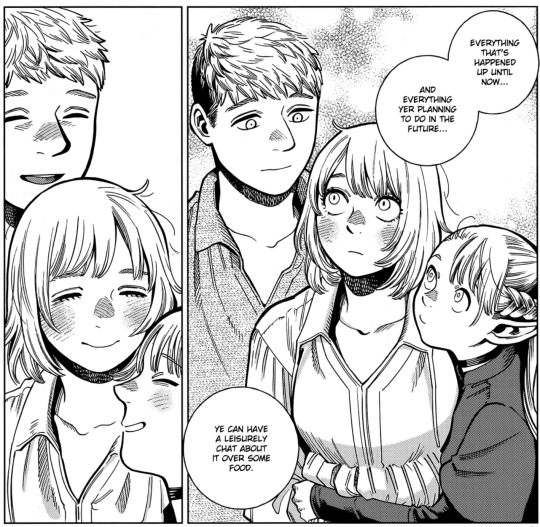
And, importantly, this happy ending is no longer the thing that gives the journey meaning. Rather, it is the privilege of the journey itself that is her happy ending: the chance to walk alongside others in the time they have, to get to know each other, and to eat well.
#dungeon meshi#delicious in dungeon#marcille donato#laios touden#falin touden#dungeon meshi spoilers#dunmeshi analysis#for anyone keeping track I'm on pdt so it IS still the same day that I said I'd post it on#PUT DOWN THE TOMATOES
978 notes
·
View notes
Text
JASON TODD VS. DABI: WHY NOT ME?
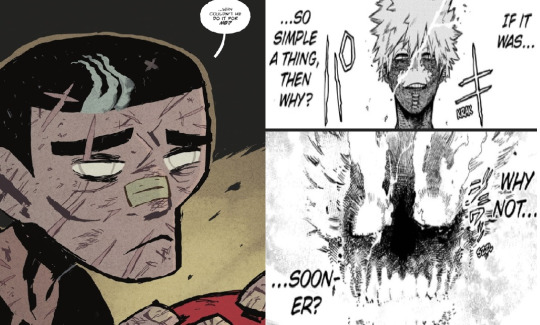
"You haven't been here long but you've seen him, right? The batman. The batman. He lives in darkness, to find the helpless and bring them into the light. So I have to wonder...why couldn't he do it for me?" The Boy Wonder: Issue #2
This is the story of the boy who didn't get saved. The story of a boy who really ought to have been saved. Of course, every victim deserves to be saved, but this boy was the son of a superhero. Can a hero who saves everyone, but fails to save his own son really be called a hero? As for the son, how does it feel to watch his father save complete strangers but let him fall to the wayside?
Jason Todd and Dabi are two characters with similar backstories and motives (so similar it's possible Dabi is outright based on Jason Todd) which are worthy of comparison. These are two tragic arcs which explore the conflict between a hero's responsibility to act as a father, and their responsibility to save people. As I said they are tragic because in both cases the hero fails, as a father, and a hero. However, I'm comparing the two because Jason Todd's story is a well written tragedy, and Toya's story is not.
If you were to write a story of my life, it would surely be a tragedy.
Aristotle's Poetics is the first attempt to define what Tragedy is, not as a story where sad things happen but a specific story structure. He outlines not only what makes tragedy, tragedy, but also what makes a good tragedy.
The Plot, then, is the first principle, and, as it were, the soul of a tragedy: Character holds the second place. A similar fact is seen in painting. The most beautiful colours, laid on confusedly, will not give as much pleasure as the chalk outline of a portrait. Thus Tragedy is the imitation of an action, and of the agents mainly with a view to the action.
I use this quote because the painting metaphor is a great way of explaining what I'm getting at, you can have a painting with the most wonderful colors, you can have a story with really good ideas like the Todoroki family plotline but if you don't use those colors correctly all you're going to end up with is a bad painting.
In poetics Aristotle clearly defines a tight well-structured plot as the first priority for effective tragedy, character as second.
Again, a beautiful object, whether it be a living organism or any whole composed of parts, must not only have an orderly arrangement of parts, but must also be of a certain magnitude; for beauty depends on magnitude and order. Hence a very small animal organism cannot be beautiful; for the view of it is confused, the object being seen in an almost imperceptible moment of time. Nor, again, can one of vast size be beautiful; for as the eye cannot take it all in at once, the unity and sense of the whole is lost for the spectator; as for instance if there were one a thousand miles long
To make sure you understand, it's vital in tragedy for all the pieces to fit together. Tragedy is a specific story format. Good tragedy uses the parts of a story well, but bad tragedy is sloppy and poorly put together. In tragedy, the whole has to be greater than the sum of its parts. The Todoroki Family are all good characters out of context, but the story could have enhanced their characters but detracted from them due to how poorly it is told. The fact that a lot of MHA fans are in love with the Todoroki family out of the context of the story, but also have constant complaints for how Horikoshi handles their plotlines is, in my opinion, very telling.
What Aristotle goes on to posit is the best tragedies do not come about by accident, but rather by the direct actions of the characters.
But again, Tragedy is an imitation not only of a complete action, but of events inspiring fear or pity. Such an effect is best produced when the events come on us by surprise; and the effect is heightened when, at the same time, they follow as cause and effect. The tragic wonder will thee be greater than if they happened of themselves or by accident; for even coincidences are most striking when they have an air of design.
Therefore Tragedies require consequentialism, like Newton's Third Law, every action will have an equal and opposite reaction. To simplify a good tragedy arises from the consequences of the character's actions (or inaction). The most basic form is that the hero of the story will have a tragic flaw that they fail to improve upon in time and then leads to their destruction. In essence, tragedy is where the hero fails. Not only does the hero fail, but the hero loses, and that irreversible loss is what defines tragedy. Medea slays her own children, Oedipus rips his own eyes off and deserts his kingdom, Creon Antigone is buried alive and Creon's son, her fiancee, commits suicide.
These events share two things in common, they are irreversible (hence why they feel like good endings), and two they evoke catharsis. Aristotle defines the goal of tragedy to evoke terror and pity. We feel alongside these heroes, Medea was abandoned by the husband Jason who she left her home and slaughtered her own brother for, Oedipus did all of his crimes unwittingly and is a victim of fate, Antigone was doing the right thing by burying her brother so his soul could pass on to the afterlife.
There's all different sorts of tragedies, Hamliet explores more here. I'd say UTRH and Hellish Todoroki Family are tragedies centered around grief.
Tragedy works on extreme emotions, and extreme hard-hitting consequences to the hero's failures. The worst thing a tragedy can be is boring.
The Tragic Hero
Now that I'm done lecturing you let's actually talk about both My Hero Academia and Batman like I promised. Both of these stories don't actually feature the central victim as their protagonist, and that is a feature not a flaw.
Rather, the story we are being told is that of a tragic hero, failing to save a tragic victim because of their own personal flaws.
These flaws are called (hamartia) or "error in judgement". A hero, being called a hero of a story is often unaware of his flaws which is central to what makes them unable to fix those flaws in time. That flaw can later lead to a moral failing, such as Othello's jealousy, initially jealousy is an understandable emotion, but then it leads to him trusting Iago over his own wife and killing his wife in a rage.
Most importantly, the hero’s suffering and its far-reaching reverberations are far out of proportion to his flaw.
Let's begin with talking of the heroes and their flaws, Batman and Endeavor. My main reason for comparing these two is in these specific stories they have the same flaw, inability to move past their personal guilt towards their son, and the same conflict the duty of a father versus the duty of a hero.
However, Batman functions as a tragic hero, and Enji does not. The summary of their conflict is right here in these two panels.
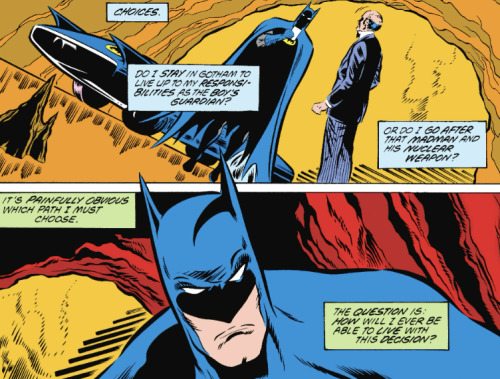
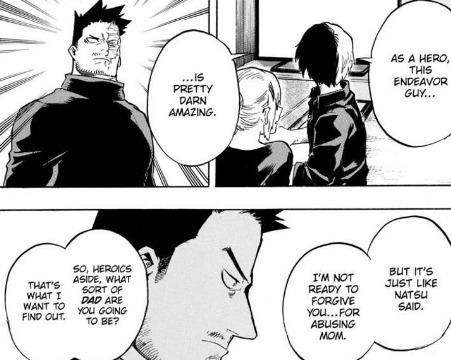
A parent is required to place their children above everything else, because they are the ones responsible for bringing that child into the world. Bruce Wayne made the decision to adopt Jason. Enji made the decision to have children, however with Enji you have the added insidious motivation of he only wanted to make designer babies and just didn't care for the ones who didn't turn out right.
Bruce attempts to do both, to act as a father for Jason and also a crime fighter as batman but he can't do both. This comes to a head in Death of the Family when Jason is having serious trouble because of his lack of a strong parental figure, and Bruce knowing that Jason is in trouble chooses still to go off and fight crime instead of staying with him. The choice to place crimefighting over the child they chose to take responsibility for has the unintended consequence of getting that child killed.
Whereas Enji makes the same choice over and over again, ignoring Toya's clear troubles at the fact his father no longer spends time with him and choosing to run away to the world of heroes because he doesn't want to face the fact that his actions are severely hurting his son. Bruce's motivations are more sympathetic admittedly he wasn't actively practicing eugenics, but the choice is the same and the consequences are the same.
Both Bruce and Enji are forced to bear witness to the deaths of their children when they are not there, specifically because they made a choice to be a hero instead of staying by their child's side. A situation directly caused by their choice to be a hero over a father, and a situation that would have been avoided if they had stayed with their child in their time of need. Jason runs off when Batman tells him to stay and gets kidnapped by the Joker, if Enji had been on Sekoto peak that day Toya would never have accidentally lost control of his fire.
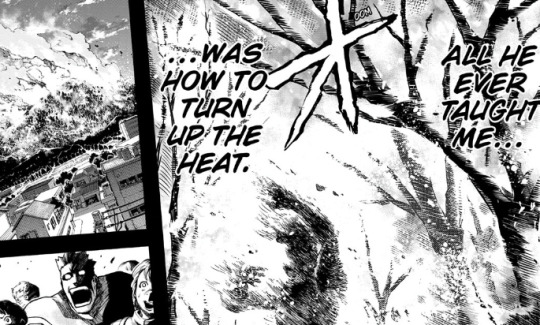
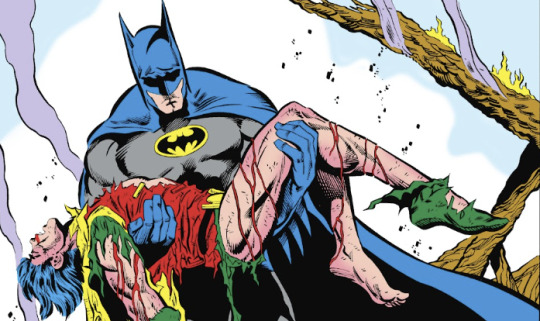
This is just the backstory however, the main event that kickstart this plot is the unexpected return from the dead of both Jason and Dabi. Each story follows the same plot beats. A new villain appears to challenge Endeavor / Batman. The villain reveals themselves as their dead son. Both Endeavor / Batman are given a chance to try reaching out to their sons, but they choose not to.
Then even though they are given a second chance with a miracle of a dead son coming back to them, they choose the exact same thing they chose before, being a hero and because of that the tragedy repeats itself. For both of them they are unable to save their son again, and the son goes through a second death. History repeats itself, the lesson isn't learned.
Their fatal flaw is their guilt. This is a story about grief and mourning after all, a son who is died, buried, but never grieved properly, never mourned, an open wound on the father suddenly coming back. The inability of each to process their grief blinds them from seeing the fact the son has come back, and they have a second chance.
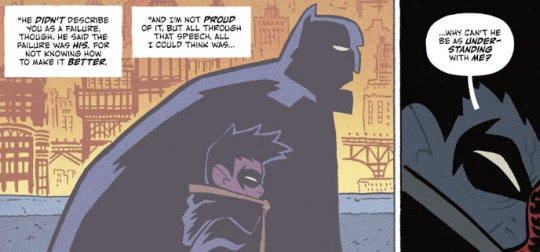
Toya has internalized he is a failure, because Enji literally called him that. Jason believes that Batman thinks he is a failure. In both cases the father is the one who failed, Bruce at least acknowledges this but cannot communicate it in any way shape or form.
This guilt and responsibility both Enji and Bruce feel causes them to self-sabotage. They no longer have the confidence they are in the right (they no longer feel like heroes because they have failed to be heroes to their own son).
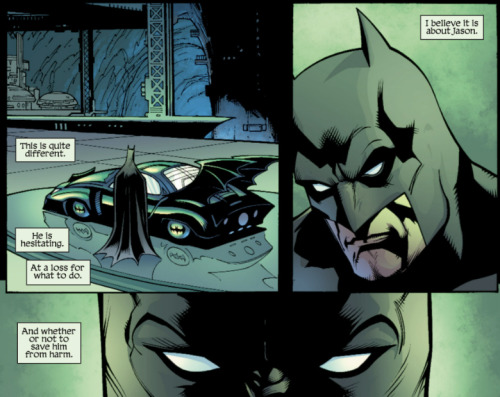
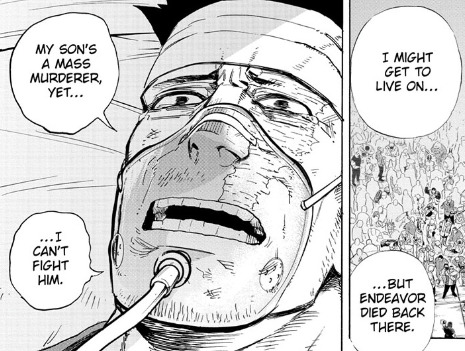
You can also add the layer of complication that since both men chose to be heroes in the past, they do not know how to handle the situation as a father now that they're being challenged to step up as one. Unfortunately, they are not the fathers that stepped up.
The reason their grief becomes a flaw is because they put their grief over their victims. . Each man is aware too much of their own failure, and while they should feel guilty they make the classic mistake of placing their own guilt over the feelings of the victim. The guilt they feel for causing the death and the genuine grief of losing a son is given priority over Jason and Dabi who you know... actually died.
An overwhelming grief and guilt is understandable because grief is a messy and human emotion, losing a child is an unimaginable tragedy that should never be inflicted on anyone.
Yet at the same time both Dabi and Jason are grieving to. This paradox that Batman only thinks of his own grief at losing a son and never stops to think about how Jason must feel leads to one of the best lines in Under the Red Hood.
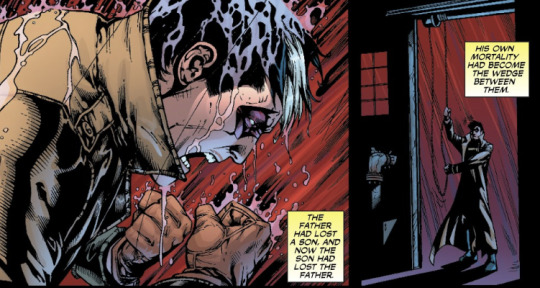
"The father had lost a son, and now the son had lost a father."
Batman's guilt is so strong over being the cause of Jason's suffering, that the suffering of the victim himself is ignored. To be fair to My Hero Academia, the Todorokis say a similar line to Enji.
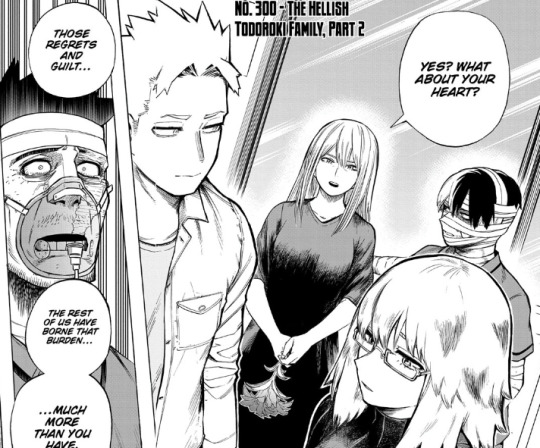
However, this is where I begin to get into the difference between ideas and execution. Tragedies are stories of actions and logical consequences, every action has an equal and opposite reaction in Under the Red Hood. Batman is punished for the choices he makes, the choices he doesn't make, and the choices he fails to make in time.
The Todoroki plotline features almost none of its character making any choices of substance, and because of that the plotline says the right things over and over again, but it all comes off as tell don't show.
I'm going to quote @codenamesazanka's post right here a couple of times because they describe the complete failure of the Todoroki plotline to show us a reason why we should be feeling things for the characters artfully.
We've heard Enji say this before - I'm sorry, I intend to atone. It's indeed the right thing to say, it's exactly what he should be saying and acting. Natsuo is declaring no contact - That's fine, I'm sorry, I accept this as part of my atonement and will continue. Touya calls him a coward - That's fine, I'm sorry, I accept this as part of my atonement and will continue. The public hates him - That's fine, I'm sorry, I accept this as part of my atonement and will continue. But you can only hear this so many times before you want to snap and beat the character, the story, the writing over the head with Enji's wheelchair. Why is that? He's behaving exactly as he should, and yet...
The reason why it fails to evoke strong feelings is because of what we'd called "narrative dissonance." The actions of Bruce and Enji are the same, they both neglect to do anything, make any real attempts to reach out to their victims because they're paralyzed by guilt.
However, we are told that they have entirely different arcs. Bruce's arc is a tragic fall. He's failing as a hero. While we are being told that Enji is experiencing an arc of atonement. Enji is supposed to be improving himself, and Bruce is supposed to be experiencing negative character development but they both do the exact same thing in story. Bruce neglects Jason, we are told by the story, by the characters in the story that Bruce is failing Jason. Enji does nothing in time to actually atone for Toya or try to help him, yet, we are told again, and again, and again, and again, and again, and again that Enji is atoning with nothing substantive to show us this is the case.
To show what I meant instead of telling this scene is in chapter 252.
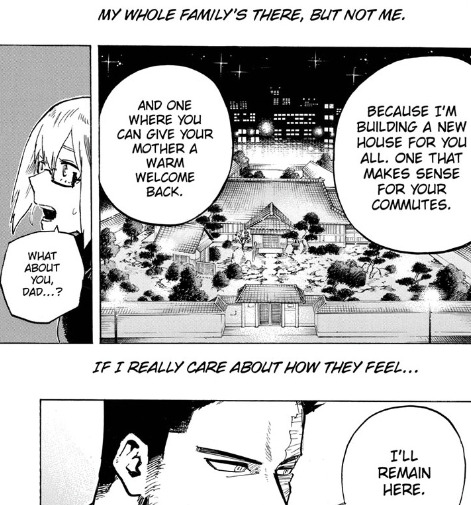
This scene is the ending point in chapter in chapter #426.
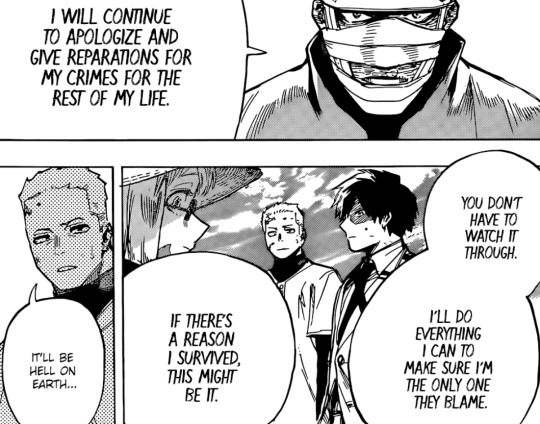
It's just him repeating the exact same sentiment and yet in a more than 150+ chapter gap, Enji never made any action to show he was now placing his family first. Enji didn't say anything to Dabi when he revealed himself as Toya. Enji didn't look for Toya in the months before the final war arc. Enji literally appeared on live TV in a broadcast that Toya was watching and said the very selfish "Watch Me" atone for the crime of creating Toya instead of literally talking about Toya or too Toya. Well, that would have rocked the boat too much... THAT IS LITERALLY THE POINT. Enji had to somehow break from tradition or make some significant sacrifice onscreen to his social standing to show that he's willing to put his family first. Enji decides to go along with Hawks decision to not face Toya head on, making the decision to be the hero for the final time which directly causes Toya to get up after Shoto brings him down non-lethally and make one last attempt to suicide bomb for his father's inaction.
Bruce does nothing for a long time in Under the Red Hood. He ignores his initial instinct that Jason came back and instead makes a long investigation on whether or not someone can come back from the dead in order to distract himself. When Jason takes the mask off, Batman already knew but was pretending otherwise because he didn't want to face the reality.
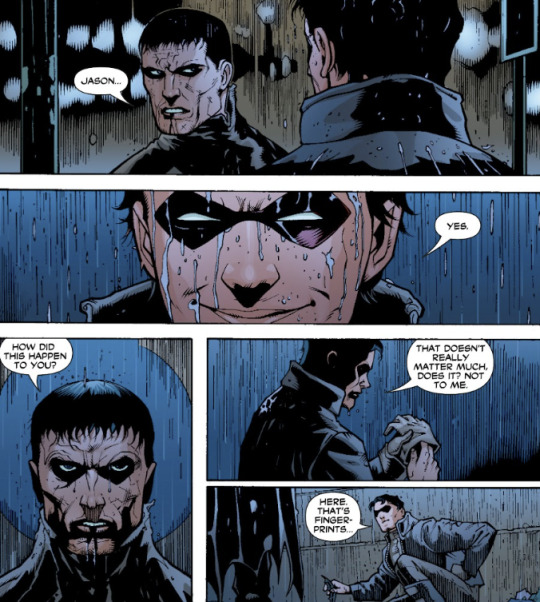
Even when Jason takes his mask off, Bruce still takes on the "I need to investigate this" angle even though Jason calls him out that deep down he already knows it's the truth. This of course foreshadows Bruce's underlying flaw, he doesn't want to face Jason head on because he feels too much grief about what happened to Jason and his guilt is more important than Jason's own grief. Just as the father has lost the son, the son has lost the father.
What follows is several chapters of Batman fighting crime as usual and making no attempts to directly search for Jason. They cross paths a few times but when they do Bruce doesn't follow. In fact, Bruce only shows up when Jason sends Bruce a sample of the joker's hair and Bruce knows that the Joker has kidnapped him out of Arkham. Bruce almost lets Jason get killed by Black Mask because he doesn't know whether to stop Jason or save him yet again, and then they have their final showdown where Jason has kidnapped the joker to demand Bruce kill him, and Bruce finally attempts to talk him down.
Out of context it sounds like I'm describing the same plotline, to the point where if you haven't read either, it looks like I'm complaining baselessly. Why is one hero doing nothing until it's too late good, and the other bad? The difference is of course context, or rather framing. Bruce's actions are called out by the people around him (Dick, Jason, Alfred) as him handling the situation wrong. Whereas both Enji's internal monologue and other characters say that he is doing his best to atone for his actions and deserves a chance, but the events we are shown in story are the exact opposite.
Here's another example to SHOW my point. Here's Dabi with my special, hardcover edition of under the Red Hood.
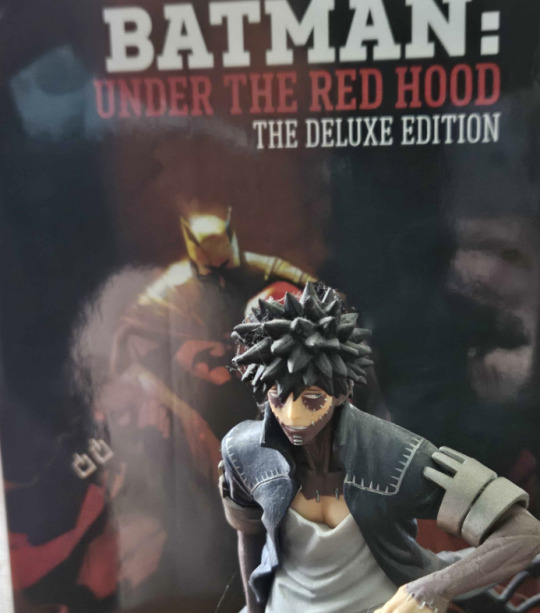
I reread the entirety of the fourteen chapter plotline and the majority of internal narrations come from characters outside of Bruce observing his behavior and commenting on how differently he's acting. Jason's backstory for instance is told by Alfred, not Bruce. Dick Grayson the first Robin comments on Batman's odd behavior. The rest are the third person narrator. Bruce has four instances of internal monologues spanning a few pages each in a 378 page story. (Alfred has the most internal monologues and he's presented as a more trustworthy unbiased narrator than Bruce, to get us to question Bruce's actions).
"Information travels on many routes, sometimes it comes predictably like the tides. You just need to know where to stand and meet it. Other times it's elusive and you have to root through the garbage to find it. In the last few years I've come to rely on Barbara Gordon, Oracle, we all did. Utilizing every form of surveillance equipment she has been the eyes and ear [...] but those days are over. I can't rely on anyone anymore. [...] and tonight it's also about the company I keep. It's different with him [night wing] out here. I think about when he was younger, when I was younger, it was different, simpler and I miss it. I miss those days, for that it's hard to be around him.
This first internal monologue is a case of unreliable narrator, because as soon as finishing it Dick Grayson / Nightwing shows up, offers Batman his help and while Bruce at first refuses it the two of them are forced to work together to fight Amazo. What does this show us? Bruce is not alone, but Bruce actively acts like he's alone ignoring the feelings of the other people around him. It exhibits a flaw of Bruce and the bad headspace he is in mentally (if I remember correctly Stephanie Brown recently died in the comics while this storyline was being published. It establishes Bruce's improper coping mechanism with grief, and how he is going about it the incorrect way.
Bruce says I work alone, and then Bruce says it's easier working with Dick, I miss it, but I can't go back to those days. It's bruce's contradictory thinking patterns in the same chapter that stop him. it's bruce's fault he cannot connect to Dick, and he is actively mourning the past because his relationship with Dick has changed.
Now the final part of the monologue in that chapter.
He's quick. Not just fast, agile. He's not thinking about his next move, he's just making it. He's been trained well. And there's something about him. Something familiar. There was something interesting about before he cut the line, before it had been taught. That had to have been practiced. Either that or just plain dumb luck. No it's not luck.
This is the first hint that Bruce already suspects it's Jason from early on but is in denial about it. This unreliable narrator trope also gives an agency to Bruce's decision, he is actively choosing to ignore the possibility that it's Jason because it doesn't want it to be.
Whereas, a lot of Endeavor's plot takes away any agency from him. For example, he doesn't even know that Dabi is Toya, because if he had the sneaking suspicion and ignored it like Batman did that might have made him look bad. We can't have the main character in a tragedy looking bad now can we?
The second monologue is more denial.
That device is from Kord industries. I should know. Ordered it special from them. How can he have it? No more dead ends. No more questions. No more guessing. Tonight I find out what is passing for the truth.
Reading between the lines this is outright confirmation Batman already knows.
The third is a brief reflection in his feelings for Jason.
The armor has to be light enough to fit but strong enough to protect. But sometimes a great many times, it's not strong enough. It wans't strong enough for Barbara who has to fight from her chair. It wasn't strong enough for Stephanie, other dear soldier enough dear grave. And it wasn't enough for Jason. Willful Jason. Who ignored the danger. Who spat at risk. Who was never frightened enough. I've always wondered... always... was he scared at the end? Was he praying I'd come save him? And in those last moments when he knew that I wouldn't. Did he hate me for it?
This monologue directly shows without stating it outright, Bruce is prioritizing his feelings of grief and failure mixing them in with his genuine grief over the loss of a son. it's selfish of him, but grief is a selfish emotion.
Here's the thing Bruce is allowed to be selfish and to not have the correct reaction to his grief, because the whole story is centered on Bruce being unable to get his shit together in time, and this picture into his emotions is an explanation as to why. Bruce is afraid of being hated by Jason. Jason of course has every right to hate him for failing as a father, but still I think not wanting to be hated to a person you loved so much and feel genuinely sorry over what you let happen to them is an understandable reaction.
Meanwhile we have Enji saying repeatedly all the right things in his monologue, the selfless, I don't need to be forgiven, it's okay if they hate me, I just need to atone but he never actually does anything. There's no explanation for why he isn't doing anything either, so that narrative dissonance. We're shown why Bruce doesn't act in time, he's internally a mess to be frank. We are not shown why Enji doesn't act in time because his internal monologue tells us again and again he's committed to atoning and he understands what the right thing to do is.
As Codenamesanzanka says:
Enji is still saying all the right things, but the story isn't giving him the opportunity to actually do the right things. To have his new actions matter. I have no doubt about his sincerity in his mantra, but without the 'show', it's hollow. Similarly, "Let's talk" is actually kinda bullshit too, because it's so vague. This is less about Enji, and more about the writing, how it set up this scene. "Let's talk" or "I want to talk" or any of that variation is repeated 6 times, without anything more or specific added.
There's an excess of repetition of Enji saying he wants to atone, he's ready to atone, without any of that materializing in the story.
As @class1akids says in this reaction post:
It also feels also super-hollow to say he's sheltering the family from the fallout, after they've just talked about how Fuyumi lost her job (and got a new one through the connections she herself built). How is he going to do that?
The fourth because I don't want to write it down, it's just Batman monologueing on how his partnership with Jason is still good and explaining the technical details of his fight with count Vertigo. It's in chapter 10 if you must look it up.
So four monologues total. Two monologues establish indirectly that Batman knows that Red Hood is Jason and doesn't want to face him. The third monologue establishes why he doesn't want to face him, he's afraid of being hated. The monologue is in line with Bruce's actions in the story, Bruce investigates several ways of reviving from the dead instead of looking for Jason.
The character's reactions around Bruce are also talking about how he's not acting like himself. Especially Alfred's who speaks of Bruce's indecision, on whether to put a stop to or save Jason.
"It is curious. He is lost in thought. It is not like him to spend vast stretches of time immobile, where his mind is gripped in the solitary process of deduction. This is quite different. He is hesitating. At a loss for what to do. I believe it is about Jason. And whether or not to stop him or save him."
This is illustrated in two scenes later where Jason spends a long time simply watching when Jason is fighting enemies, first in a fight against Captain Nazi, and second Black Mask. Jason even gives a direct callout of that behavior.
Jason: What the hell took you so long? Couldn't decide if you wanted to let me live. Batman: Shut up and fight.
Observed by Alfred Bruce is completely stalling and can't choose, observed by Jason Bruce can't decide whether to let Jason live or not. Bruce hesitates twice. We know why. We see it in action. It's called out as flawed behavior.
Now let's cover all the tell that don't show that is Endeavor's many monologues.
Pro Hero Arc:
I have to safeguard the future for them. That's the job for whoever's on top. What about the lives I cut short? Just demanding forgiveness isn't enough, it's too late for that. At this point I need to atone there's no other route.
Hellish Todoroki Family 1:
I'm trying to make ammends going forward. It might be too late. but I fall asleep every night thinking about it. Lately it's been the same dream. The wife and the kids looking happy at the dinner table. But I'm never there with them. It might be too late but I fall asleep every night thinking about what I can do for my family. I wish you could be here too, Toya. It's always the same dream. My whole family's there but not me. If I really care how they feel [I'll remain here].
I'm not going to read 200 chapters so I'm just going to ballpark it based on memory. Here we go.
Dabi's Dance:
My eldest, Toya didn't harbor frost within him. He didn't have a way to overcome the inescapable downside of overheating but I nevertheless sought to raise the boy as a hero. [...] Because Toya had more potential than me I placed my ambitions on his shoulders. I thought it could be you. You could have been the one to reach my eternal goal. My frustration... My envy... The ugliness in my heart... you could have been the one to smash it all to dust.
Plot twist this is the only monologue I like. It's different from all the others, and it's the only one where Enji is being emotionally honest. He put the emotional burden of his own emotional insecurities on an eight year old child, and expected to live vicariously through him and when Toya failed to live up to those expectations he just abandoned him. It alligns what we have been shown so far, Enji is not acting like a reptentant man here who realizes the harm he's done to Toya and only thinks of Toya as an extension of himself and his own regrets.
The Fight Against AFO:
My mistakes took the form as Toya leading to many stolen futures. The past never dies. Rage, resentment and even penace wound together toward the future. And the future is a path for the young. A path with so many branching choices. That's why I must win this. [I'll keep paying my penance. I'll win today and keep my eyes on Toya.]
When Enji decides to double Suicide with Toya:
I take full responsibility. I swore to bear the burden and live my life atoning for it all. However, you've been watching me all this time. While I couldn't be there to watch you. You were someone I especially needed to do right by. No I can't let you meet your end alone, but I won't let anyone else get caught up in our tragedy.
Hellish Todoroki Family Final:
I came to talk about what's to come. I'm retiring as a hero. That was my initial plan even before the war started, but now I can't even walk on my own. The hero endeavor burned to death. Your flames were really stronger than mine. [...] You're right. You know everything about me, Toya. After all you were always watching me. And you wanted me to do the same for you, but I didn't. Not matter what anyone says your heat does come from my hellflame. From now on I'll come everyday, so let's talk. It's too late now, so let's talk. [...] You're free to hate me. Anything is fine really, so throw it all at me.
This one is spoken dialogue but it's still a four-page long monologue. Every one of Enji's monologues with one exceptionsays the same thing: I'm sorry, I'll spend the rest of my life atoning for my actions.
We're repeatedly told Enji is atoning but he acts like Batman. Then, his actions should be framed as Batman, not atoning but avoiding any responsibility.
As observed by Class1akids when we were discussing the update:
Everyone else faces an uphill struggle with their lives, but we should all feel sorry for Enji atoning and being in hell. I hate Hori's compulsion to over-write his abusers and over-explain their atonement. He does this with Bakugou too but with Enji it's more irritating. It was so much more enjoyable when he just wrote the thing but didn't point at them and say -> look, they are atoning. Aren't they soooo cool??
Enji's internal monologues and the other characters frame him as some sort of martyr, while on the other hand it's clear by both Batman's actions and Alfred's observations he's not acting like his usual self. In fact, this is an interpretation of Under the Red Hood that I love from the writers of the video game Arkham Knight that does a less tragic retelling of Under the Red Hood:
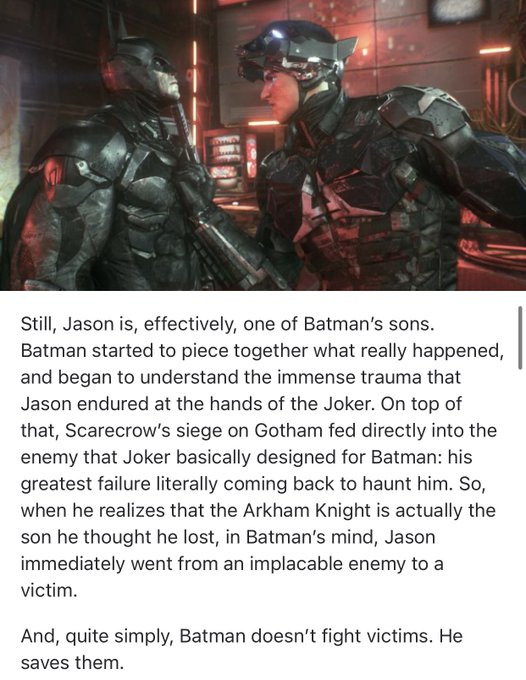
Batman doesn't fight victims. He saves them.
Therefore if Batman is fighting Jason, a victim, he's not acting like Batman. I'm also fine with Arkham Knight being an Under the Red Hood retelling because it's a different story. Comics do this all the time, different universe versions, popular storylines adapted into different mediums. It also works as a commentary on the original story, by showing what Batman could have done to lead to a more positive outcome it makes Batman's choices in Under the Red Hood worse and more tragic because he could have saved Jason, there was still a chance.
So here we have two flawed tragic heroes who are meant to be both pitied and condemned for their actions. One of them is all pity with no condemnation. The other is both pity and condemnation, Batman is grieving, but also he's failing his responsibility towards Jason. Therefore one protagonist works, the other fails utterly.
I'm not saying abusers don't deserve redemption. I'm not saying Enji should have died in order to atone. I'm not saying that the underlying problem with the arc is that they decided to make Enji sympathetic and a focus of the arc. The most important problem is the breaking of one of the fundamental rules of storytelling: Show, Don't Tell.
The Tragic Villain
Not only does The Hellish Todoroki Family plotline fail to make Enji a compelling protagonist, it also fails it's biggest victim. Now, these are both stories that end with the hero failing to save their victim. So if both of these stories have the same ending, why am I saying it failed Dabi, but not Jason?
Well, let me explain.
Dabi and Jason are both villains turned victims. The stories themselves are about this ambiguity. How much should the be held responsible for their own choices? If they are actively harming innocent people, then shouldn't they be stopped? Should they be automatically be forgiven just because of the pain and grief they've suffered, even if they've been causing it to others?
Both characters are also reflective of their fathers because they are too being selfish in their grief, they want their grief acknowledged and so are violently lashing out.
Jason and Dabi both make plays at being vigilantes at first, Dabi wants to inherit Stains will, and Jason Todd wants to be a better bat-man by taking control of the drug trade in Gotham and cutting crime down by executing gang heads. However, neither of them are being honest with this and it's shown through their actions, both of them abandon their original plans.
In the final showdown all Toya cares about is facing Enji on the battlefield, and when he's on the brink of death his mind erodes to the point where all he can do is scream for Enji's attention while his flames get hotter and hotter.
Let's take about Jason first and how his narrative treats him a whole lot better and more sympathetically, with more humanity than Batman. Jason is still held responsible for his choices, he is criticized by Bruce for murdering gang leaders and passing it off as justice. He's also blatantly shown to be a hypocrite. My favorite scene from Red Hood: Lost Days, the official UTRH prequel.
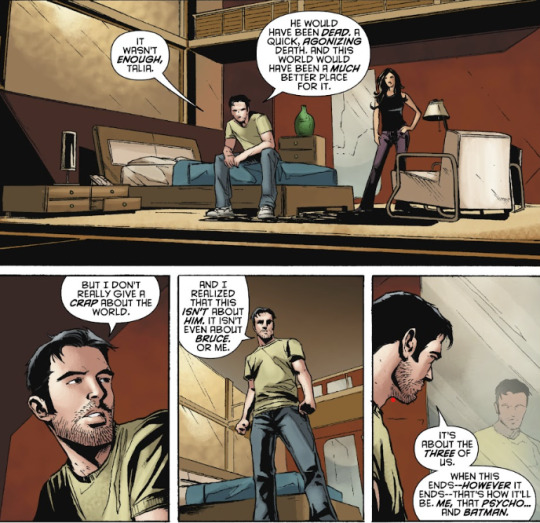
"I want to kill the joker in a cool way. Just sniping the Joker from a rooftop isn't dramatic enough for me."
This scene, and the final scene of UTRH underlines Jason isn't executing criminals because he believes it's the right thing to do, or because of his stated motivation that killing the joker would prevent more future victims.
Instead his every action is to set up a scenario where he makes a selfish demand of Bruce. He wants Bruce to prove to him that he would choose him over being a hero, by setting up his final scenario. Him, the Joker, and Batman. Jason will shoot the Joker. Bruce has a gun. He can either choose to let Jason kill the Joker, or kill Jason to stop him, either way it makes it clear what Bruce's priorities are.
The underlying reason for this is similiar to Bruce. Just like Bruce, Jason is deeply afraid that Batman doesn't love him. That he thinks of him as a failure. (This is Toya's main reason too).
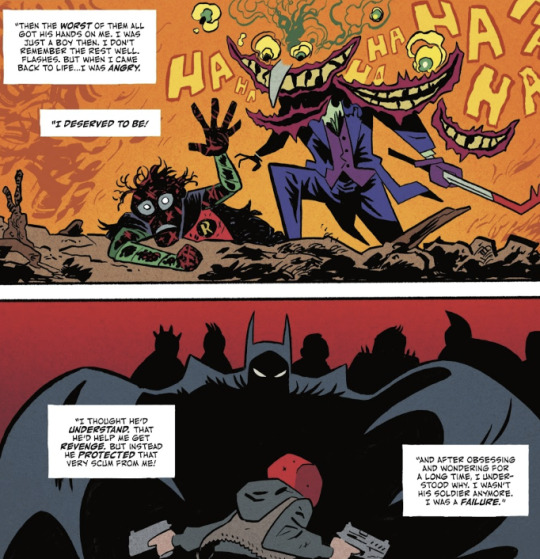
He also interprets Bruce's failure to avenge him to mean that Bruce didn't even care enough to mourn him. If Bruce loved him enough, he'd choose him over the joker, but he's so afraid that Bruce doesn't love him enough that he's going to force Bruce to choose.
Along the way he's also going to behead several crimelords in order to put an exclamation point on that point.
The way Jason completely unravels in the confrontation shows this insecurity, he begins with monologueing about how batman should totally kill people, until his fear that he wasn't important enough, and his grief at losing his father is revealed.
Batman: I know I failed you, but I tried to save you. I'm trying to save you now. Jason: Is that what what you think this is about? Your letting me die. I don't know what clouds your judgement worse, your guilt or your antiquated sense of morality. Bruce, I forgive you for not saving me. Jason: But why on god's green earth is he still alive? Ignoring what he's done in the past. Blindly, stupidly disregarding the whole graveyards he's filled with people. The friend's he's killed. I thought killing me - that I'd be the last person you ever let him hurt. Jason: If it had been you that he beat to a bloody mess. If it had been you he left in agony. If he had taken you from this world. I would have done nothing but search the planet for this pathetic pile of evil, this death worshipping garbage, and sent him off to hell.
Direct statement, it's irresponsible of Bruce to let Joker live after killing Jason and should have put him down to prevent future victims. Reading between the lines, Batman not taking revenge for Jason is a sign that he didn't love him enough, Jason loves Batman more because he would have taken revenge.
As the confrontation continues and Jason's mental spiral worsens, to the point where he can't keep up his pretense of self-righteousness.
Jason: I'm not talking about killing cobblepot, or scarecrow, or riddled, or dent. Jason: I'm talking about him. Just him. And doing it because...he took me away from you.
The father had lost the son, and now the son had lost the father.
Jason's revenge is just a cover, for his grief at losing Bruce. I think this also shows a really positive aspect of Jason's character to humanize him instead of condemning him for his actions to ignore or even justify the suffering he endured: Jason really loves Bruce.
I mean how meaningful is the statement: "Bruce, I forgive you for not saving me."
Bruce has been afraid to hear the whole time that Jason hates him, that he won't forgive him, but Jason loves him deeply. In fact his love is almost equal to his rage because Jason is a deeply emotional person, and these little details make him human and not just like a plot obstacle that Bruce has to face. A metaphor for his past failures.
Dabi is drawn as a crying boy who wants comfort, Jason is shown to be a crying boy who wants comfort through both dialogue and action without us directly needing to be told. It's a heartbreaking line and doing it because he took me away from you and it lands perfectly because the narrative wants us to just look at Jason's grief. It doesn't add an asterisk* even though he was in pain, he's done unforgivable things that can't be justified to undercut Jason's suffering.
In fact that might be another underlying problem with The Hellish Todoroki Family, the narrative tries too hard to make you feel a certain way instead of just presenting things as they are to make you come to your own conclusion. UTRH doesn't support Jason's revenge based serial killing of villains. It doesn't say he's justified to cut off the heads of mobsters. However, it doesn't excessively state "Well, I'm really sorry what happened to you but what you've done can't be forgiven" so we don't have to challenge ourselves to feel too much empathy for Jason's suffering.
Meanwhile even when Toya tries to express his rightful anger and grief, we're always met with someone shutting him down and saying well yeah, but you're wrong, involving innocent people is unforgivable.
As said by @stillness-in-green in the replies to this post:
I think so much harm (in-universe, but the state of the Twitter fandom makes me think the messages are pretty toxic irl, too) comes out of portraying the Heroes as needing to weigh in on the *morality* of the Villains' actions before they gauge "saving" them, when that is not a thing that glorified cops have any business thinking they have the right to do. Demanding repentance before the rehab is so bizarre.
You can say someone's actions are wrong without using it as a factor to consider whether or not their suffering as a human being should be acknowledged, and like I said there's multiple instances of people just yelling at Toya how immoral he is instead of addressing the elephant in the room.
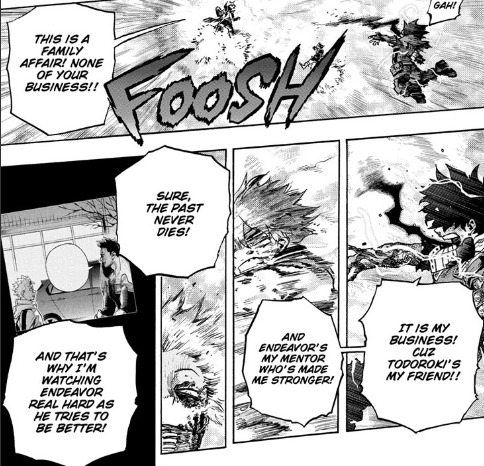
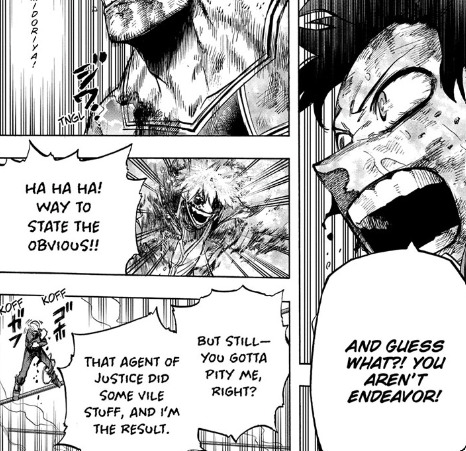
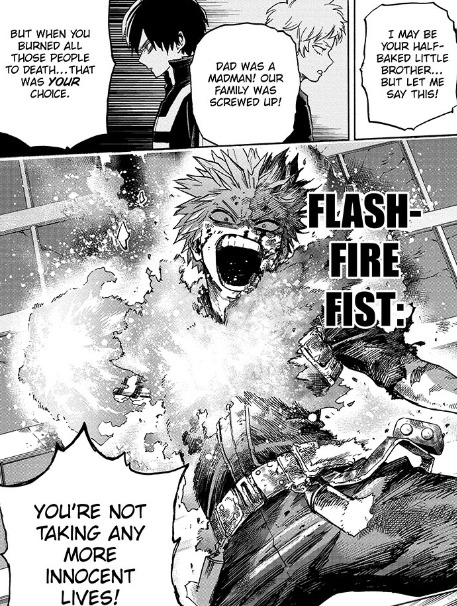
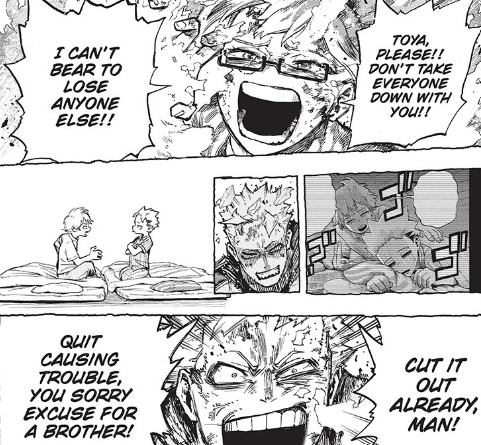
You're wrong, you're wrong, you're wrong, you're wrong.
(Okay, I understand that some people have interpreted this as a show of Honnae and Tatamae, the Todoroki's who are a very repressed household are finally talking about their feelings even if those feelings are selfish and ugly).
(I'm not criticizing Shoto for saying that the people he killed were his own choice necessarily, Shoto is a character who's actions need to be read more deeply than his words he was dedicated to bringing Dabi down without him burning himself any further start to finished. My criticism lies in the fact that Hori uses Shoto as a mouth piece because he thinks we need to be reminded that murder is bad).
However, even acknowledging that time and place man, time and place. They couldn't have done that in the aftermath, when Toya isn't burning to death?
Hey buddy, you're being selfish.
Toya: AHHHHHHHHHHHHHHH I'M MELTING, I'M MELTING.
This is I feel the underlying problem with the way the arc is written, not because the Todorokis are a very traditional Japanese family and there are cultural reasons they express their emotions differently, I'll give a caveat to that it's a nuance I might not understand.
However, I am arguing the actual problem is tell don't show. Horikoshi thinks that we as an audience need to be told multiple times that murder is bad, and we cannot be trusted to interpret that on our own.
Under the Red Hood shows both sides of Batman and Jason's debate, and let's us just come to the conclusion that Jason is in the wrong because revenge isn't justice. Horikoshi reaches no shit sherlock levels of telling us that we're not supposed to approve of Dabi's murders.
it's also a matter of giving Dabi narrative space to express his feelings, like every time Dabi tries to talk he is continually shut down (Shoto does engage Dabi talk to him and listen to why he didn't come back though I'll give him that) and it seems to be to push forward this weird idea that you shouldn't sympathize with the pain Dabi has endured or the ways he's dehumanized unless he does something to prove he deserves to be treated like a human being first.
Jason gets to monologue and make an entire argument, and his argument also shows the depths of his love for Bruce and what a deeply feeling person he is, and how those feelings being hurt and twisted could logically lead to his lashing out.
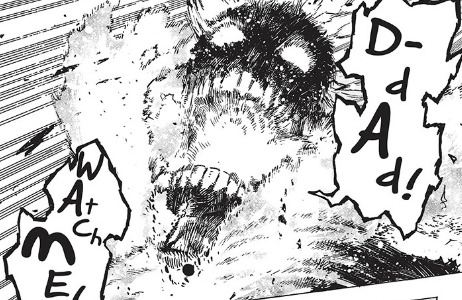
Compare this to Dabi who doesn't get a final monologue, but is instead reduced to a completely mindless state where he just cries out for his dad's attention. He doesn't get to make his argument.
Jason and Dabi both choose to blow themselves up, but Jason gets enough character agency to show this is a deliberate choice he's making even if it's the wrong one. He retains his character agency and ability to make decisions until the end of the narrative.

Jason's also you know physically crying. The end result of the narrative is about wrong choices that both Bruce and Jason make together, and then suffer the consequences together. Bruce watches the same failure play out again and he isn't able to save Jason, Jason doesn't get what he wants, he doesn't get revenge and he doesn't get to reunite with his father. It's tragic for both of them, and brought about by decisions both of them made.
Whereas yes Dabi makes a lot of bad decisions leading up to the last war arc, but in the end his final fate is up to a choice Enji made to not face Toya in the final battle.
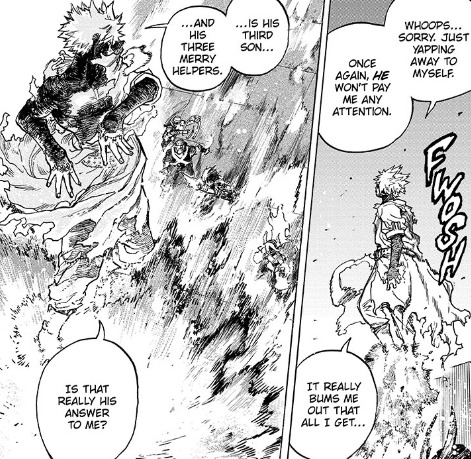
However, while the final consequence of the battle is brought about more by Enji's decisions than Toya's, it's Toya who endures all the suffering and punishment. It's Toya who is in an iron coffin, and doomed to slowly and agonizingly die with all of his skin burnt off unable to move. Toya doesn't even get agency after the arc is over. Enji still has a wheelchair, Enji can still move around, Enji's still fucking rich, he's not in prison for his actions, he as Rei wheeling him around.
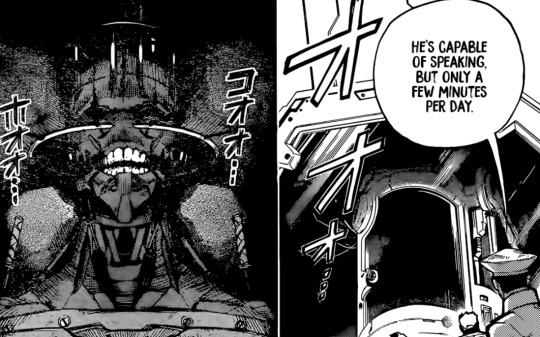
Toya's agency and choices are all taken from him, presumably to serve the plot purpose of making Enji save him to finish off his arc, and then ENJI DOESN'T EVEN SAVE HIM.
Also I think it's important to mention, Bruce's tragic ending is brought about by him attempting to save both, trying to save the joker and Jason with the same action. Whereas Enji's tragic ending is brought about by Enji NOT LIFTING A FUCKING FINGER TO HELP. Yet, it's Dabi who has the lion's share of suffering, and is sentenced to this horrific state of being skinless in an iron coffin and only being able to be awake a few minutes a day with no choice but to waste away.
Bruce is also immediately called out for his actions, by the Joker of all people, you handled this all wrong, it's your fault. Bruce is right to not kill the joker, killing the Joker would not have solved any of Jason's problems, but the fact that he put off facing Jason for so long, and his inability to communicate that he loves Jason is what leads to Jason thinking that the only way to prove Bruce loves him is to force him to choose. It's because Bruce has utterly failed to show him in any other way that he is loved.
Joker: Oh my god, I love it! You manage to find a way to win, and everyone still loses. I'm going to be the one who gets what he wants tonight, badda bing, badda boom."
I'd also like to add that a lot of agency in Enji's actions are taken away too, to make him look more blameless. It's not Enji's fault that he didn't say anything to Dabi during Dabi's dance, he passed out because he had a punctured lung. It's not Enji's fault that he spent a month protecting Deku instead of searching for Toya, he had to protect innocent people. It's not Enji's fault that he didn't go immediately to face Toya in the final war arc Hawks told him not to.
It's not Enji's fault that he made Shoto and Toya fight like Pokemon instead of cleaning up his own mess, and also he feels really sorry for it and as soon as he's done punching the bad guy he'll look after Toya he promises.
Enji does get called out for this behavior but it falls flat because it only comes from the villain AFO, and Toya himself. As I stated above too, the ending is more influenced by Enji's actions not Toya's (because Toya's agency is stripped away until he's mindless) but Toya is the one who has to die while Enji gets to live and atone.
That is the real sticking point for The Hellish Todoroki Family, the way it ends.
Themes Are For Eight Graders
The underlying problem with the whole arc and why The Hellish Todoroki Family fails as a tragedy, is because it wasn't written to be a tragedy.
The above quote is from an interview with the writers of the widely hated Game of Thrones Season 8, which took a sudden tragic turn for Dany's character, gave her an incredibly dehumanizing ending of being put down like a rabid dog by her own lover, an ending that was neither foreshadowed nor did it match with anything written before.
In this meta here by @hamliet it goes far more into depth that Game of Thrones isn't a tragedy, but a piece of Romantic fiction (not a love story, Romanticism is a genre of big emotions, the beauty of life, larger than life ideas hence why it fits well with fantasy genre, it can be sad but it doesn't follow tragic structure).
Dany is a romantic heroine, a deconstruction of the idea of the classic warrior princess trope, and you know a colonizer, but she's not meant to be written as an inherently bad person. There are people who say that Dany was going to die in the original books. I'm one of those people. Me. However, context and framing matters, Dany for all her colonizing ways does genuinely want to do the right thing, so it's likely she'd die a heroic death as a reflection of her selfless intentions (and intentions do matter for fictional characters) whereas in the show she's put down as a villain.
Now watch me I'm going to coin a term for future literary critics to use: Narrative Gaslighting.
Narrative gaslighting is different then Show Don't Tell, where an author has just failed to properly show what they're trying to tell you in the story. Narrative Gaslighting is when a narrative deliberately tries to mislead you, straight up lies to you, or just insists things that did not happen totally happened guys. Much like real gaslighting, Narrative Gaslighting makes you feel stupid for interpreting things a certain way and insists you were wrong all along.
Narrative gaslighting is when Tyrian gives a speech that everyone should have suspected Dany when she burned slavers alive that she was secretly evil and would one day turn on them.
Like, no.
Dany is flawed because she is a foreigner, interfering with the politics of a different country that she does not understand in order to gain enough resources and men to return to her home country and invade that country to exercise her right as a Targeryn to uphold the divine right of kings.
Game of Thrones doesn't mention any of that shit that's in alignment with the previous actions in the story, it's just insisting the very ableist notion that Dany was insane all along and her violence towards other people is the result of her mental illness.
(Also before anyone says, so if she's a colonizer than how can she have good intentions, everyone is Bad in Game of Thrones, they're all waging war to vie for a throne, monarchy is bad guys. IDK how to tell you that Game of Thrones has gray on gray on gray on gray morality).
(Also this aside ties into the hangup of MHA and most popular fandom culture on Twitter, that Dany's moral failings somehow disqualify her from her humanity. In spite of the fact that on top of all of that she's a rape victim, and like, Dany's only on that continent in the first place because she was sold as a bride.)
But here's the same weird subtext that Horikoshi's writing of Dabi. The fact that Dabi was continually victimized and denied human dignity does not need to be addressed, because he did the bad things and didn't atone properly enough for it first.
In essence this random post on the gunnerkrigg court forums I found on the same day the chapter came out, displaying apollo's gift of prophecy.
"When someone is persecuted, it's important to inform everyone about their flaws. That way you don't have to feel anything about all the times that they were denied human dignity."
So, Dany is not written as a tragic hero but a romantic one, we as an audience are both meant to acknowledge her flaws and sympathize with her, not demonize her in an ableist way for being insane, and even if Dany is meant to die the tragic way she dies does not match up with all of the narrative foreshadowing that was built before that.
Like, for instance a lot of POC after the show ended kept telling everyone that Dany's actions in a foreign country were seriously problematic, and not only did the audience not listen but the showwiters didn't acknowledge it with the same subtlety as the books. So those people especially were able to pick up Dany's character flaws, and when the show finally acknowledged them it's not even in the way that critiques of the show were pointing out Dany's flaws it was just "she was insane all along." Not like taking time to go "no matter what the intention, interfering with the politics of a foreign country is wrong."
The problem with the Todoroki arc is essentially the same, down to the ableism (because outsiders continually call Dabi either a maniac or insane Demon without even giving credence to his grievances about hero society he's just reduced to an insane fringe element of society, and Dabi himself is reduced to a completely mindless, childish, insane screaming state where he can't make active decisions).
The Todoroki Arc is not set up to us as a tragic one. The ending is pretty clearly telegraphed to the whole audience. People are not wrong for thinking that Toya's ending would be either rehabilitation like Rei with the eventual hope of being welcomed home, or some kind of house arrest where he still gets to be with his family.
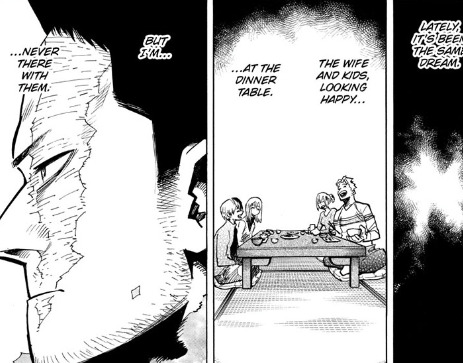
Everyone happy at the Dinner table and Enji not sitting with them.
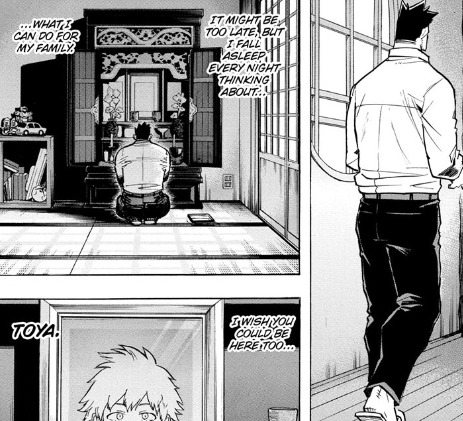
"I wish you could be here, Toya."
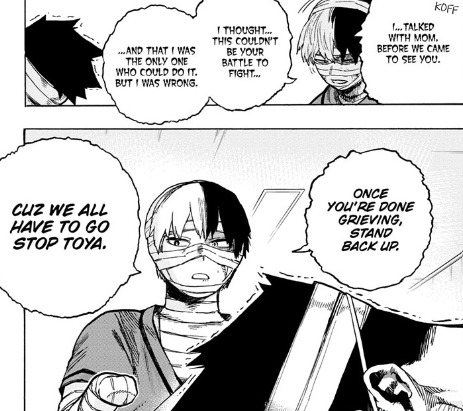
"We all have to go stop, Toya."
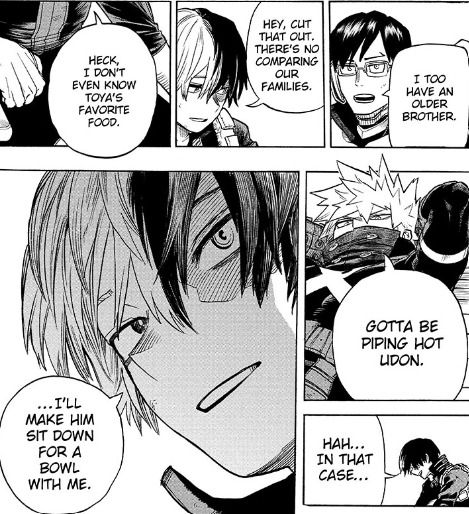
"In that case, I'll make him sit down for a bowl with me."
Even Shoto's efforts to take down Toya non-lethally are rendered completely pointless, because Toya gets back up again and then burns himself alive (completely by his own choice so no one has to feel bad that they failed).
The story sets up the expectation that Toya is going to be brought home and sit down for a meal with his family. Then it makes you feel stupid for going in an entirely different direction. It was always going to end this way didn't you know The Todorokis are a tragedy?
Well, I just spent a very long section of this thesis statement illustrating that if it's supposed to be a tragedy, then it's still not written well.
It's a written as a romantic story of a family healing, and the villain getting saved, only for the villain not to be saved and the story to just keep on going like not getting saved isn't a huge failure. This is something that should permanently destroy the main characters, that they got the chance to repeat Sekoto peak and be there this time and they all utterly failed. I feel bad for Shoto most of all because he did everything right, and he still loses his brother, but does the story show that?
The problem is the story is blatantly lying to you about the fact that Toya was somehow saved, even though he LITERALLY LOOKS LIKE HELLRAISER. To quote Codenamesanzanka again:
But I feel the story couldn't give us that because it will remind the reader and everyone just how much Touya will be missing. In-story, talking any more will overburden Touya's heart - and how apt is that metaphor? So let's talk about how we'll talk, but that's all that's allowed here for this scene. Else we'll see how unfair it is that Touya has to be confined to this room, he isn't with his family and they have to come to this prison just to tell him about their day, and soon he will be gone. Details make it real, and it would've exposed the lie that Touya was saved in an actual way. The story knows it too - "this extra time Shouto gave us." This is all 'extra', and not the core. [...] If the story was sincere that this is a case of "it's simply too late" - as it should be!!! imo, to really drive in the clear point that they failed, they did not get the save they wanted, because that's the truth - the tone of the chapter isn't tragic enough for that. The tone is going for 'Making Peace With This'. We've skipped the stages of grief and all we have is acceptance. The characters have accepted this, and so must the readers as well.
Therefore it's narrative gaslighting, the story is making us doubt our perceptions and trying instead to manipulate us to feel a certain way. We don't have to question the unfairness of Toya's fate, because look at all the people he's hurt, and look how Enji is atoning and taking responsibility.
The story builds up the idea that Enji will choose Toya. That he will choose being a father over being a hero. Enji doesn't do that, and it's Toya who suffers the horrific, painful consequences while Enji gets off mostly scott free. Mind you it's also ableist to suggest that being in a wheelchair is some sort of life-ending consequence like he's fine. The story even goes out of its way to say how avoidable this ending could have been if Enji or Rei or someone lifted a single finger to give Toya the acknowledgement he wanted, and then gives it a "Too little, Too Late" conclusion but doesn't acknowledge that this is where it's ending and instead tells us that Enji has successfully atoned.
"Everyone's watching me. So this is what it's like. If it was such a simple thing, then why not sooner?"
If it was going to turn out this way Toya should have just died here, not because death would somehow be a mercy compared to life in prison, but because the Todoroki Family doesn't deserve to get to pat themselves on the back. If they let Sekoto Peak happen a second time, then they should have to deal with the consequences of that.
It would be consistent is my point. This is written as a "Too Little, Too Late" kind of ending, but we don't get the emotional response from the Todorokis that they've let Toya die a second time.
On the other hand, UTRH has the exact same tragic ending but it doesn't make me angry because it's honest about it. The Todorokis let Sekoto peak happen a second time. Batman let Death in the Family happen a second time, but look at how even the narration and comic panels of the story acknowledge it.
"Fate is a funny thing. It swells up like a raging current and we are forced to travel. It provides us no exit. No deviation. It drops us in a bottomless ocean and compels us. We either swim, or drown, and sometimes as we struggle against the tide, a great truth arises."
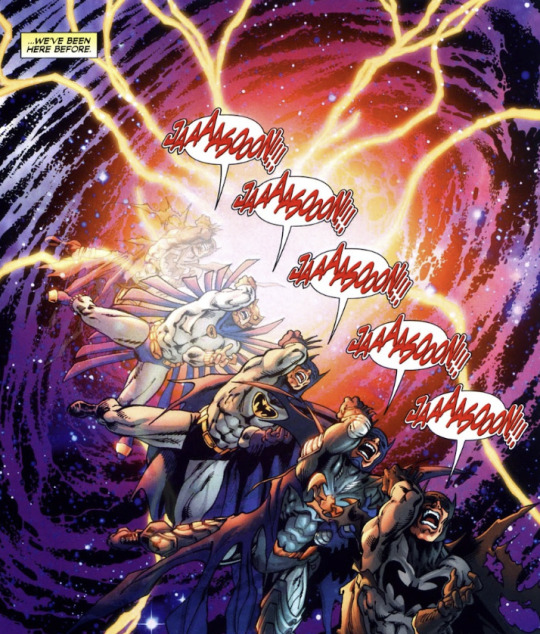
One ends with Enji meaninglessly stating that he'll spend the rest of his life atoning for Toya and watching over him (which I guess will be like two months tops) for the fifth time. The other ends with Batman being lectured by the Joker of all people of how he chose wrong and being forced to watch once again as a warehouse blows up, and he's completely helpless to save Jason.
UTRH ends with the message that Batman sucks, Enji's atonement arc ends with Natsuo calling him cool for atoning and UTRH makes me like Batman way more as a character. Whereas at this point I feel nothing from the Todoroki Family, except for a disgust for the way that Toya not only has to die, but has to die a slow, gruesome death while the rest of his family walks away with the small comfort of "oh at least we'll get to say what we need to say before Toya passes."
Especially with the fact that Toya's greatest fear was that when he died, he died meaninglessly because his family never grieved him and all moved on with their life. I guess we don't have to analyze how gross the underlying message that criminals don't deserve to be sympathized with because themes are for eighth graders.
EPILOGUE
The post is finished but apparently everyone expects me to cover every single possible angle even in posts this long.
You didn't address the cultural aspect. Under the Red Hood is a western story, and Todoroki Family is based on eastern concepts.
The post isn't about that. The post is long enough I can't cover every single topic. Here's someone who covered that topic thoroughly. This one discusses more about the nuances of collectivism.
Also, since the Todoroki Family obviously copied Under the Red Hood's homework, it warrants a comparison. Especially since it seems to critically misunderstand what made the original work.
Which is a valid form of Literary Criticism, as Ursula K Le Guinn once said:
It doesn’t occur to the novice that a genre is a genre because it has a field and focus of its own; its appropriate and particular tools, rules, and techniques for handling the material; its traditions; and its experienced, appreciative readers—that it is, in fact, a literature. Ignoring all this, our novice is just about to reinvent the wheel, the space ship, the space alien, and the mad scientist, with cries of innocent wonder. The cries will not be echoed by the readers. Readers familiar with that genre have met the space ship, the alien, and the mad scientist before. They know more about them than the writer does.
The Todorkis aren't all to blame for Toya. Natsu, Fuyumi and Shoto are innocent:
You're right. It's just easier to refer them as the Todorokis then specifying "Enji and Rei" each time.
You didn't mention Shoto once in this post:
I have no cricism for Shoto's role in all this. In fact I think he's the best written part. I praise it here.
Shoto is a good boy, and he deserved to spend more time with his brother. The fact he won't be able to sit down and have dinner of him, is the greatest tragedy of them all.
#mha meta#mha spoilers#mha 426#mha 426 spoilers#shoto todoroki#dabi#toya todoroki#enji todoroki#under the red hood#jason todd#bruce wayne#batman#mha critical#todoroki family
577 notes
·
View notes
Text
UNVEILING LOVE — uchiha clan ft. sasuke, itachi, shisui, madara, obito [imagine]

context: how would the uchiha men realize their feelings and confess to you? based on “why do you make me feel like this?"
warnings: au. fluff. gn! reader. slight ooc?
notes: this has been sitting in the dust for a while, thank sensen for this idea and motivating me. not my art above.
tags: only for @seneon <3

SASUKE UCHIHA — ❝ THE LAST UCHIHA ❞

Sasuke wouldn’t initially understand his feelings for you, unsure of how they differed from those of a friend to a potential lover. Knowing Sasuke, he wouldn’t confess to you due to his past mistakes and doubts about whether he could give you what you want. But that would soon change once he returned to the village and saw you hanging out with a random guy who kept making you laugh at a vendor shop. When you noticed your teammate returning, you waved at him, not realizing the glare he was directing at your friend. Before you could get a word out, Sasuke gently grabbed your arm and pulled you away, making you follow him out of the store without a chance to say goodbye. He kept walking silently until you were alone in a random alleyway, hidden from prying eyes.
“Hey! Sasuke, what was that about? Is everything okay?”
"Who was that?" he asked, his eyes focused on your delicate features that he had grown to admire. You tilted your head, confused by his question.
"Huh? Oh, you mean Lino! He’s just a friend I've been visiting," you said, not noticing how your comment made him feel a bit jealous. Sasuke kept quiet, pondering whether he should say anything or continue to avoid his feelings for you. He wondered if you truly liked him the way he liked you, fearing the possibility of rejection.
Your eyes grew concerned as you watched the stoic male avoid eye contact. “I hope you know that I… I missed you,” you confessed, shyly looking to the side as his head shot up, eyes slightly widened. “I’m just glad you’re back now, even if it's only for a little bit. I’m happy you’re okay.”
Your heart suddenly raced faster than you could maintain as the stoic male grabbed your hand, holding it lightly before gripping it firmly with warmth. You glanced up, your face warming from the contact as you witnessed a small smile appear on his face. You had always had a crush on Sasuke since you became teammates on Team 7 with Naruto and Sakura, but you always hid your feelings deep down. You doubted that you would ever have a chance with Sasuke Uchiha.
"I’m glad you missed me… 'cause I’ve missed you too," he confessed, pulling you closer as you listened intently. "I… I didn’t understand this feeling, wondering what made me feel this way until I realized it was you."
You held your breath, nothing around you capturing your attention except the male in front of you.
“I thought about you the whole time I was away,” Sasuke sighed, gathering the courage to speak his feelings. “I realized that I’ve liked you for quite some time.”
Surprise consumed you, eyes wide open at the confession. You never expected this, especially from Sasuke, who usually wasn’t the type to express his feelings. But here you were, discovering that Sasuke Uchiha liked you, apparently for a long time now. Your heart swelled as a large smile spread across your lips, gripping his hand more tightly than before. Sasuke felt all the tension loosen from his shoulders as his admiration for you grew stronger from your words.
“I've always liked you, Sasuke, for years. And I will continue to do so as long as I’m by your side.”
ITACHI UCHIHA — ❝ ITACHI OF THE SHARINGAN ❞

Itachi found himself in a rare moment of contemplation, leaning against the sturdy trunk of a cherry blossom tree. He allowed his thoughts to drift to a singular figure that seemed to occupy every corner of his mind: you. Closing his eyes, Itachi attempted to unravel the enigma of his feelings. When had he fallen in love with you? The question lingered in his mind like a persistent shadow.
He recalled the first time he met you, your bright eyes reflecting curiosity and kindness, a stark contrast to the darkness that often enveloped his world. At that moment, something stirred within him, a whisper of possibility that he dared not acknowledge, frustrating his inner being with the thoughts. As time passed, your presence became a constant in his life, weaving its way into the fabric of his existence. Like music to his ears, your laughter echoed in his memories, warming even the coldest corners of his heart. Your unwavering support during challenging missions, and your gentle encouragement in moments of doubt—each interaction etched itself into his soul, leaving an indelible mark.
It was difficult for him to accept a different form of love to enter his complicated heart.
Now, under the cascading petals of the cherry blossom tree, the realization hit him with a gale force. His chest tightened, and he opened his eyes, staring at the soft pink petals fluttering around him, their beauty a stark reminder of his vulnerability. He took a deep breath, feeling the weight of his emotions settle within him.
"Why do you make me feel like this?" he muttered to himself, the question laden with confusion and a touch of exasperation.
Just then, he heard footsteps approaching. He turned his head and saw you walking towards him, your presence immediately calming the storm of his thoughts. You smiled, and he felt the familiar warmth spread through him, a warmth that he now recognized as love.
"Itachi, are you alright?" you asked, concerned.
He hesitated, his usual stoic demeanor cracking under the intensity of his feelings. For a moment, he considered staying silent, keeping his turmoil hidden. But then he realized he couldn't continue like this, trapped in his own emotions.
"It’s you," he said quietly, his voice steady despite the turmoil inside. "You make me feel like this." Your eyes widened slightly, surprise and curiosity flickering across your face. "What do you mean?"
He took a step closer, his gaze never leaving yours. "Every time I see you and hear your voice, I feel something I can't ignore anymore. It’s confusing and frustrating, but I can't deny it any longer. I... I love you."
The words hung in the air between you, a confession that felt both liberating and terrifying. Itachi's heart raced as he awaited your response, hoping that the feelings he'd kept hidden for so long would not be met with rejection.
You blinked, absorbing his words, and then a soft smile spread across your face. "Itachi," you said gently, taking his rough hands into your own. "I love you too."
Relief washed over him, and for the first time in a long while, he allowed himself to truly smile. The complicated emotions that had plagued him began to untangle, replaced by a sense of peace he hadn't known was possible. At that moment, under the cherry blossom tree, Itachi Uchiha found solace in your embrace, knowing that he no longer had to face his feelings alone. With gentle tenderness, he leaned forward and planted a soft kiss on your forehead, a silent affirmation of his love and gratitude.
SHISUI UCHIHA — ❝ THE BODY FLICKER ❞

The sound of clashing kunai echoed through the training grounds as you and Shisui sparred under the burning sun. Shisui's movements, usually swift and precise, seemed distracted today, his mind elsewhere. You noticed his unfocused gaze and slower reactions, wondering what could be bothering him. As you circled each other, you saw another opening and took it, landing a solid hit to his head. Shisui stumbled back, rubbing the spot where you had struck him, his expression a mix of pain and embarrassment.
"What’s wrong with you today?" you demanded, frustration clear in your tone. "You're not paying attention and using your full potential."
Shisui sighed, lowering his eyes to the ground. "I'm sorry," he muttered, avoiding your gaze. "I know I should be doing better."
Your annoyance faded slightly as you watched him. Shisui Uchiha, one of the most talented shinobi in the village, was never one to slack off during training. Something had to be seriously bothering him.
"Well, what's going on?" you asked, softer this time. "You can tell me."
Shisui hesitated, his mind racing. He had been overthinking his feelings for you for days, his thoughts a tangled mess of confusion and longing. He hadn't meant to let it affect his training, but being so close to you, yet unable to express how he felt, was driving him to lose focus.
"I... it's just..." he began, struggling to find the right words. "I've been thinking a lot lately, about... things." You raised an eyebrow, waiting for him to continue. "Things? What things?"
He took a deep breath, his heart pounding in his chest. "About you," he blurted out before he could stop himself. "I couldn’t understand why I was feeling this way until I realized that I… I like you!"
The silence that followed was deafening. Shisui's eyes widened as he realized what he had just confessed, his face turning crimson. He hadn't meant to say it, especially not like this.
Your eyes widened in surprise, taken aback by his sudden admission. "Shisui..."
"I-I'm sorry," he stammered, backing away slightly. "I didn't mean to... I mean, I did, but not like this. I just..."
You stepped forward, placing a hand on his shoulder. "Shisui, it's okay," you said gently, a smile tugging at your lips. "You don't have to apologize.”
Shisui stood up from the ground, wiping off any dirt as he avoided eye contact, his face still flushed with embarrassment. "I thought you knew," he murmured. "I don’t even use my Sharingan and barely put any power into my movements during our training sessions..."
"I just thought you were going easy on me," you admitted, rubbing the back of your head and feeling a bit foolish for not realizing the obvious signs. However, a warmth spread through you at his vulnerability, and a glowing grin appeared on your lips. "Well, for the record, I like you too."
The relief that washed over Shisui's face was palpable, his tense shoulders relaxing as he let out a breath he hadn't realized he was holding. "Well, of course, you fell for my charms. How could you not?" he teased, a playful smile breaking through his worried expression.
You chuckled and shoved a hand against his shoulder. "Don’t get too ahead of yourself now. How about we continue sparring? But this time, I expect you to give it your all if you want to win over my heart fully."
Shisui grinned, feeling the weight of his unspoken feelings finally lifts. "Oh, you've got yourself a bet."
As you resumed your positions, you both couldn't shake the feeling that the sparring match had taken on a new, deeper significance. At that moment, under the fading light of the day, you both understood that this was the start of something special. The connection between you had deepened, turning a simple sparring match into a cherished memory. After the match (Shisui won), you sat together, hands linked, feeling a sense of peace and happiness, knowing that you had found something truly wonderful with each other.
MADARA UCHIHA — ❝ GHOST OF THE UCHIHA ❞

Madara Uchiha, a man known for his iron will and unyielding resolve, found himself ensnared in an internal struggle that defied his every attempt at control. His feelings for you had become a thorn in his side, a relentless source of annoyance that he couldn’t simply brush away. In an attempt to cope, he had begun to distance himself from you, hoping that the space would extinguish the unwanted emotions. However, it only served to exacerbate the situation. You noticed his sudden coldness, the way he avoided your presence and cut conversations short. Hurt and frustrated, you decided to confront him. You found him in a secluded courtyard, his back turned as he stared out at the night sky, lost in thought.
“Madara,” you called out, your voice firm. “We need to talk.”
He didn’t turn, his silence only fueling your frustration. You walked closer, refusing to be ignored. “Why have you been avoiding me? What did I do?”
“It’s nothing,” he replied tersely, still not facing you.
“It’s not nothing!” you snapped, moving to stand in front of him, forcing him to meet your eyes. “Tell me what’s going on!”
His jaw tightened, and you could see the storm brewing behind his dark eyes. “Just leave it alone,” he said, standing up from his spot to walk away.
“No,” you insisted, stepping into his path. “I won’t leave it alone. You owe me an explanation.”
The tension between you reached a breaking point. Madara’s frustration finally erupted. With a swift motion, he punched the wall beside him, cracks radiating out from the impact of his chakra. Despite the sudden action, you remained unflinching, eyes locked on his as you had anticipated this eruption from the stubborn Uchiha.
“Why do you have this effect on me?” he shouted, his voice a mixture of anger and desperation. “Why can’t I stop thinking about you? It’s infuriating!”
Your breath caught in your throat, but you pressed on, your voice softer now. “Why didn’t you just tell me?” you asked. “Why push me away?”
“Because I’m in love with you!” he roared, the confession tearing out of him. “And I hate it! I hate that I can’t control it, that you make me feel this way!”
The raw intensity of his words hung in the air, his chest heaving from the outburst. You stepped closer, reaching out to gently touch his arm. “Madara,” you said softly, “you don’t have to fight it. I love you too.”
His eyes softened, the storm within them calming. Vulnerability seeped through his usually stoic facade as he looked at you. “You... do?”
“Yes,” you replied, your voice steady and sincere. “From the moment we met after the war, I knew I did.”
For a moment, silence enveloped them, allowing his words to sink in. Then, slowly, he pulled you into his arms, holding you tightly as if afraid you might slip away. “I’ve been a fool,” he murmured against your hair, the tension in his body easing. “I should have told you sooner.”
You wrapped your arms around him, feeling the solidity of his presence. “We’ll figure it out together,” you whispered.
In that embrace, the world seemed to shrink until it was just the two of you. Madara finally allowed himself to let go of the control he had clung to so fiercely. The future might still be uncertain, but with you by his side, he knew he could face whatever came next.
OBITO UCHIHA — ❝ THE MASKED MAN ❞

In the hidden depths of Obito Uchiha's heart, emotions swirled like a tumultuous storm, leaving him lost in a haze of confusion. Amidst the chaos of his thoughts, he struggled to decipher the true nature of his feelings for you. He watched you from afar, his heart yearning for something more, yet fearing the consequences of exposing his true emotions to the light. Each friendly gesture and shared moment deepened his uncertainty, leaving him adrift in a sea of conflicting emotions.
Day after day, he found himself drawn to you like a moth to a flame, captivated by your smile, your laughter, your mere presence. Yet, beneath the surface of his admiration, a seed of jealousy lay dormant, gnawing at his soul whenever he saw you with another man. He attempted to suppress the pang of envy that pierced his heart whenever he witnessed you in someone else's company, but the feeling only intensified with each passing day. The mere thought of someone else holding your attention, of another person eliciting the smiles he longed to see from you, was unbearable to him.
Then, one fateful day, his worst fears materialized as he stumbled upon you in the village, your laughter intertwined with that of another man's. A surge of jealousy engulfed him, threatening to consume him whole as he watched the scene unfold before his eyes, witnessing a random leaf ninja bid farewell to you.
Unable to contain his emotions any longer, the words spilled from Obito's lips in a rush of desperation and longing. "I can't stand seeing you with him!" he blurted out, his voice laced with bitterness.
You turned to face him, surprise flickering in your eyes at his outburst and undetected presence. "Obito, what are you talking about?"
Obito took a shaky breath, his heart pounding, struggling to find the right words. "I–I'm sorry. It's just... I've been confused about my feelings for you and the way you affect my entire being. And then seeing you with him... it hurts."
A heavy silence settled between them, the weight of his confession hanging in the air like a shroud. And then, to his surprise, you reached out and took his hand in yours, your touch sending a jolt of warmth through his veins. "Obito… Say it, please."
He sighed, feeling the weight of his emotions pressing down upon him like a suffocating blanket, his face burning from your intense look. “I know we're friends, and I value that more than anything, but I believe there's something more between us. And it's driving me insane because I… I cherish you deeply!”
Awaiting the sudden rejection, to his shock, you placed his hand against your cheek, your face nuzzling against his warmed palms as you graced him with the same sweet smile he had grown to love dearly.
“I've always loved you, Obito, ever since we became classmates in the academy. I knew that the boy who declared himself to be the next Hokage with those big goggles on his face was truly someone I would always admire.”
His heart skipped a beat at your words, a rush of euphoria flooding his senses as he realized how long you had waited for him. He couldn't believe his luck and fathom that the person he had been pining for felt the same way about him for so long. And as you leaned in closer, your lips brushing against his in a tender kiss, Obito felt as though he were floating on air. In that moment, amidst the chaos of his emotions, he found a sense of clarity and peace, knowing that he had finally found the person who would stand by his side through thick and thin.

© 𝐭𝐨𝐣𝐢𝐥𝐮𝐯 𝟐𝟎𝟐𝟒
#🔮 oryluv#❥ — ❝ tojiluv ❞#❥ — ❝ tojiluv ❞ naruto series#naruto masterlist#naruto series#sasuke uchiha#sasuke uchiha x you#sasuke x you#itachi uchiha#itachi uchiha x reader#itachi x you#shisui uchiha#shisui uchiha x reader#shisui x you#madara uchiha#madara uchiha x reader#madara x you#obito uchiha#obito uchiha x reader#obito x you#uchiha clan#sasuke fluff#itachi fluff#shisui fluff#madara fluff#obito fluff#naruto fanfiction#naruto shippuden#naruto imagines#alternative universe
1K notes
·
View notes
Text
Princess(NSFW)
Yandere!Kurapika x Chubby!Fem!Reader
!!REBLOGS APPRECIATED!!
warnings: nsfw, breeding, yandere behavior, Kurapika is enamored with you, reader’s body is made fun of(not by Kurapika), violence, death
A/N: the food throwing scene is based on something that happened to me in school LOL
HXH Yandere NSFW: @lightshowerrr @jungtoast @nenggie @aliceattheart @atransmuter @sweetmiri

He can’t get enough of you, really. From the moment he met you, Kurapika was immediately pulled in by your sweet voice and soft frame.
Everything from your cute chubby cheeks to your pretty plump lips had his heart racing.
Of course, Kurapika wasn’t the type to talk for looks alone. You were more kind and patient than he thought possible, always there for him when he needed support or comfort, and never getting upset when he would leave for unspecified periods of time.
You were always so understanding, so sweet and unapologetically you. A ray of sunshine was the only way he could describe you. Even the cloudiest days couldn’t dull your shine.
To him, you were an angel, his princess. Anything you asked for, he would hand deliver if it meant you would give him that pretty smile of yours.
He just adored you endlessly, nothing made him more happy than being by your side.
Kurapika, however, was unfortunately quite shy. It’s not that he didn’t want to share his feelings with you, he just… was afraid of rejection. So, while on missions or away from you, he would stare at your picture, sighing as he dreamed of a life where the two of you could be together.
It wasn’t long before his little crush started to grow into something more… obsessive. After all, the two of you were close, were you not? When he would announce he was coming to visit, you would drop all other plans so you’d be available for him. That meant something, right?
So today, as he took you shopping, Kurapika decided it was about time to tell you how he really felt.
“How does this look?”
You walked out of the changing room in a tight miniskirt and a sweater, making Kurapika glad he wore his loose fitted tabard today.
You plump tummy and soft thighs made his dick twitch, and he cleared his throat as he crossed his legs, his cheeks red. “Y-you look great, (Name).”
Once you changed, he added the clothes to the steadily growing pile of things he wanted to buy you. Kurapika couldn’t help it, you just looked amazing in everything you put on.
Kurapika paid for your clothes before taking his hand in yours. “How about some ice cream? It’s pretty warm out.”
“Ooo, that sounds really yummy-“
The two paused when they heard someone muffling their laugh nearby. Kurapika eyes narrowed before cutting to the left.
“Pfft! Are you sure she needs ice cream?”
You shrunk into yourself as a group of girls and their boyfriends laughed to themselves. Kurapika hated this, he hated seeing you try to hide yourself due to the rude comments of others. You never had anything bad to say about another person, so why were you the one always being insulted and belittled?
“Come on, there’s no need to listen to the words of those with an ugly heart.”
He attempted to guide you away, only for you to yelp when a piece of food was thrown at you.
“There, fatty. If you’re so hungry, eat that.”
Kurapika stood completely still, his eyes on the stain now on your sweater. It had been a gift from him, a soft pink cashmere sweater that you loved.
“K-Kurapika, let’s just go…”
After being friends with Kurapika for a long time, you knew that the scarlet hue taking over his eyes meant trouble in this context. You tried to fight back the tears of humiliation and hurt to prevent Kurapika from going on a rampage.
“I-I’m okay, we can just wash my sweater later. Let’s go to m-my apartment…”
He let out a shaky breath, glaring daggers at the group before gently squeezing your hand. “Alright, angel. Let’s go.”
You sighed in relief, unaware that the quick glance Kurapika made was enough to pick up on several things to later identify the group of people.
They wore jackets with a local college’s symbol, and a few of them still had their part time job uniforms on. ‘Not only are they scum, they’re stupid too. It won’t take much to destroy their lives, and they handed me their information on a silver platter.’
But he wasn’t focused on that now. Kurapika instead shifted his attention to you. Just like you knew when he was about to snap, he knew when you were about to break.
“(Name)… you don’t have to keep up a brave face. What those people said was rude and uncalled for.”
He brought his hand to your face, gently wiping away the stray tears that fell down your soft chubby cheeks. “I’m sorry, (Name). Today was supposed to be a fun day out. Now it’s ruined…”
“It’s not your fault…” you said softly, leaning into his touch. “I was… getting tired anyways. We can hang out at my apartment for a bit instead, eat some snacks and watch a movie.”
Kurapika smiled, his eyes softening as he gave your cheek a light squeeze. “That sounds lovely. I much prefer time spent alone with you to days out anyways.”
————————
Kurapika was currently trying his best not to get hard as (Name) snuggled up with him on the couch, your head resting on his chest.
It wasn’t easy being in love with (Name) and not knowing if you felt the same. You were so sweet and affectionate, always wanting to be held and cared for, but he wasn’t sure if you wanted this attention from him alone, or if you were just this way with everyone.
“Kurapika, kisses…”
His head felt fuzzy and he could hardly move without the bulge forming in his pants throbbing, but Kurapika leaned down and peppered kisses on your cheeks and forehead. “Are you feeling any better now?”
You smiled, your chubby cheeks warm as you leaned into his snuggles. “Yeah… I feel very warm and happy right now.”
He traced circles into the soft flesh of your belly, nuzzling his face against your neck. “That’s a relief. I never want to see you upset, (Name).”
His warm breath fanned against your neck, his lips grazing your jaw. It made you feel funny, and your squirming didn’t escape his watch.
“Everything alright?” he asked, his voice soft… but with a husky edge. Kurapika traced circles into your thigh with the tip of his fingers.
You shivered, and that caught his attention. His eyes lit up before he smirked, gently groping your fat thigh. “Come on, if something’s wrong you should tell me, sweetheart…”
“Mmph… feels weird, Pika… when you get this close I feel all warm and fuzzy…”
He felt something warm spreading through his body, and when he began to subconsciously guide your hips over the bulge in his pants, the two of you both moaned in unison.
Kurapika was quick to slip your skirt up, his hand groping your soft, fleshy ass. Your panties were soaked, he could see the wet spot spreading as his fingers lightly ran over your clothed clit.
Every soft whine and whimper that left your plump lips had his cock twitching, begging for release. He wanted you to know how much he desired you, how badly he needed to be inside your pretty, fat pussy.
Although all he wanted to do was slip your panties to the side and fuck you right there, Kurapika was in love with you. He didn’t want his first time with you to be quick and fueled by lust.
So he scooped you up, much to your chagrin. You whined and complained, but he shut you up with a kiss to your forehead.
“Holding you in my arms is the highest honor. (Name)… I adore you. Don’t you ever forget that.”
He laid you down on your bed, pinning your wrists above you head before kissing down your neck. “I want you…”
Your little plea for him made him bite back a groan. He could tell that you were getting restless by the way your hips bucked into his. You… wanted him.
“You already have me…” he murmured, your panties being tugged down with one hand while his lips met yours. “My body, heart, and soul, it all belongs to you. It has since the moment we met.”
The two of you shared a kiss as his tip pressed into you. He held onto your hand, letting you squeeze it as he entered you for the first time.
He was in heaven, nothing had ever given him so much pleasure before. Kurapika bit on his lip, trying not to cum on the spot.
“God, (Name)…”
He pulled back his hips and pushed back in, shuddering I’m ecstasy.
“P-Pika…”
He blinked, the fog of pleasure clearing from his mind. Tears were pouring down your burning cheeks, and he could see a bit of blood dripping from your warm cunt.
He was your first.
“F-fuck, (Name)..!”
Kurapika panicked, instantly leaning forward to check you over. You were sniffling, clutching onto his shirt tightly.
“J-just hurts a little… my first time…” you managed to get out through your sniffles.
Soft, sweet kisses were placed all over your face, and he nuzzled your cheek. “I’m so sorry, princess. I…”
You leaned into his kisses, nuzzling him back. “It’s okay… I know you’d never hurt me on purpose…”
The two of you lay there, connected in the most intimate way while you shared kisses and soft words of love. It was enough to make you blush, seeing how much he wanted you, how much he needed you.
The pain ebbed away into pleasure, and soon enough you were moving your hips, your eyes growing hazy. “M-mmm… can you..?”
“Y-yeah…”
He was panting too, hips stuttering as he tried his best to hold back for you. If anyone on this planet loved you, it was Kurapika.
The second his cock pulled out and fully sunk into you again, you both let out a breathy moan. It’s like the two of you were in sync.
He buried his face into your neck as his hips rutted into yours, only the sounds of skin agaisnt skin and whines of pleasure could be heard in that dark room.
“I love you… god, I love you so much (Name)…”
The next day, dark hickeys would litter your neck, but tonight it looked so tender and pure… he had to cover it in his marks so everyone would know you were taken.
Each bite, each suck had you crying out, pain mixing with pleasure. His grip on your hips was like iron, keeping you in place so he could pound into your pussy until you saw stars.
Sometimes you forgot just how strong he was. Kurapika had always been gentle with you, never in a million would he ever think of hurting you on purpose, but tonight he left unintentional bruises everywhere he touched you.
He just had to have you as close as possible, your bodies pressed against each other so closely that you could feel his heart beat against your breast.
All he could think of was cumming inside of you, the thought of your belly heavy and swollen with his young flooding his mind.
And by the end of the night, he was curled up around you, his finger tracing circles over your belly. Both of you were exhausted, but happy.
“I love you too, Kurapika…” you whispered, resting your head on his chest as you drifted off.
His fingers gently played with your hair as he lost himself in thought. If he wanted you to be happy and safe… he would have to get his hands dirty.
Kurapika never wanted you to be sad again… and he had an idea on how to help.
——————
The sound of something big being dragged across the floor could be heard, along with a wet THWACK!
“P-please! We’re sorry, we d-didn’t know she was important to you! Just let us go!”
Kurapika dragged a man by the hair and threw him against the wall, his form slumping before falling on top of the various other bodies that were piling up.
“Let you go? No… I couldn’t risk that. How do I know you wouldn’t just find another person to take out all of your anger on?”
Kurapika held up a piece of paper, waving it in the man’s face. “Your mother abandoned you when you were just a child, and now you take out your mommy issues on women that look like her.”
The picture revealed a plump woman in her thirties that had the same body type as you.
He tilted his head towards a girl that was tied up, her head still fuzzy from being drugged. “Does your girlfriend over there know you’re a serial killer? You spend your days harassing random women on the street, then bring women that look like your mother home to torture them before they’re slaughtered.”
Kurapika stabbed the man through the leg, causing screams to tear through the cool night air. “You’ve gotten off easy for domestic abuse charges because your father is on the police force… but I’m not sure daddy can save you now.”
He stepped on the man’s face, taking a drag off of a cigarette. You hated him smoking, but right now he needed it. “I was going to just beat the shit out of you until you got the message… but seems like letting you back on the streets is just going to put my princess in danger.”
After putting the cigarette out on the man’s eye and listening to him scream, Kurapika brought down his foot again and again until all that was left was a bloody mush.
By then, the woman had begun waking up, and screamed. “N-no, don’t hurt me!”
The blonde turned, blood splattered across his face. “Wasn’t really planning on it.”
He pulled out a gun and shot her, then sighed. “See? An instant death.”
Fire spread across the area, the smell of burning skin and flesh alerting people nearby. Kurapika had already fled the scene, and was washing off at a hotel.
Killing wasn’t something he enjoyed… but if it was for you, he could do it. He never wanted you to be afraid or in danger, and anyone who made you cry was unforgivable.
You were sitting on the couch, watching a movie when he got home. It was late, but thankfully you were still up. After all that killing, he needed the comfort.
“Pika, you’re just in time! I just started this new movie, I heard it’s really good!”
He smiled, plopping down next to you and leaning his head in your shoulder. You smelt so good and your body was warm and inviting, he couldn’t hep but bring you close and bury his face into your neck.
“You know I would do anything for you, right (Name)?”
His scarlet eyes looked up at you, and for a moment… you were strangely uneasy. They seemed almost… crazed.
“W-what do you mean?”
But as quick as you spotted it, his eyes were back to normal. “Nothing, nothing.”
He pulled you into his lap, inhaling your scent. “What’s the movie about?”
You knew Kurapika had violent tendencies… but in your heart, you wanted to believe he was a good man, and would never hurt anyone. He was your lover, your best friend… but god did you worry about him.
As the two of you went to sleep that night, he held you as close as possible, his chin resting on the top of your head.
“I would kill for you, you know… and… maybe I already have.”
You weren’t sure why he said that all of a sudden, but he stayed completely calm, as if it was the most normal statement in the world.
“Kurapika… you don’t have to do that… please… don’t.”
You caressed his cheek, looking into his soft brown eyes… and decided to ignore his words.
“Goodnight, love.”
He stared at you for a moment, his eyes narrowing as he held your face in his hands. “(Name)…”
Before he could say anything else, he sighed and smiled fondly at you. “… goodnight.”
As you slept, a strange possessive feeling crept into his heart, and his grip tightened until you whimpered in his sleep.
He would kill for you, end anyone that tried to hurt you or take you away…
Kurapika kissed the top of your head and promised himself that he’d toss his morals aside if it meant keeping you safe.
Anything for you, his princess.
#yandere!kurapika#yandere kurapika#yandere hxh#yandere smut#yandere x you#yandere x reader#yandere imagines#yandere#requests open#x reader#anime x reader#reader insert#hxh x reader#hxh imagines#smut requests#hunter x hunter x reader#anime x chubby reader#chubby!reader#chubby reader#plus size reader#fem!reader#fem reader#female reader#kurapika smut#kurapika x reader#kurapika x y/n#kurapika x you#smut fanfiction#x reader smut
575 notes
·
View notes